 09/05/2010 12:17 09/05/2010 12:17 |
|
| | | OFFLINE | | Post: 20.138
Post: 2.778 | Registrato il: 28/08/2005
Registrato il: 20/01/2009 | Administratore | Utente Veteran | |
|


 See earlier entries for 5/8/10 on the preceding page.
See earlier entries for 5/8/10 on the preceding page.

 Text-the-Pope service
Text-the-Pope service
launched in Italy

ROME, May 7 (AFP) - Roman Catholics can may now send text messages of support to Pope Benedict XVI, Italian public television said Saturday.
The mobile phone service was launched by RAI television's Sunday weekly religious programme, A SUA IMMAGINE, ahead of a gathering organised by lay groups in Saint Peter's Square on May 16 to show support for the PonTiff.

All messages sent to the special number -- +39 335 18 63 091 -- will be passed along to the Pope by the end of May, the broadcaster said. They will be shown from Sunday during the television show "In His Image".
"It's a truly unique event, because with this number everyone can show their solidarity without being physically present in Saint Peter's Square," said Rosario Carello, the chief of the programme on the Rai Uno channel.
Today, besides its regular coverage of the noontime Angelus at St. Peter's Square, RAI-1 is also presenting a special program on the Pope's coming visit to Fatima.

The Roman Catholic church and the Pontiff himself are under fire after a series of revelations on sexual abuse by priests that have emerged over several months.
Pope Benedict on Saturday accepted the resignation of a German bishop who admitted he beat children in a Catholic orphanage and also faces a paedophilia probe, the Vatican said.
Walter Mixa, 69, was the bishop of Augsburg in southern Germany and of the German military, and tendered his resignation on Thursday from both posts after admitting to hitting children some 20 years ago.
Addendum:
The call for a May 16 rally at St. Peter's Square was launched on April 16, the Pope's burthday, by the Consulta Nationale delle Aggregazioni Laicali (National Council of Lay Organizations) working with the Italian bishops' conference,
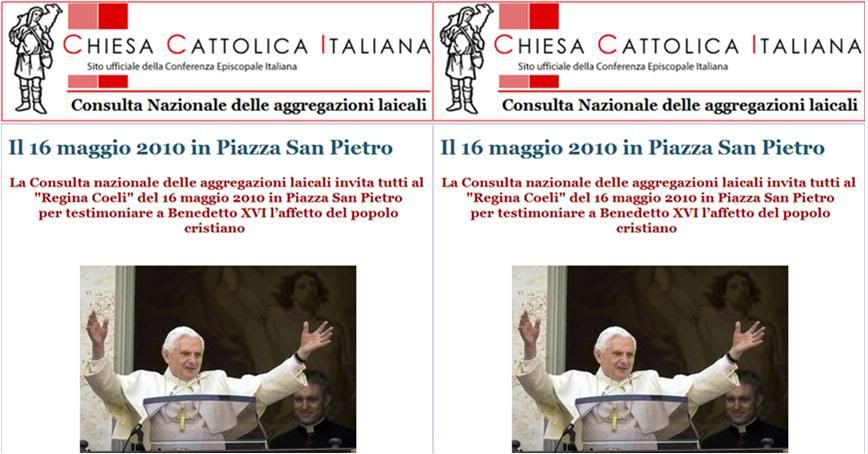
The call is being publicized by all the member lay organizations such as Italian Catholic Action.
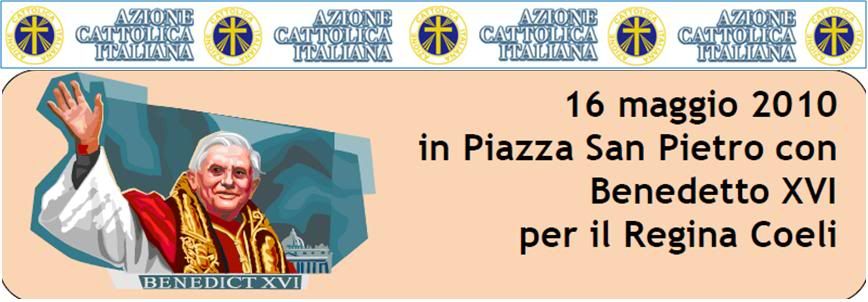
[Modificato da TERESA BENEDETTA 09/05/2010 12:19] |
| |
|
| |
 09/05/2010 16:18 09/05/2010 16:18 |
|
| | | OFFLINE | | Post: 20.139
Post: 2.779 | Registrato il: 28/08/2005
Registrato il: 20/01/2009 | Administratore | Utente Veteran | |
|
 Some Italian media reports already referred to the following story last week, but I put them aside, as they could have misquoted Schoenborn again, as they did last January, when one Italian newspaper apparently made up an interview with Schoenborn quoting him as virtually endorsing Medjugorje as an authentic phenomenon that the Church should recognize. Schoenborn's office immediately denied he had said that - although the statements the Cardinal has made about Medjugorje on other occasions certainly seem to amount to the same thing.
Some Italian media reports already referred to the following story last week, but I put them aside, as they could have misquoted Schoenborn again, as they did last January, when one Italian newspaper apparently made up an interview with Schoenborn quoting him as virtually endorsing Medjugorje as an authentic phenomenon that the Church should recognize. Schoenborn's office immediately denied he had said that - although the statements the Cardinal has made about Medjugorje on other occasions certainly seem to amount to the same thing.
Anyway, the Anglophone media have now latched on to Schoenborn's sanctimonious statements and are using it primarily to strengthen their working theorem that the Roman Curia is not just incompetent but also corrupt. But sharper minds in the Italian media look on it as yet another step by Schoenborn not so much to ingratiate himself with his predominantly liberal Catholic flock in Austria [as he seems to deludedly think it might], but as part of his media campaign to lay down now his 'open and liberal' credentials for the cardinals of the world to keep him in mind for the next Conclave. I tend to agree with this hypothesis, which I find just as tasteless as many of the actions by Schoenborn in the past two years! (He must not forget that in modern times, no cardinal who pushed himself too much with an eye to the next Conclave was ever elected Pope!)
Also, to 'urge reform in the Curia' by doing pointedly so in the media is certainly unworthy of someone everyone considers to be 'close to Benedict XVI", if only because he is the president of the Joseph Ratzinger/Benedict XVI Foundation to preserve and propagate Ratzinger's thought! First, it implies he doesn't think Benedict XVI is paying attention to such a reform - which is an insult to the Holy Father - so he has to make a hue and cry about it to get his attention; and second, because he recently met with the Pope at the Vatican - surely he could have expressed himself strongly about such a reform directly to the Pope! I almost find his tactics despicable.
Schönborn attacks Sodano
and urges reform in the Curia
by Christa Pongratz-Lippitt

8 May 2010
The head of the Austrian Church has launched an attack of one of the most senior cardinals in the Vatican, saying that Cardinal Angelo Sodano, dean of the College of Cardinals, “deeply wronged” the victims of sexual abuse by Catholic clergy when he dismissed media reports of the scandal.
In a meeting with editors of the main Austrian daily newspapers last week, Cardinal Christoph Schönborn, the Archbishop of Vienna, also said the Roman Curia was “urgently in need of reform”, and that lasting gay relationships deserved respect. He reiterated his view that the Church needs to reconsider its position on re-married divorcees.
On Easter Day, Cardinal Sodano called the mounting reports of clerical sex abuse “petty gossip”. This had “deeply wronged the victims”, Cardinal Schönborn said, and he recalled that it was Cardinal Sodano who had prevented Joseph Ratzinger, then a cardinal, from investigating allegations of abuse made against Cardinal Hans Hermann Groer, the previous Archbishop of Vienna, who resigned in disgrace in 1995.
[I cannot believe this! Schoenborn is deliberately pandering to the media by buying into their false and unjustified inflation of a term Cardinal Sodano used in the tribute to the Pope before the Easter Sunday Mass: the Italian word 'chiacchierare', which can be translated simply and generally as 'chatter', and pejoratively as 'gossip'.
Schoenborn and MSM, in going after Sodano for using the word, completely ignored that the Holy Father himself used the noun derivative of the same term in his Palm Sunday homily one week before Sodano used it. The Pope was speaking about the courage not to be intimidated by the 'chiacchiericcio delle opinioni dominanti' [translated officially by the Vatican as 'the gossip of prevalent opinions' - but in this case, the only sense could have been 'chatter', since opinion is not gossip!
In Sodano's case, he said it in this sentence (my translation): "Holy Father, with you are the People of God who do not allow themselves to be influenced by the idle chatter of the moment, nor by the trials that are meant to strike at the community of believers". Schoenborn knows Italian - did he check out the the Italian reports on Sodano's tribute, or did he simply see the media reports in German and perhaps English?
In fact, the Anglophone MSM did not initially zero in on Sodano's term until the following day when they sought to cite it alongside Fr. Cantalamessa's citation of a Jewish friend's statement in his Good Friday homily as examples of 'inflammatory language' from 'people around the Pope'.
But what is wrong with what Sodano said? One may surmise he used the term to distinguish 'idle chatter' which must be dismissed and not allowed to influence a right-thinking man, against 'hard facts' which a reasonable man should judge rationally.
Indeed, in an Easter Sunday editorial, L'Osservatore Romano denounced what it called the "vile defamation campaign" against the Pope - which is certainly an order of denunciatory magnitude far above 'idle chatter' or even 'gossip'!]
Cardinal Schönborn said that Pope Benedict was “gently” working on reforming the Curia but he had the whole world on his desk, as the cardinal put it, and his way of working and his style of communication did not make it easy to advise him quickly from outside. [That is plain BS, and deliberately damning with mild praise! What's to stop MSM now from saying, "Oh look, if even someone as close to him as Schoenborn says this, then he really is isolated in his ivory tower!", which is one of their favorite myths about Benedict XVI!] Cardinal Schönborn studied under Joseph Ratzinger at Regensburg University and is known to be close to him.
Questioned on the Church’s attitude to homosexuals, the cardinal said: “We should give more consideration to the quality of homosexual relationships,” adding: “A stable relationship is certainly better than if someone chooses to be promiscuous.”
The cardinal also said the Church needed to reconsider its view of re-married divorcees “as many people don’t even marry at all any longer”.
The primary thing to consider should not be the sin, but people’s striving to live according to the commandments, he said. Instead of a morality based on duty, we should work towards a morality based on happiness, he continued.
[And who will define what 'happiness' is? Is that not abdicating a Christianly-formed conscience to sheer individual subjectivism? Did Schoenborn never once think how his words are bound to be interpreted by Catholic smart-alecks just waiting for this sort of laxity to step up their advocacy of liberal positions - since after all, the editor, no less, of the Catechism of the Catholic Church is freely expressing all these doctrinal deviations!.
Cardinal Schönborn said clergy had often primarily protected perpetrators of abuse instead of the victims.
“It was said in the Church that we must be able to forgive, but that was a false understanding of compassion,” the cardinal insisted.
Since the Groer affair 15 years ago, however, the Austrian Church had appointed an ever-increasing number of lay people, especially women, to investigate abuse cases. However this new openness on the part of the Church was not shared by everyone in the Vatican, he said.
Asked if he thought celibacy was one of the causes of clerical sex abuse, Cardinal Schönborn said he had no answer and psychotherapists were divided on the issue.
Asked how he would rate the Church’s loss of credibility due to the abuse “tsunami” on a scale of 1 to 5, the cardinal said, “In Ireland the situation is catastrophic – almost a 5. In Austria it is dramatic – I’d say a 3.”
The Vatican press spokesman, Fr Federico Lombardi, praised the Austrian Church for its openness in dealing with the clerical abuse crisis and told the Austrian daily Kurier on Monday that Cardinal Sodano’s words at Easter were “certainly not
the wisest”.
That remark by Fr. Lombardi was certainly uncalled for. All he had to do if he had been asked about it was to quote the entire short sentence in which Cardinal Sodano used the mistranslated term - without having to make his own judgment. It's not the first time Fr. Lombardi makes off-the-cuff statements that are not founded in fact,
During the Pope's vicit to the Holy Land, he told newsmen that Joseph Ratzinger 'never, never, never' belonged to the Hitler Youth - and had to apologize for his blatant mistake later. And just yesterday, in his weekly editorial (which was surely not off-the-cuff, he attributed statements from Cardinal Bertone to Cardinal Ratzinger about the 'third secret' of Fatima.
Overwork is no excuse for making these mistakes. I still give Fr. Lombardi the benefit of the doubt, but coupled with his apparent reluctance to speak to the Pope directly when he must about the ponderous issues that he must pronounce upon, I am not very hopeful.
But back to Cardinal Schoenborn who is fast becoming a loose cannon - in terms of both doctrine and discipline. He is not helping the Pope now by inflaming the media's Schadenfreude in seeing top cardinals behaving this way and citing it as a sign of serious trouble in the heart of Benedict XVI's Curia. (In a recent comment, I pointed out that only seven out of the top 24 Curial positions are still in the hands of John Paul II holdovers - and that the other 17 are without a doubt Ratzingerian. So, even for Schoenborn to condemn the Curia wholesale is rash, to say the least, and at worst, unthinking and unfair.)
And much as I have never found Cardinal Sodano to be particularly sympathetic, I do admire him for having given the Easter Sunday tribute, for what he said, and for how he said it. [Full translation of the tribute posted on Page 87 of this thread.]
Sodano's responsibility and/or culpability in the matter of coddling characters like Maciel and Groer are for now a matter of active conjecture, and if he has blame to bear, as Schoenborn says he has in the case of Groer, he must bear the blame and do penance for it. (In the same way as Schoenborn must do penance for the unintended - but surely not unforeseen - consequences of pushing his self-centered maverick act too far. And as I would like to think Cardinal Law, being a man of God, has been doing all these years in ways known only to God.)
Sodano now finds himself in a position almost like Cardinal Law, except that, being retired from office, he is beyond reward (if not beyond reproof), as one gets to be dean of the College of Cardinals by virtue of age and seniority, not because of any special merit, although they must be formally elected... It was all part of Divine Providence that Cardinal Ratzinger was Dean at the time that he was! Remember, he only took over when his older African 'classmate' in the 1977 consistory, Cardinal Gantin, decided he wanted to go back to Benin when he reached 80 in 2002. The dean of cardinals has to reside in Rome.
[Modificato da TERESA BENEDETTA 09/05/2010 20:06] |
| |
 09/05/2010 19:05 09/05/2010 19:05 |
|
| | | OFFLINE | | Post: 20.140
Post: 2.780 | Registrato il: 28/08/2005
Registrato il: 20/01/2009 | Administratore | Utente Veteran | |
|
 May 9, Sixth Sunday in Easter
May 9, Sixth Sunday in Easter
 Center photo is the saint's incorrupt body seated on a golden throne, and second from right, a Madonna painted by the saint.
ST. CATERINA DI BOLOGNA (Italy, 1413-1463), Poor Clare, Mystic, Painter and Writer
Center photo is the saint's incorrupt body seated on a golden throne, and second from right, a Madonna painted by the saint.
ST. CATERINA DI BOLOGNA (Italy, 1413-1463), Poor Clare, Mystic, Painter and Writer
Daughter of a diplomat, Caterina Vigri was raised and educated in the Este ducal court of Ferrara, but at 17, she joined the
Franciscan Third Order along with a group of friends who wished to perform an active apostolate. At 21, she joined the Poor
Clares, where she made her way from baker and portress to mistress of novices. In 1456, she was sent to establish a convent
in Bologna, where she became the abbess and remained for the rest of her life. She is known to have had mystic visions and
she wrote about her spiritual life in a couple of instructive books and her 'sermons' to her congregation. She also wrote poems,
played the violin and was an accomplished painter, illustrating manuscripts with miniatures and even painting frescoes. When
she died, her body was exhumed after 17 days because her grave emanated perfume. She was incorrupt, and her remains were
kept seated upright on a throne, in the Poor Clares convent. Many miracles were attributed to her. Some 12 years after her death,
the Poor Clares published her book Le Sette Armi Spirituali (Seven Spiritual Weapons) which became a medieval bestseller.
Her remains are venerated at the Chiesa della Santa in Bologna, where she is still seated on a golden throne, but the face is
mummified and blackened from centuries of candle soot.
Readings for today's Mass:
www.usccb.org/nab/readings/050910.shtml
OR today.

Benedict XVI to the bishops of Belgium on ad limina visit urges
'A new Christian consciousness for Belgium'
(A full translation of the Holy Father's address has been posted in the story about the Belgian bishops' visit, in the last post on the preceding page.)
 The other papal story in this issue: the Pope's eulogy for the late Cardinal Luigi Poggi at the Friday afternoon funeral Mass in St. Peter's Basilica. Page 1 international stories: An analysis of the Greek debt crisis and its effects on the European Union and the euro; and a UN report says there are 213 million minors being exploited in child labor, mostly as unpaid farm workers, as well as through child prostitution, and in jobs that are often dangerous like mining and working in environmentally hazardous conditions. Inside, the Vatican statement to the UN nuclear non-proliferation conference warning about the conversion of civilian nuclear enterprises to nuclear arms production.
THE POPE'S DAY
Regina Caeli
The other papal story in this issue: the Pope's eulogy for the late Cardinal Luigi Poggi at the Friday afternoon funeral Mass in St. Peter's Basilica. Page 1 international stories: An analysis of the Greek debt crisis and its effects on the European Union and the euro; and a UN report says there are 213 million minors being exploited in child labor, mostly as unpaid farm workers, as well as through child prostitution, and in jobs that are often dangerous like mining and working in environmentally hazardous conditions. Inside, the Vatican statement to the UN nuclear non-proliferation conference warning about the conversion of civilian nuclear enterprises to nuclear arms production.
THE POPE'S DAY
Regina Caeli - The Holy Father paid tribute to Mary as the 'spiritual heart of the Christian community',
saying she was the best example of what Jesus says in today's Gospel that 'whoever loves me follows my
words'. He asked the faithful to pray for his trip to Portugal on Tuesday, centered on the devotion to
Our Lady of Fatima. After the prayers, he addressed words in Portuguese to Brazilian Catholics gathered
in Brasilia for their 16th National Eucharistic Congress. The Holy Father sent Cardinal Claudio Hummes,
archbishop emeritus of Sao Paolo and Prefect of the Congregation for the Clergy, as his personal representative.
New volcanic ash cloud
won't affect Portugal trip

VATICAN CITY, May 9 (AP) - The Vatican says the volcanic ash cloud shouldn't affect the pope's trip to Portugal this week.
Vatican spokesman the Rev. Federico Lombardi told journalists Sunday that he checked with aviation authorities and no changes to flights appear necessary for Benedict XVI's four-day pilgrimage, which begins on Tuesday.
Meanwhile, Italy's civil aviation agency said northern Italian skies would re-open on Sunday afternoon at 2 p.m. (1200 GMT). The agency late Saturday had announced a six-hour flight shutdown for the day for most of northern Italy's airports, although Venice's continued to operate.
The Pope's trip May 11-14 will take him to the Fatima shrine, as well as Lisbon and Porto.
[Modificato da TERESA BENEDETTA 10/05/2010 12:13] |
| |
 09/05/2010 21:41 09/05/2010 21:41 |
|
| | | OFFLINE | | Post: 20.141
Post: 2.781 | Registrato il: 28/08/2005
Registrato il: 20/01/2009 | Administratore | Utente Veteran | |
|
 'REGINA CAELI' TODAY
'REGINA CAELI' TODAY
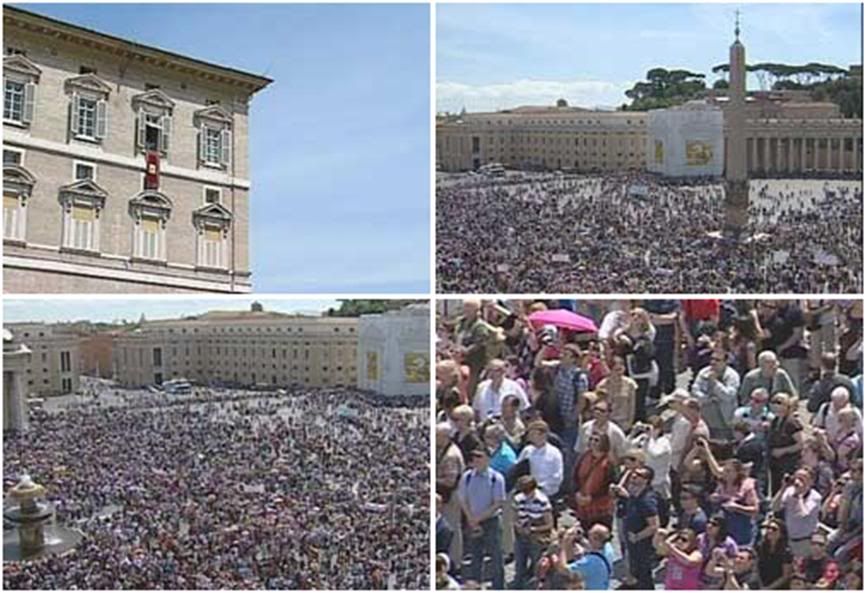
Leading the 'Regina caeli' prayers in St. Peter's Square at noon today, Benedict XVI paid tribute to Mary as the 'spiritual heart of the Christian community', saying she was the best example of what Jesus says in today's Gospel that 'whoever loves me follows my
words'.
He asked the faithful to pray for his trip to Portugal on Tuesday, centered on the devotion to Our Lady of Fatima.
After the prayers, he addressed words in Portuguese to Brazilian Catholics gathered in Brasilia for their 16th National Eucharistic Congress. The Holy Father sent Cardinal Claudio Hummes, archbishop emeritus of Sao Paolo and Prefect of the Congregation for the Clergy, as his personal representative to the celebration.
Here is what he said addressing English-speaking pilgrims today:
This week I am making an Apostolic Journey to Portugal to celebrate the 10th Anniversary of the Beatification of the visionaries Blessed Jacinta and Blessed Francisco.
I ask for your prayers for the success of this Journey, and I in turn assure you of my prayers to our Lady of Fatima for the whole People of God. May she intercede for us all, and draw us closer to Christ her Son.
Upon each of you and your loved ones at home, I invoke God’s abundant blessings.
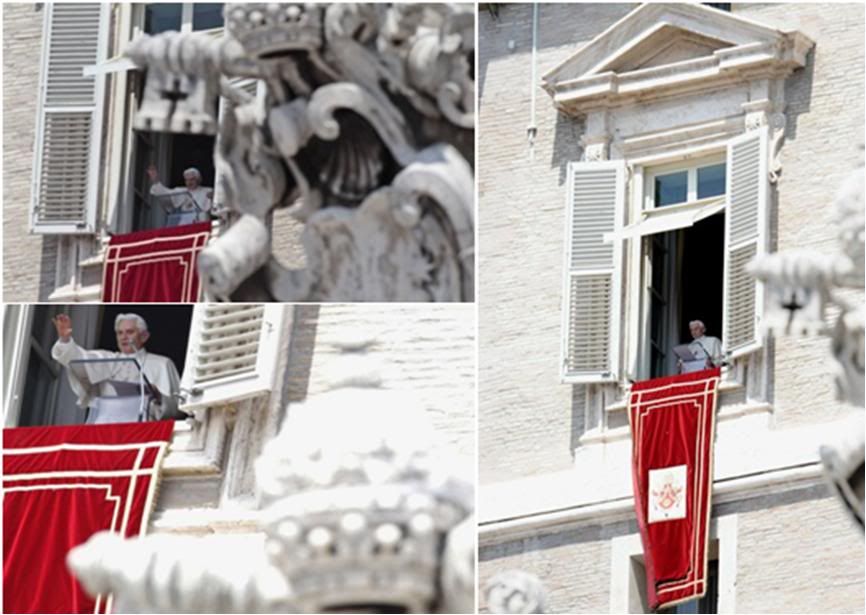
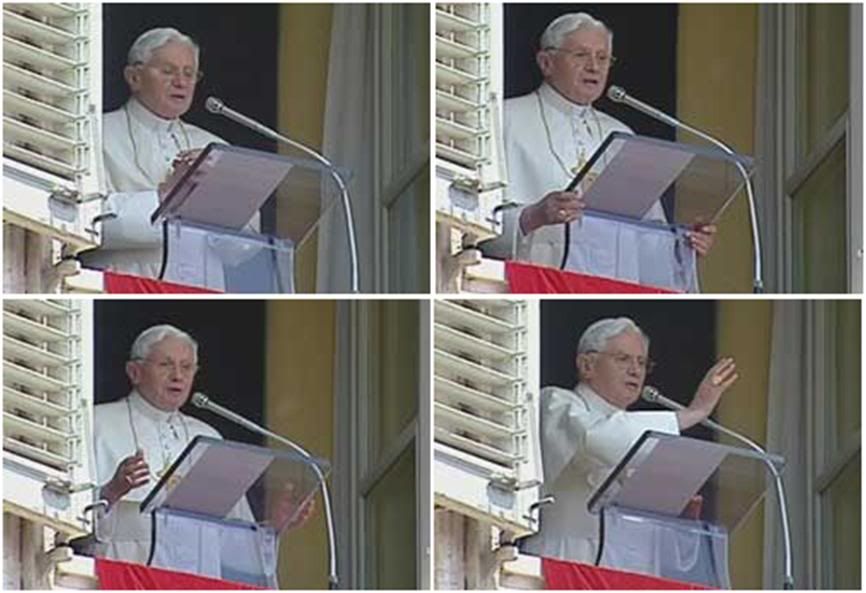
Here is a full translation of teh Holy Father's words today:
Dear brothers and sisters:
May is a beloved month for many reasons. In our hemisphere, spring advances with so much colorful flowering, and the climate favors walks and excursions.
For the liturgy, May always comes at Eastertide, the time of 'Alleluia', the revelation of the mystery of Christ in the light of the Resurrection and our Paschal faith. It is the time of awaiting the Holy Spirit who descends with power on the nascent Church at Pentecost.
In both contexts - the natural and the liturgical - the tradition of the Church to dedicate the month of May to the Virgin Mary harmonizes very well. Because she is indeed the most beautiful flower of Creation, the 'rose' who appeared in the fullness of time, when God, in sending his Son, gave the world a new spring.
At the same time, she is a protagonist, humble and discreet, in the first steps taken by the Christian community: Mary is its spiritual heart, because her very presence among the disciples is a living memory of the Lord Jesus and a token of the gift of his Spirit.
The Gospel this Sunday, taken from Chapter 14 of the Gospel of St. John, offers us an implicit spiritual portrait of the Virgin Mary, when Jesus says: "Whoever loves me will keep my word, and my Father will love him, and we will come to him and make our dwelling with him" (Jn 14,23).
These words are addressed to the disciples, but they can be applied to the maximum degree precisely to her who was the first and perfect disciple of Jesus. Indeed, Mary followed first and fully the word of her Son, demonstrating that she loved him not only as a mother, but first of all, as a humble and obedient handmaid. That is why God the Father loved her and why the Most Holy Trinity dwelt in her.
Moreover, when Jesus promises his friends that the Holy Spirit will help them to remember every word of his and to understand him profoundly (cfr Jn 14,26), how can we not think of Mary who, in her heart, temple of the Holy Spirit, meditated and interpreted faithfully all that her Son said and did? Thus, even before but especially after Easter, the Mother of Jesus also became the Mother and model of the Church.
Dear friends, in the heart of this Marian month, I will have the joy of going in the next few days to Portugal. I will visit the capital Lisbon and Porto, the country's second most important city.
The principal destination of my trip is Fatima. on the tenth anniversary of the beatification of the two shepherd children Jacinta and Francisco. For the first time, as the Successor of Peter, I will be visiting that Marian shrine which was so dear to the Venerable John Paul II.
I ask everyone to accompany me on this pilgrimage, participating actively in prayer: with one heart and one spirit, let us invoke the intercession of the Virgin Mary for the Church, particularly for priests, and for peace in the world.
After the prayers, he said the following in Portuguese:
I address a special greeting to the Brazilian people who will gather in their capital Brasilia, to celebrate the XVI National Eucharistic Congress, next Friday to Sunday, with the presence of my special representative, Cardinal Claudio Hummes.
The theme of the Congress is taken from the words of the two disciples at Emmaus who said, 'Stay with us, Lord' - an expression of the desire that throbs in the heart of every human being.
May all of you, pastors and the faithfuul, rediscover that the heart of Brazil is the Eucharist. And that it is precisely in the Most Blessed Sacrament of the Altar that Jesus shows he wants to be with us, to live among us, to give himself to us.
In adoration of him, let us recognize the primacy of God who alone can transform the heart of men, raising them to union with Christ in his Body. Indeed, by receiving the Body of the risen Lord, we experience communion with a Love that we cannot keep to ourselves alone: it demands to be communicated to others so that we may be able to construct together a more just society.
Finally, as we come closer to the end of the Year for Priests, I invite all priests to cultivate a profoundly eucharistic spirituality following the Example of the Holy Curate of Ars who, seeking to unite his personal sacrifice to that of Jesus actualized in the Mass, exclaimed: "How good it is for a priest to offer himself in sacrifice to God every morning!"
And as I invoke the intercession of Our Lady of Aparecida for all the graces that they may be nourished by the Eucharist, bread of unity, to become true missionary disciples, I impart on all the Apostolic Blessing.
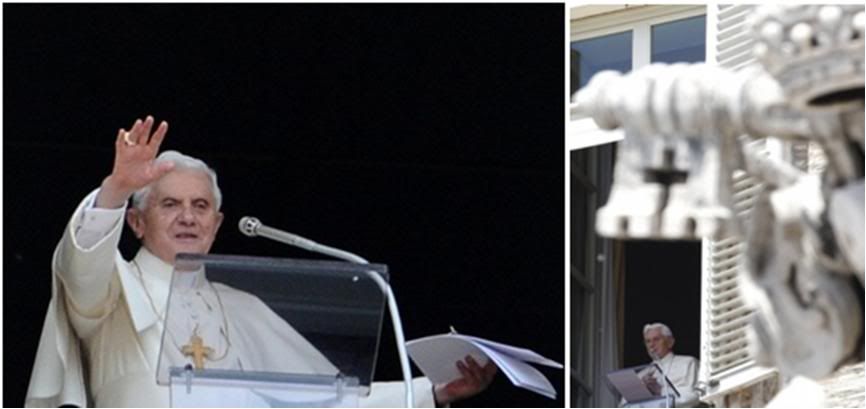
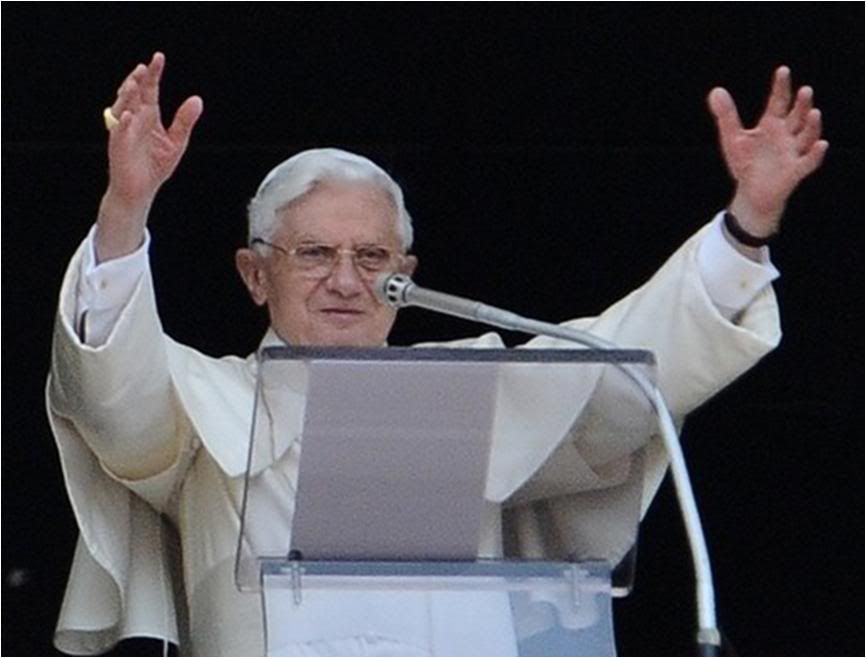
[Modificato da TERESA BENEDETTA 09/05/2010 23:46] |
| |
 10/05/2010 10:22 10/05/2010 10:22 |
|
| | | OFFLINE | | Post: 20.142
Post: 2.782 | Registrato il: 28/08/2005
Registrato il: 20/01/2009 | Administratore | Utente Veteran | |
|
 Schoenborn's statements
Schoenborn's statements
and its implications
by ANDREA TORNIELLI
Translated from

May 9, 2010
One has the impression that a public settling of accounts is coming, and that media pressure is causing an acute attack of nerves among some in the upper levels of the Church hierarchy.
The words used by the Archbishop of Vienna, Cardinal Christoph Schoenborn, to criticize, openly and harshly, the dean of the College of Cardinals, John Paul II's Secretary of State for 15 years, Cardinal Angelo Sodano, are absolutely unprecedented.
In fact, Schoenborn also said other things to Austrian editors last week: he said a reform of the Roman Curia was 'urgent'; he said that Catholic homosexuals who are in a well-established relationship deserve better consideration from the Church; he said the Church ought to review its position on denying Communion to Catholic divorcees who remarry.
But the real point of no return was Schoenborn's direct attack on Sodano, whom he blamed by name [for apparently protecting the late Austrian Cardinal Groer despite credible accusations of sexual offenses made by priests who had been his victims when they were seminarians].
His accusations appear to reflect equally on the statements made recently by the former Prefect of the Congregation for the Clergy, Colombian Cardinal Dario Castrillon Hoyos, after the disclosure of a letter written by him in 2001 congratulating a French bishop for not having reported one of his priests to the police for serial sexual offenses [the bishop received a suspended sentence for refusing to testify about the priest, saying he learned of the offense in Confession].
Castrillon said he had the support of John Paul II: "After consulting the Pope and showing him the letter, I sent it to the bishop, congratulating him for having been a model father in not having turned over a son to the police."
The statements by Castrillon adn the recent ones by Cardinal Schoenborn demonstrate yet again an unresolved problem about the last ten years of John Paul II's Pontificate and how the Roman Curia, starting with its highest officials, confronted the issue of priestly sexual abuse of minors.
Worse than the Groer case and new disquieting disclosures about it is the case of Father Maciel, founder of the Legion of Christ, who thanks to the cover that he had at high levels in the Vatican, succeeded for more than six years to dismiss as calumnies the detailed accusations made against him by former seminarians he had abused and then absolved in the confessional, despite canonical denunciations promptly presented to the Congregation for the Doctrine of the Faith.
Direct attacks by name, such as that made by Schoenborn, and in general, reprimands of fellow prelates from the mouths of Princes of the Church who no longer bother to be diplomatic - a rarity especially in the Vatican - are eloquent indications of a very heated situation and how deluded it is to think that the crisis situation is easing. [I don't think anyone is deluded about that - it's just that the crisis the media describe, i.e., a general worldwide loss of trust in the Church because of the sexual abuses, which is such a pat and rashly presumptuous deduction, is not exactly the more fundamental and wide-ranging crisis that Benedict XVI perceives and has been working so hard to address, i.e., a lack of grounding in the faith.]
This seems to be the underlying message in the statements made by the Archbishop of Vienna and his growing pro-activism, especially in the media: that zero tolerance and transparency - words of the day that sometimes seem to have replaced the Christian concepts of sin and mercy - should apply to everyone, even in the Vatican.
Meanwhile, the insistence with which Schoenborn has pointed out how different was the attitude of Cardinal Ratzinger - who was certainly hardly inclined to be indulgent in any way about these cases and determined to pursue them appropriately - has for one of its unintended and unwanted consequences that of casting a shadow over a good part of the Wojtylian Curia, and in the end, even the Polish Pope himself.
I am frankly disappointed that Tornielli's major concern appears to be the backlash on John Paul II's Curia - I don't for a moment believe anyone will really think John Paul II himself was knowingly at fault - almost all of whom are no longer in office or will be soon. It is not as if they had been above suspicion before now!
Besides, it now appears that Schoenborn only used his earlier unsolicited disclosures about Cardinal Ratzinger's disappointment at 'losing out' to the 'diplomatic side' (did he mean the Secretariat of State?] on the Groer case, as a wedge to prepare for his covering-all-the-liberal-causes news interview last week.
Tornielli also failed to rebut Schoenborn's unfounded and sanctimonious criticism of Sodano's use of the word 'chiaccheriacci' which I find a troubling sign of Schoenborn's intellectual dishonesty.
Here is what another Vaticanista had to say about that particular comment:
Schoenborn gets personal
against the dean of cardinals
by GIACOMO GALEAZZI
Translated from

May 9, 2010
VATICAN CITY - The Archbishop of Vienna has accused the dean of the Sacred College, Angelo Sodano, of having sidelined investigations into sexual offenses by priests and of having 'offended' the victims of sex abuse by a statement he made in his tribute of support for Benedict XVI on Easter Sunday.
Cardinal Christoph Schoenborn claims it was the former Secretary of State who covered 'the pedophile acts' of his predecessor as Archbishop of Vienna, the late Cardinal hans Hermann Groer.
The accusations by Schoenborn, reported last week by the Austrian news agency Kathpress, are not new. Already last Palm Sunday, Schoenborn, who is very close to Benedict XVI* already indicated that some high Curial officials had blocked attempts by then Cardinal Ratzinger to investigate the accusations against Groer.
And now he is accusing Sodano of causing 'serious harm' to the victims of priestly abuses by "describing the denunciation of their abuses as 'mere gossip'".
In fact, Vatican sources say, "the Easter tribute by Cardinal Sodano expressing solidarity and support for the Pope in the current crisis was decided with the Secretariat of State, and its contents were known beforehand". [And Cardinal Bertone, or his deputy for general affairs, Mons. Filoni, would have been well aware that the term 'chiacchieracci' was used in the same context by the Pope himself in his Palm Sunday homily!]
They also point out that from the time Schoenborn was named to succeed Groer in Vienna, he has been relentless against him, "making public condemnations that were out of place and that should have been avoided" [After all, the cardinal was dismissed from office. Not that such playing to the grandstands gained Schoenborn any points at all with anyone, because the hemorrhaging of Church membership in Austria has gone on undiminished under him!].
And now, Schoenborn's direct personalization of his 'J'accuse' is seen as 'over the top' by these sources, although they also say that "a person in Schoenborn's position would not use the Dean's name if what he's saying is unfounded".
But they do dismiss speculation that Schoenborn could have had Vatican approval for what he said last week, "not the least because they were statements he made to the media, not in a homily or at an official Church event". [And who in the Vatican would he consult anyway, when he apparently feels superior to all of them? And can anyone imagine Benedict XVI agreeing to a knockout, dragdown fight between cardinals carried out in public at all, much less at a time like this?]
[The rest of the story recycles the Groer case.]
* [I wish newsmen would stop automatically describing Schoenborn as 'very close to the Pope' or 'an intimate of the Pope'. It makes me cringe in embarrassment and distaste, just recalling all of Schoenborn's questionable actions and statements in the past 2-3 years that have certainly not helped Benedict XVI in any way!
Leaving aside his taking part in clown Masses and allowing blasphemous paintings to be exhibited in Vienna's cathedral museum, there was his cowardly desertion of Mons. Gerhard Wagner, giving in to public opinion against an orthodox-thinking bishop, after having first praised him warmly in a newspaper column when Benedict XVI named him auxiliary bishop for Linz, and then leading his Austrian bishops' conference in a disgraceful statement laying the blame on the Vatican system for appointing bishops - it amounted to a direct criticism of Benedict XVI for not consulting local bishops when he makes an appointment! (All the while, he has apparently done nothing about Austrian priests having mistresses, including one who boasted about it during the Linz case!)
That was followed by disparaging statements against the lifting of the ecommunication of the Lefebvrian bishops - even as he failed to say a single statement of public support for the Pope's statement on condoms and AIDS [And he purports to be the 'science-minded' cardinal, with his idiosyncratic statements about evolution!] Then Medjugorje! And now this very media-tailored hue and cry urging reform in the Curia - by which I suppose he means, head-rolling, but of whom? - as though Benedict XVI had never thought about Curial reform and has to be publicly pushed into it, suggesting that Benedict's 'style' makes it difficult for 'anyone from the outside to advise him'! Are those friendly actions at all? It's all arrogant and self-serving.
As for his personal attack on Sodano - is that not what St. Paul, and Benedict XVI, called 'biting and devouring each other', except that in this case, all the biting so far has come fron Schoenborn?
Something good could come from this if it causes Cardinal Sodano to issue a statement once and for all about what he did and/or failed to do in all this, and his reasons for such action or inaction. That should include the accusations against him over questionable interference in the Vatican bank IOR and his footdragging about vacating the Secretary of State's apartments after he retired in 2006.
[Modificato da TERESA BENEDETTA 15/07/2010 00:07] |
| |
 10/05/2010 13:08 10/05/2010 13:08 |
|
| | | OFFLINE | | Post: 20.144
Post: 2.784 | Registrato il: 28/08/2005
Registrato il: 20/01/2009 | Administratore | Utente Veteran | |
|


 Pope Benedict XVI's interest
Pope Benedict XVI's interest
in Marian devotion

VATICAN CITY, May 10 (AFP) - Pope Benedict XVI, a bookish theologian, holds a deep-rooted interest in the popular cult of the Virgin Mary, which will be on display during his visit to the shrine of Fatima in Portugal.
"Contrary to what one could imagine, Benedict XVI has a very positive opinion of demonstrations of popular faith like the one you can see in Fatima," Vatican expert Sandro Magister told AFP.
The Pope heads to Portugal on Tuesday to celebrate the 10-year anniversary of the beatification of two young shepherds who claimed to have seen the Virgin Mary appear.
"Like his predecessor John Paul II, Benedict XVI is very pious with regards to Mary," French Cardinal Paul Poupard told AFP.
Several trips have already brought Benedict to sanctuaries devoted to the Virgin Mary, where he celebrated masses in front of thousands of faithful: Marizell in Austria, Loreto in Italy, Aparecida in Brasil, Altotting in Germany, the "house of Mary" in Turkey and Lourdes in France.
As prefect of the Congregation for the Doctrine of Faith, the Pope - then Cardinal Joseph Ratzinger - dealt thoroughly with apparitions and miracles.
In 2000, John Paul II entrusted Ratzinger with writing a theological document on an aspect of the Virgin's six apparitions to three shepherds in Fatima between May 13 and October 13 in 1917.
The text dealt with what is known as the third secret of Fatima, which John Paul II believed to be a prophecy of the assassination attempt he survived on May 13 1981.
The three secrets of Fatima are visions and prophecies allegedly given by an apparition of the Blessed Virgin Mary to three young Portuguese shepherds.
"The Pope's visit to Fatima is not a visit to just 'any sanctuary' dedicated to Mary, as it was in other trips," the Pope's spokesman Federico Lombardi said. "The Pope dealt thoroughly with these events [in Fatima] from the theological and spiritual point of view," he said.
Since the beginning of Benedict's papacy in 2005, references to the Virgin in his homilies have been on the rise. [That's misleading. One should say instead that references to Mary have been constant, with him and the other Popes who have taken part in the weekly Angelus or Regina caeli. And it is standard in his homilies and in his addresses to bishops and priests to end with invoking the intercession of Mary, even when other saints are also invoked because of the place and occasion for the homily.]
Benedict "has often underscored the importance of Catholicism speaking to everyone, including the 'lost sheep,' Catholics who do not practice on a regular basis," Magister told AFP.
"These pilgrimage sites are a way to gather masses. It is not contradictory to his love of science and with his university experience," he added.
Benedict has also often shown appreciation for the simple and popular faith of Bavaria, the predominantly Catholic region in the south of Protestant Germany, where he was born.
The above is a very superficial and cursory look at the subject that does not even mention what Joseph Ratzinger/Benedict XVI has written about Mary.
It includes 3 books - Daughter Zion written back in 1983; the 2005 Mary: The Church at the Source, with Marian reflections by Joseph Ratzinger and Hans Urs von Balthasar; and the very recent MARIA, Ignatius Press's de luxe compilation of Marian texts by Benedict XVI...
NB: John Paul II's Marian writings are compiled in A Catechesis on Mary, the Mother of God, his 1995-1997 catechetical cycle on Mary. He also devoted the 1987 encyclical Redemptoris Mater to Mary; its English edition as a book uses the statement by Cardinal Ratzinger when he presented the encyclical to the media as its Introduction; and the 2002 Apostolic Letter Rosarium Virginis Mariae.]
Another AFP pre-visit story:
Pope's visit to shrine of secrets

After making a holy vow of penitence, some walk for miles and then crawl past the souvenir shops, chapels, hospitals and hostels for sick pilgrims that surround the main basilica in the town that has become the bastion of Portuguese Catholicism.
Fatima is big business, spiritually and commercially.
About four million people go to the town each year to see the place where three shepherd children -- Lucia Santos, 10, Jacinta and Francisco Marto, aged nine and seven -- say they saw a vision of the Virgin Mary on May 13, 1917 and then again on four other occasions.
They also say they saw her on August 19 of that year in the neighbouring village of Valinhos.
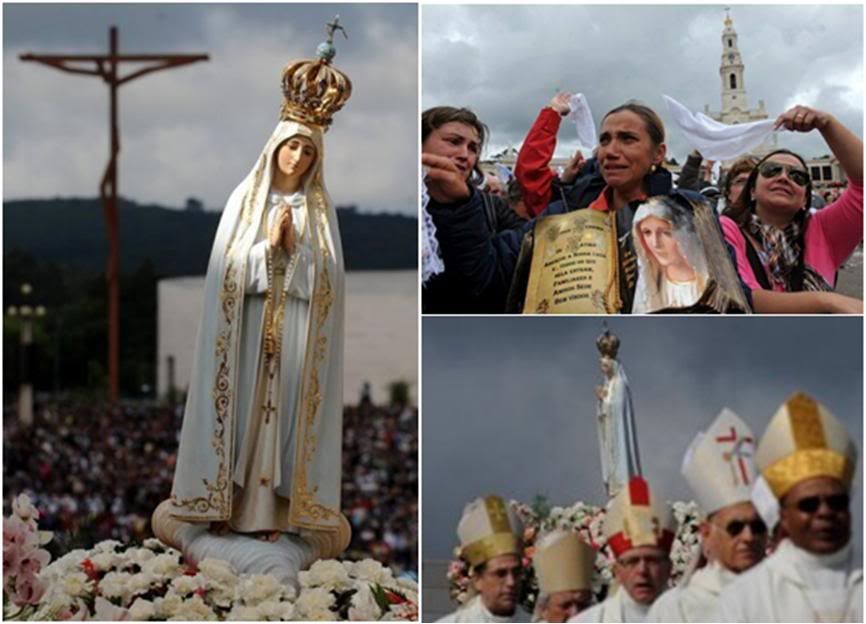 Procession in Fatima on May 13, 2009, to mark the 82nd anniversary of the first apparition.
Procession in Fatima on May 13, 2009, to mark the 82nd anniversary of the first apparition.
Since then it has been one of the Church's most important pilgrimages. Pope Paul VI went there in 1967 and Pope John Paul II in 1982, 1991 and 2000. John Paul said the Fatima angel saved him from an assassin's bullet in May 1981.
Benedict will spend two days at the shrine town where between 300,000 and half a million people are expected to join him on Thursday morning for a special Mass in the esplanade to mark the 10th anniversary of the beatification of Francisco and Jacinta.
The Pope arrives in Fatima on Wednesday, the second day of a four day stay in Portugal, and his first duty will be to pray in front of the statue of Our Lady of the Rosary at the Chapel of Apparitions built on the site where the children said they were told holy secrets by the Virgin Mary.
After the first visions, thousands quickly started to join the children at monthly gatherings. But the Church was at first sceptical and it was only in 1930 that the Vatican declared the apparitions as being "worthy of belief". [It took four years to 'recognize' Lourdes, but considerably longer for all other apparitions.]
Since then, hundreds of thousands of pilgrims have gathered at the basilica each May 13, overruning the central Portuguese town which normally has a population of about 15,000.
Fatima is today "the epicentre and the central pillar of popular Portuguese Catholicism and it is very strongly linked to the cult of the Virgin," sociologist Steffen Dix told AFP.
Some Catholics call Fatima the "Altar of the World" and the pilgrims who walk hundreds of miles to the town or crawl across the esplanade are a mark of the religious devotion that it inspires.
Since 1952, the bodies of Jacinto and Marta Santos have been in the main basilica. Their cousin Lucia died in 2005 at the age of 97, and is also laid to rest in the shrine.
In 2007, the Church of the Most Holy Trinity was completed at the complex, and at 12,300 square metres (132,000 square feet) it is one of the largest Christian churches in the world.
Lucia said that the Virgin Mary had told the children three secrets. Two were revealed at the start of the 1940s, one described hell, and the second a terrible conflict which some say was World War I and World II.
Fatima was used a national symbol by the right-wing dictatorship which ruled Portugal from the 1930s until 1974.
"Today it has lost all ideological connotation and nobody uses it for any anti-communist reference," said Dix, who has written 10 books on religion in Portugal.
The third secret was revealed in May 2000 during John Paul II's final visit. According to the Church, it predicted the attack that the pope was a target of in Rome 1981, strengthening the prophetic nature of Fatima.
Speculation over the secret has been the subject of books and hundreds of web sites and even inspired a 1981 hijacking of an Aer Lingus flight between Dublin and London by an Australian man who wanted the Vatican to reveal it.
Today the bullet that hit John Paul II is part of the crown on the statue of the Virgin Mary in the basilica.
AP's pre-visit situationere predictably accentuates the negative... and watch how Winfield manages to work in the 'sex abuse scandal' into the story!
Pope to mark Fatima anniversary,
but this may be overshadowed by
economic crisis, gay marriage issue
by Nicole Winfield

VATICAN CITY, May 9 (AP) - Pope Benedict XVI visits Portugal this week to mark key anniversaries surrounding Fatima, the famous shrine beloved by his predecessor.
What he will find is an overwhelmingly Roman Catholic country that like much of western Europe has strayed far from Church teaching on key issues and is in the throes of Europe's spreading financial crisis.
The centre-left Socialist government passed a law in 2007 allowing abortion on demand. In 2008, the Socialists introduced a law allowing a judge to grant a divorce even if one of the spouses is opposed. In January, Parliament passed a bill seeking to make the country the sixth in Europe allowing same-sex couples to marry.
The Vatican spokesman, the Rev. Federico Lombardi, didn't rule out that the Pontiff would raise the gay marriage issue during the four-day visit, which starts Tuesday and will bring the 83-year-old pontiff to the capital Lisbon, Fatima, and Porto, the country's second-largest city.
Portuguese Cardinal Jose Saraiva Martins was more blunt: "Certainly during the trip he will confront many arguments that aren't strictly religious, concerning those values and principles which - aside from being Christian - are human, such as the value of life, the value of family," he told Associated Press Television News.
Those terms are Vatican-speak for the Church's opposition to abortion and its belief that a family is based on marriage between a man and a woman.
Portugal is nearly 90 per cent Catholic, but only around 2 million of the country's 10.6 million people describe themselves as practicing Catholics. Like much of western Europe, it has seen the number of priests drop sharply and Benedict himself lamented the "growing sea of non-practicing Christians" when he met with Portuguese bishops at the Vatican in 2007.
Speaking to pilgrims and tourists in St. Peter's Square on Sunday, Benedict told them he would have the "joy" of visiting Portugal, and he asked faithful for their prayers.
He also asked them to pray for the church, "in particular for priests", but made no mention of the clerical sex abuse scandals rocking the Church in much of Europe. [Why on earth is the Pope expected to mention this topic every time he speaks??? It's not like he's Obama with his compulsion to blame everything on George Bush every time he speaks!]
Prime Minister Jose Socrates has been the driving force behind the abortion and gay marriage initiatives, saying they are part of his attempt to "modernize" Portugal, western Europe's poorest country.
Portugal's Catholic bishops strongly opposed the gay marriage bill, and tried unsuccessfully to put it to a referendum; the conservative President Anibal Cavaco Silvo must now decide whether to veto or ratify the bill.
Portugal has also been hard hit by the financial crisis and is currently striving to avoid becoming the next victim of Europe's debt problems. Mounting debts have forced the government to enact an austerity plan, including a public sector pay freeze, sparking outrage from unions and leftist parties.
Portugal's Minister for the Cabinet, Pedro Silva Pereira, told the church's news agency Ecclesia he expected Benedict to address the crisis, noting the pontiff's 2009 encyclical "Charity in Truth" dealt specifically with the global financial meltdown.
He called the visit a "mobilization of hope" that was important not just for Portugal but other countries facing a "very painful crisis."
Technically, though, the heart of Benedict's trip is in Fatima, where he will celebrate a Mass on May 13, the anniversary of the day in 1917 when three Portuguese shepherd children reported having visions of the Virgin Mary.
Since then, the Fatima shrine has drawn millions of pilgrims a year and was a favourite of Pope John Paul II, who made his third and final visit in 2000 when he beatified two of the three shepherds.
During that visit, the Vatican revealed the so-called third secret of Fatima, the third part of the message the Virgin allegedly told the children: a description of the May 13, 1983 assassination attempt on John Paul.
John Paul believed the Virgin intervened to spare his life after a Turkish gunman fired on him in St. Peter's Square. In gratitude, he gave the bullet extracted from his wound to the Fatima shrine and it now adorns the crown of a statue of the Virgin where Benedict will pray.
The gunman, Mehmet Ali Agca, has said he wanted to travel to Fatima to meet with Benedict; no such meeting is on the Pontiff's schedule.
Agca's lawyer, Haci Ali Ozhan, said he received a telephone call from the Portuguese prime minister's office asking Agca to postpone his visit to Fatima because authorities there will be overwhelmed with the Pope's pilgrimage. Ozhan said Agca will be travelling there at a later, unspecified, date.
The prime minister's spokesman could not immediately be reached for comment.
The first two secrets of Fatima have long been known and were said to have foretold the end of World War I and the outbreak of World War II and the rise and fall of Soviet communism.
No new secrets are expected during Benedict's visit, which marks the 10th anniversary of the beatification of the two shepherds and the fifth anniversary of the death of the third — Sister Lucia.
Lucia is on an accelerated path to beatification, the first step before possible sainthood. Saraiva Martins, the retired head of the Vatican's saint-making office, says no announcements on her case are expected.
Pope's visit to Portugal may shed
light on the 'third secret' of Fatima
By Nick Squires in Rome

09 May 2010
The Pope will travel to Portugal this week amid hopes that he might shed light on one of the Catholic Church's most intriguing mysteries – the so-called Third Secret of Fatima
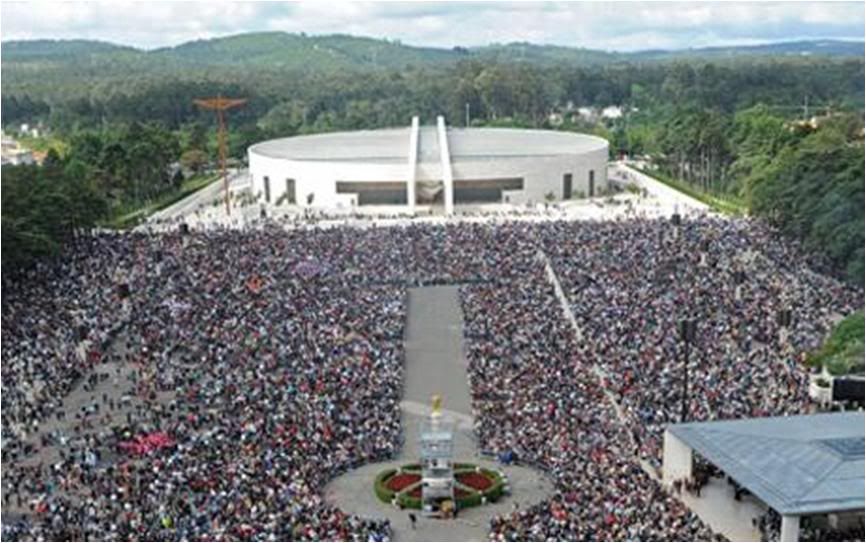
During his four day visit, Benedict XVI will pray at the shrine of Fatima, one of the best known centres of Catholic pilgrimage in the world and the focus of endless conspiracy theories and Doomsday predictions.
Its cult is founded on the belief that three shepherd children witnessed a series of apparitions and prophecies of the Virgin Mary in 1917.
Three secrets were supposedly disclosed to them, with the first and second relating to a vision of Hell and predicting the end of World War I, the outbreak of World War II, the collapse of the Soviet Union and Russia's return to Christianity.
The third secret was only disclosed by the Vatican in 2000 and was said to have foretold the assassination attempt on Pope John Paul II by a Turkish gunman in 1981.
There has been intense speculation ever since that the Vatican withheld part of the secret, which is said to have concerned the Satanic infiltration of the Catholic Church, the rise of an anti-Pope or even nuclear Armageddon.
The Holy See claims that it has released the full text of the secret and that it is holding nothing back, but many Catholics are not convinced.
Benedict is one of the world's leading authorities on the mystery because as Cardinal Joseph Ratzinger, before he was elected Pope in 2005, he was responsible for developing the Vatican's official position on the miracle of Fatima and wrote a scholarly interpretation of the Third Secret.
Benedict's visit is heavy with symbolism. He will be in Fatima on May 13 – the same day, in 1917, that the Madonna supposedly first appeared to the children. It is also the date on which Turkish gunman Mehmet Ali Agca came close to killing John Paul II after shooting him in St Peter's Square.
Sandro Magister has also posted a pre-visit article in www.chiesa in which he focuses on Benedict XVI's involvement in the 'third secret'- much of it excerpted from the Vatican website, which has the most complete presentation of this subject, among the doctrinal documents of the Congregation for the Doctrine of the Faith:
www.vatican.va/roman_curia/congregations/cfaith/documents/rc_con_cfaith_doc_20000626_message-fatima...
The documents include pertinent photocopies of documents written by Sor Lucia and a note by John XXIII about the secret.
[Modificato da TERESA BENEDETTA 05/05/2011 23:35] |
| |
 10/05/2010 14:18 10/05/2010 14:18 |
|
| | | OFFLINE | | Post: 20.146
Post: 2.786 | Registrato il: 28/08/2005
Registrato il: 20/01/2009 | Administratore | Utente Veteran | |
|
[Modificato da TERESA BENEDETTA 10/05/2010 14:19] |
| |
 10/05/2010 14:19 10/05/2010 14:19 |
|
| | | OFFLINE | | Post: 20.147
Post: 2.787 | Registrato il: 28/08/2005
Registrato il: 20/01/2009 | Administratore | Utente Veteran | |
|

 As the Holy Father promised earlier this year, JESUS OF NAZARETH, Vol 2, is on schedule for publication. The Vatican announced this today:
COMMUNIQUE FROM THE HOLY SEE
As the Holy Father promised earlier this year, JESUS OF NAZARETH, Vol 2, is on schedule for publication. The Vatican announced this today:
COMMUNIQUE FROM THE HOLY SEE
on 'JESUS OF NAZARETH', Vol. 2
The text for the second volume of the book JESUS OF NAZARETH by His Holiness Benedict XVI was recently given to the publishers for publication. This second volume is dedicated to the Passion and Resurrection of Christ, and picks up where Volume 1 left off.
The text, written in German, was handed at the same time to Manuel Herder, the publisher of the 'Complete Works' of Joseph Ratzinger and to Fr. Giuseppe Costa, director of the Vatican publishing house LEV (Libreria Editrice Vaticana).
LEV, as the principal publisher, will grant the rights to publish the Italian edition and to other publishers for translations into other languages which shall be made directly from the German original.
It is hoped that the publication of this book will take place simultaneously in the major languages, but even if done expeditiously, this will take several months because of the time required for a careful and accurate translation of a text that is so important and much awaited.
[Modificato da TERESA BENEDETTA 05/05/2011 23:40] |
| |
 10/05/2010 15:05 10/05/2010 15:05 |
|
| | | OFFLINE | | Post: 20.148
Post: 2.788 | Registrato il: 28/08/2005
Registrato il: 20/01/2009 | Administratore | Utente Veteran | |
|

 For leading me to this item, thanks to Lella and her blog followers
For leading me to this item, thanks to Lella and her blog followers
 Cardinal Sodano's Easter Sunday message
Cardinal Sodano's Easter Sunday message
for the Pope was entirely
the initiative of the cardinals in Rome
Benedict XVI has never asked for demonstrations of support or defense
Letter to the Editor
by Federico Lombardi, S.J.
Translated from

May 10, 2010
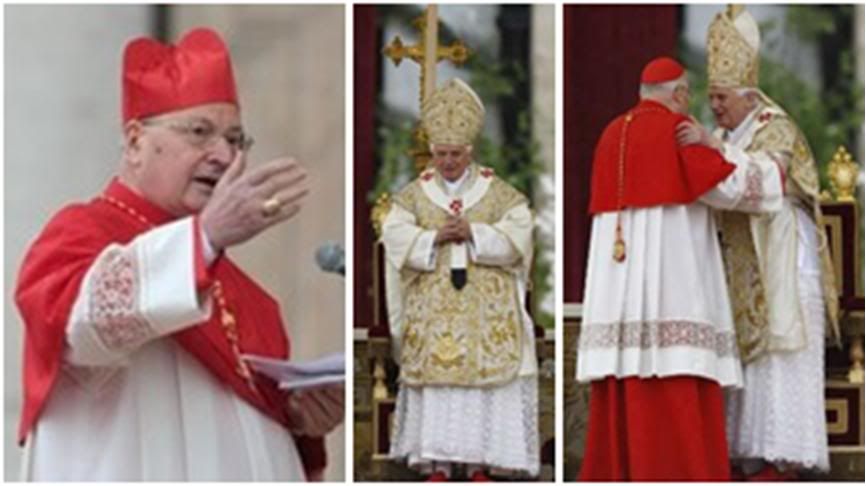
Dear Editor,
In the article pubblished by Corriere on May 9 regarding "a confrontation between two cardinals", the writer, Alberto Melloni, develops various considerations and analyses that are, of course, legitimate even if I do not share most of it, but he also makes a completely false statement that I consider it my duty to correct.
Melloni writes: "Von Schoenborn knows that Benedict XVI had asked Cardinal Sodano for a message of support on Easter Sunday which was delivered in St. Peter's Square..."
In the interest of truth, Benedict XVI has asked for absolutely nothing.
The address given by Cardinal Sodano was an initiative of the College of Cardinals, those of them who are in Rome, represented by their Dean. The Pope was informed about it just before the Mass, if only because, being the celebrant, he had to know what was going to happen.
He accepted the greeting with gratitude and simply for what it was meant to be - a message of closeness, affection and solidarity.
Melloni's discourse would remain substantially the same, regardless of this correction. But one must point out that the one direct statement he makes about the Pope seriously changes the picture.
I consider it my duty to make it clear that Benedict XVI, even in difficult times, never begs for nor organizes manifestations of defense and support in order to sustain his spiritual calm nor his authority.
I would add that if there is any one person to my knowledge who - as Melloni rightly wishes at the end of his article - is living through the actual situation of the Church with awareness of its significance, without any concern for loss of power, but in an evangelical spirit of purification, penitence and profound renewal, it is precisely Benedict XVI.
FEDERICO LOMBARDI, S.J.
Director, Vatican Press Office
 |
| |
 10/05/2010 17:07 10/05/2010 17:07 |
|
| | | OFFLINE | | Post: 20.149
Post: 2.789 | Registrato il: 28/08/2005
Registrato il: 20/01/2009 | Administratore | Utente Veteran | |
|


 There is no 'fourth secret',
There is no 'fourth secret',
Bertone reiterates in updated book
by ANDREA GAGLIARDUCCI
Translated from

May 10, 2010
"A fourth secret of Fatima does not exist", says Mons. Loris Capovilla, 94, who was the private secretary of Pope John XIII and was among the very first persons to read the statement handwritten by Sor Lucia, one of the three shepherd children of Fatima to whom the Blessed Mother appeared in 1917. [Unfortunately, that single statement is all that the article says about an apparently new statement from Capovilla about the 'secret'.]
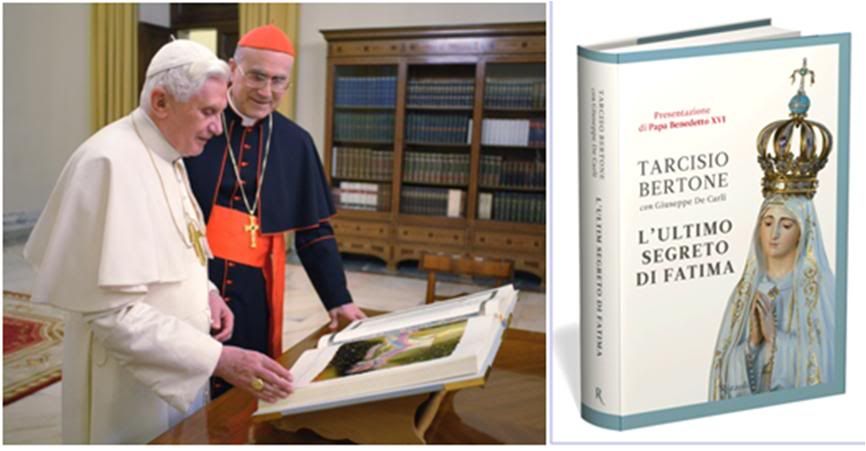
Capovilla's testimony is found in the book L'ultimo segreto di Fatima, which is a new update of an interview book by RAI's longtime Vatican news editor Giuseppe Di Carli with Cardinal Tarcisio Bertone published in 2007 as L'ultima veggente di Fatima (The last seer of Fatima).
Bertone, in his capacity as secretary of the Congregation for the Doctrine of the Faith, had been sent to Portugal three times by then Cardinal Ratzinger to interview Suor Lucia before the so-called 'third secret' was revealed by John Paul II in 2000.
This update is not expected to settle the continuing dispute on a purported 'fourth secret' supposedly contained in a part of the 'third secret' which the Vatican chose not to reveal.
 From left, Capovilla's 1964 biography of John XXIII; an undated photograph of Capovilla, probably in the 1990s; in a 2007 photograph with a visiting American journalist; and Socci's book.
From left, Capovilla's 1964 biography of John XXIII; an undated photograph of Capovilla, probably in the 1990s; in a 2007 photograph with a visiting American journalist; and Socci's book.
Especially since Mons.Capovilla is also cited as a 'witness in support of a fourth secret' by journalist Antonio Socci in his 2008 book Il Quarto Segreto di Fatima (which essentially disputes Bertone's book and the Vatican documents of 2000.
According to the Vatican, the third secret was a sort of prophecy referring to the assassination attempt on John Paul II in 1981 by the Turkish hired gun Ali Agca. The following year, John Paul II made his first of three pilgrimages to Fatima, later asking that the bullet which missed hitting him in any vital organ be embedded into the crown of the image of Our Lady of Fatima in the Chapel of the Apparitions.
Strangely, a second attempt was thwarted on that occasion, when a mentally-disturbed Spanish ultra-conservative priest, Juan Fernandez Krohn, tried to stab John Paul II with a dagger. [In his memoir published two years ago,Mons. Stanislaw Dsiwisz revealed for the first time that the Pope did sustain a surface wound from that attempt.]
When John Paul II disclosed the 'third secret' in Fatima. on the occasion of beatifying the younger seers Jacinta and Francisco, then Cardinal Ratzinger presided at a full presentation in the Vatican, which included his theological commentary on the apparitions at Fatima.
Now Pope Benedict XVI, Fatima will be the center of his first pilgrimage to Fatima as Pope, where he intends to be 'a pilgrim among pilgrims', as he wrote the bishops of Portugal.
Before the Regina caeli prayers in St. Peter's Square yesterday, the Pope asked the faithful to take part in his visit by asking the intercession of the Virgin Mary "in behalf of the Church, especially her priests, and for peace in the world".
In the eleven discourses he will deliver in Portugal, Benedict XVI will most certainly speak on the fundamental Christian values regarding life, marriage and the family.
In recent years, Portugal has undergone a progressive secularization, called 'kind' because it did not at first signal a clear break from the Catholic Church. Baptism, confirmation, First Communion and marriages continue to be celebrated, and the Christmas message of the Patriarch of Lisbon is always televised nationwide.
But in 2007, Portugal decriminalized abortion, and in recent months, it approved gay marriage, although it has yet to decide on whether to allow adoption by gay couples, which the Portuguese bishops radically oppose.
Pope to speak about
economic crisis in Portugal
By BARRY HATTON
LISBON, Portugal, May 10 (AP) – Pope Benedict XVI will speak about the economic crisis during his four-day trip to Portugal this week, telling Europeans to seek solace in their faith, a senior church official said Monday.
The Pontiff intends to deliver a message that "the joy of faith and hope" is a remedy for the gloom of financial hardship, said Carlos Azevedo, the auxiliary bishop of Lisbon and the visit's coordinator.
"The moral values guiding the economy and politics show that there is a spiritual crisis," Azevedo told a news conference, adding: "Europe needs to be awoken."
The Pontiff, who arrives Tuesday in Lisbon, has been alert to the social problems caused by the economic crisis. His 2009 encyclical "Charity in Truth" specifically addressed the global financial meltdown and he has repeatedly urged leaders to ensure the world's poor don't bear the brunt of the financial pain.
Benedict says the downturn shows the need to rethink the purpose of the global financial system.
The Pope will convey "a message of hope which says it is possible, if we are guided by ethical and spiritual values, to find paths to a new future," Azevedo said.
The Pontiff will also visit the famous Catholic shrine at Fatima, in central Portugal, and Porto, the country's No. 2 city.
The timing of his visit has proved apt as Portugal, western Europe's poorest country, has become one of the main casualties of the continent's economic troubles.
Portugal's economic growth has been pedestrian for years, averaging less than 1 percent between 2001-2008, and the global downturn brought a steep contraction of 2.7 percent last year.
The result is that last year around 342,000 people took home the minimum salary of just euro475 ($615) a month. That was roughly double the number who earned that much in 2006. The average Portuguese salary is estimated at around euro900 ($1,160) a month.
A three-year austerity plan to ease the country's crippling debt load is expected to bring greater hardship to a people already feeling the pinch.
The Catholic Church provides welfare programs and food handouts for the needy. Portuguese bishops last year called attention to what they called "scandalous levels of poverty."
Benedict is also expected to address the drift in Portugal, and in much of western Europe, away from Church teaching on key issues.
Portugal's center-left Socialist government passed a law in 2007 allowing abortion on demand. In 2008, it introduced a law allowing a judge to grant a divorce even if one of the spouses is opposed.
In January, Parliament passed a bill seeking to make the country the sixth in Europe allowing same-sex couples to marry. Conservative President Anibal Cavaco Silvo now has to decide whether to veto or ratify the bill.
Azevedo said one of the Pope's main themes in Portugal would be the need "to awaken slumbering Christians and also, to some extent, a Europe whose values have become somewhat decadent, to different values."
Portugal is nearly 90 percent Catholic, but only around 2 million of the country's 10.6 million people describe themselves as practicing Catholics.
Religious sentiment, however, runs deep. At least 500,000 people are expected to attend the Pope's Mass in Fatima on May 13, the anniversary of the day in 1917 when three Portuguese shepherd children reported having visions of the Virgin Mary.
The visit to Fatima, where Benedict will spend two nights, is the centerpiece of his trip. On Friday morning he will celebrate a Mass in Porto's main downtown avenue before returning to the Vatican.
[Modificato da TERESA BENEDETTA 15/07/2010 00:13] |
| |
 10/05/2010 17:19 10/05/2010 17:19 |
|
| | | OFFLINE | | Post: 20.150
Post: 2.790 | Registrato il: 28/08/2005
Registrato il: 20/01/2009 | Administratore | Utente Veteran | |
|
NEWS ALERT:
Thanks again to an alert reader of Lella's blog,

There is a long article in an Austrian newspaper, the Donaukurier, - I don't have time to translate it -
www.donaukurier.de/nachrichten/bayern/Eichstaett-Was-wird-hier-bloss-gespielt;art155371...
that says the 26-year-old man alleged to have been sexually abused by Mons. Walter Mixa when he was Bishop of Eichstaett, denies that he was ever abused by Mixa, and has come out and spoken to them in order to defend him. The newspaper also claims that the police in Ingolstadt who were reported to be investigating Mixa preparatory to filing charges have not done so because they were not even given any name to investigate.
Meanwhile, Mixa has resigned, and the Pope has accepted his resignation, in connection with earlier charges that he punished children by beating them when he was a priest (charges he first denied, then admitted) and that he had used church funds in the past to purchase personal items.
[Modificato da TERESA BENEDETTA 10/05/2010 17:19] |
| |
 10/05/2010 19:52 10/05/2010 19:52 |
|
| | | OFFLINE | | Post: 20.151
Post: 2.791 | Registrato il: 28/08/2005
Registrato il: 20/01/2009 | Administratore | Utente Veteran | |
|
|
| |
 10/05/2010 21:12 10/05/2010 21:12 |
|
| | | OFFLINE | Post: 287
Post: 51 | Registrato il: 28/05/2007
Registrato il: 19/02/2009 | Utente Comunità | Utente Junior | |
|
Well, here's one good thing about this: he'll never be Pope!!
Thank God!!
What a fool!! I'm sorry to be so frank about a Cardinal, but he's been completely unpredictable and has said the most ludicrous things.
Before even dreaming about suggesting Curial reforms, he should get his own mess cleaned up. The state of the Austrian Church is horrendously terrible!!
WHAT IS IT WITH THE BISHOPS OF GERMAN SPEAKING NATIONS??!!
Are they so intimidated by being chased by the media that they've lost their common sense?!!
And then Arch-Bishop Schick of Bamberg (pain) gives an interview to the 'Spiegel' - the biggest Pope-bashing tabloid in continental Europe, calling himself a 'clerical 68er' (??!!?), wanting to discuss celibacy!!
Giving advice to his conservative brothers. Honestly, I just wanted to cry… I certainly didn’t convert to be stabbed in the back by my own Bishop!!!
How can any sane Bishop even consider giving an interview to that lying, manipulating, left-wing agenda pushing and militant magazine!??
![[SM=g8113]](https://im0.freeforumzone.it/up/0/13/1492792.gif) ![[SM=g8115]](https://im0.freeforumzone.it/up/0/15/1119870.gif) ![[SM=g7707]](https://im0.freeforumzone.it/up/0/7/2527896.gif) ![[SM=g1782473]](https://im1.freeforumzone.it/up/17/73/324410086.gif) ![[SM=g8126]](https://im0.freeforumzone.it/up/0/26/3169140.gif) ![[SM=g8143]](https://im0.freeforumzone.it/up/0/43/2353327.gif) I've signed up for a two year subscription of 'Die Tagespost' and have been loving it!! What a wonderful paper!!
I've signed up for a two year subscription of 'Die Tagespost' and have been loving it!! What a wonderful paper!!
I haven't checked if my subscription of the print version will give me access to the online-version.
I'll inform you as soon as know.
 Hi, Heike... Are you back from Rome now, or going there after the Pope gets back from Portugal?
Hi, Heike... Are you back from Rome now, or going there after the Pope gets back from Portugal?
Glad your Tagespost subscription is working out.... I followed a link today to it - something about how the German media are out to sabotage all the conservative German bishops, but it ended after a few paragraphs because of the non-subscriber thing! I really feel very badly about them going exclusive like this because in the first two years of the B16 Pontificate, I must have printed out two binders worth of articles from them....
As for that unspeakable person in Vienna, Carlo Maria Martini in 30 years as Archbishop of Milan and the years since his retirement has not said as many outrageous things as he has said in the past two years alone He really thinks that the majority of bishops in the next Conclave (Please, God! let it be 20 years away at least!) will be as namby-pamby as he is and bend whichever way public opinion goes! God help the Church.
If only it were possible to erase his name from the Catechism, and if only the Schuelerkreis could elect somebody else soon to be their president (after all, he was never a doctoral student of Prof. Ratzinger - I think he merely audited a semester's courses or something, since like Hans Kueng, he got his theology doctorate from the Sorbonne, la-di-dah!) UGGGGH and EEEEEWWWWW... (And that goes for the bishop you are so unfortunate to have!]
TERESA
[Modificato da TERESA BENEDETTA 11/05/2010 03:57] |
| |
 11/05/2010 03:45 11/05/2010 03:45 |
|
| | | OFFLINE | | Post: 20.152
Post: 2.792 | Registrato il: 28/08/2005
Registrato il: 20/01/2009 | Administratore | Utente Veteran | |
|


 PORTUGUESE MEDIA OPEN THEIR ARMS
PORTUGUESE MEDIA OPEN THEIR ARMS
AND PAGES TO THE POPE
Here's a sampling of the May 10 newspapers:
'Everything is ready to welcome the Pope:
The Pope expresses his joy to be visiting Lisbon, Fatima and Porto'
24 HORAS : 'By land, sea or air, the Pope will come to Portugal!'
O PRIMEIRO DE JANEIRO: 'Not even the volcano can keep the Pope away'
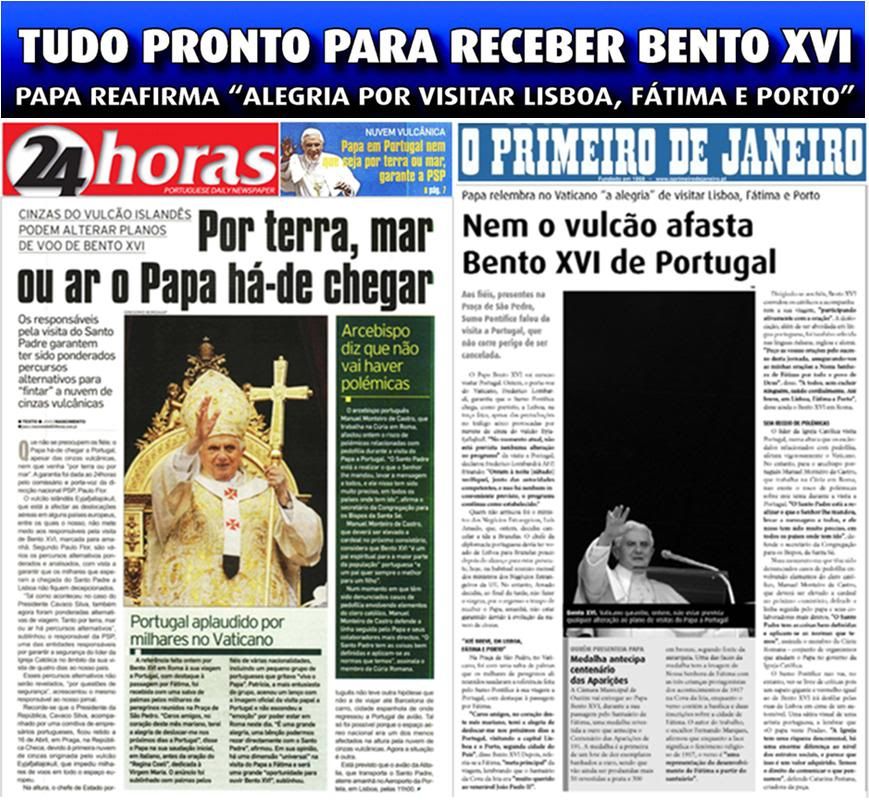
JORNAL DO NOTICIAS: 'Everything's in place to welcome the Pope' and reports
the Holy Father's Regina caeli words: 'Joy in anticipating the pilgrimage'
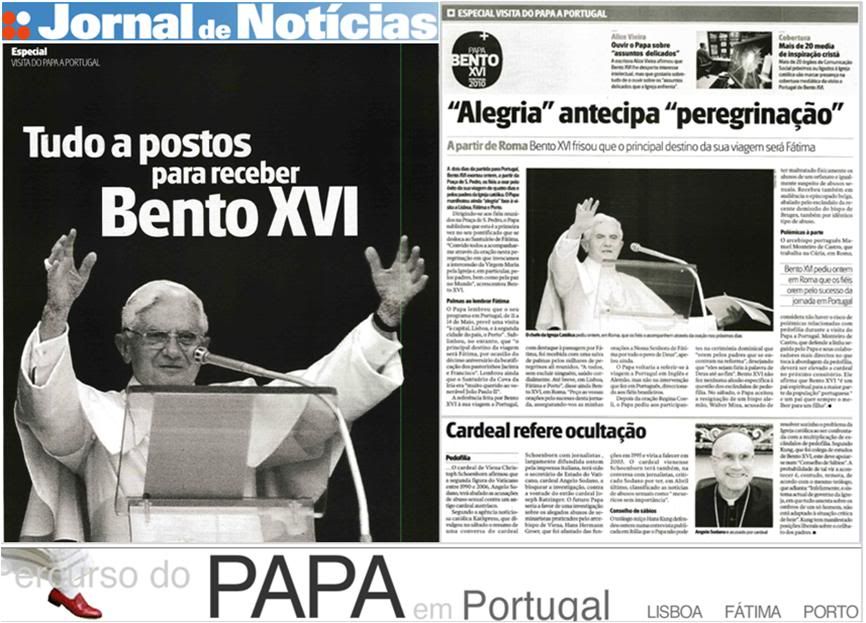
Its 'Percorso del Papa' features the best of the animated infographics I have seen on the events and locations of the papal visit.
CORREIO DO MANHA: 'The faithful await the Pope's arrival'
DIARIO DE NOTICIAS: 'The four days of the Pope's visit' - an easy to-follow event map.
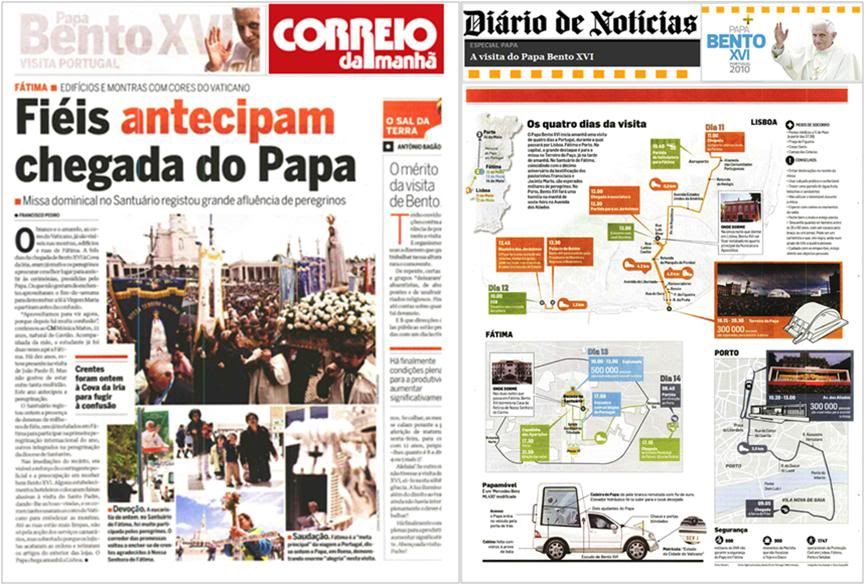
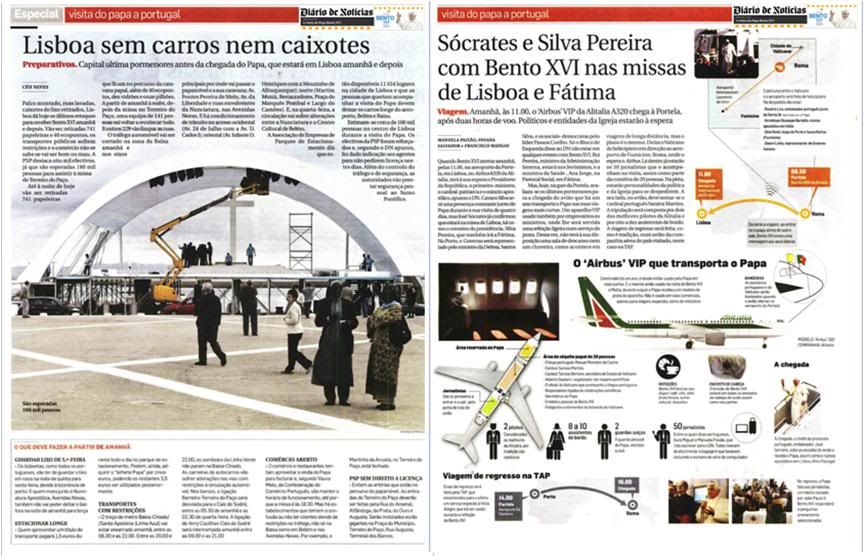 The stage is set
The stage is set
for the Pope's visit
Translated from
the Italian service of

May 10, 2010
The eve of the Pope's departure for Portugal. Great expectation in Fatima, where the Pope will celebrate Mass on the tenth anniversary of the beatification of Jacinta and Francisco.
There is great excitement in Lisbon, Porta and Fatima, the three cities which Benedict XVI will visit in the next few days. The Pope will be leaving Fiumicino airport in Rome in the morning and will reach Lisbon around 11 a.m. local time.
The centerpiece of Benedict XVI's 15th international trip as Pope will be the celebrations in Fatima which also marks the 83rd anniversary of the first apparition in 1917. Here is a report from Roberto Piermarini:
Portugal is ready to welcome Benedict XVI whom the local media are calling 'the third Pope of Fatima', after his predecessors Paul VI and John Paul II.
In Lisbon, large blue signs everywhere reading 'Obrigado Bento XVI' (Thank you, Benedict XVI) can be found in all the important places of the historical city center and along the Tagus River on whose right bank the Pope will be celebrating Mass in Europe's largest city square, the Placa del Comerzio still better known by its older name, Terreiro do Paco.
The festive spirit was building up in the hours leading to the visit. Newspapers and TV which have been focused on fears that Greece's financial and economic crisis could happen next in Portugal have nonetheless given the papal visit prominent play.
Many intellectuals who are declared agnostics or non-believers have written articles or have gone on talk shows to exalt the spiritual, moral and intellectual depth of the Pope and to defend him from the attacks in recent weeks.
Benedict XVI is visiting a nation where secularization has undermined the strong Portuguese folk religiosity - 88% call themselves Catholic but only 20% are practising.
After having legalized divorce and abortion, the cabinet of the Socialist Premier Jose Socrates has also approved gay marriage, but the law has been blocked so far by the President of the Republic on the ground that it is unconstitutional.
For the Pope's visit, the government declared a day off for all government workers - May 11 in Lisbon, and May 13 for the rest of the country.
Catholic media have been playing up the motto of the visit, "With you, we walk in hope", especially as it applies to topics like faith and reason, holiness and evangelization, that the Pope is expected to address during his various meetings in Lisbon, Fatima and Porto with a wide range of listeners: the worlds of culture, science and the arts; workers carrying out various pastoral ministries; and priests.
But Benedict XVI's 15th international visit is distinguished above all by its Marian dimension in Fatima, the religious heart of Portugal. In 1917, three young shepherds, Lucia and her younger cousins Jacinta and Francisco experienced multiple apparitions of Mary.
Benedict XVI is linked to Fatima above all by his theological commentary about the apparitions and the so-called 'third secret' when the Vatican disclosed this in 2000.
The Patriarch of Lisbon, Cardinal Policarpo, said of the commentary that "it remains the peak of everything that has been said about the subject".
Upon his arrival in Fatima, Benedict XVI's first event at the Chapel of the Apparitions is to remember John Paul II and the May 13, 1981 assassination attempt on him.
In Fatima this time, Benedict XVI will deliver a meditation on history, and the significance of Fatima in the history of man's spirituality.
Antonio Pinheiro, from our Portuguese service, interviewed Mons. Jorge Ferreira da Costa Ortiga, Archbishop of Braga and president of the Portuguese bishops' conference:
MONS FERREIRA: In opur day, the intrinsic dimension of the human being has been neglected, and thus, too, that of society - a set of absolute and permanent values that transcend frontiers have been broken in favor of a relativism that closes off the horizon of human life and limits it simply to the world of exclusively material values.
This is the context within which the Pope is visiting Portugal. He will surely bring us the message that while it is necessary to live in the world and avail of its material conditions, there is another dimension of man's being that must be discovered, or rediscovered - a life that is rooted in values that point to the right path, values that the Catholic Church has always taught as values that belong to all men.
It will be these values that will lead us out of crisis, since the crisis itself has a positive dimension, as a challenge against which we can test ourselves.
And whatever message the Holy Father will have for the Portuguese people is also a message to the Church in general. If we think of Fatima as 'the altar of the world', I am convinced that this message will go beyond our frontiers into the greater European space, and even beyond, to all Christians who will have an opportunity to listen and to accept it.
Benedict XVI knows as no one else the heart and the significance of the Message of Fatima, particularly of the 'Third Secret', having written the theological commentary on the apparitions in Fatima and the visions manifested to the three seers. Will his presence in Cova da Iria [the apparition site] give new vigor to the message of Fatima?
I am sure of that. I think that Fatima has reached the consciousness of everyone in the world, not just the Catholic world. The presence of the Pope provides the best occasion that the world which more or less believes the reality of Fatima may become more sensitive to the spiritual experience of which the Shrine is the depository.
Moreover, this Fatima consciousness will surely act on many others who may be curious to know more about it, and from this first contact, many can arrive at its most profound and intimate message - why not say it? - conversion, renewal, the belief that human life should and can be different by being oriented to other horizons.
The motto "With you, we walk in hope' - do you think that Portuguese society, in general, will be able to catch this light from which they can draw hope?
I believe so. With the Holy Father, we do not simply want to craft a discourse, as it were, but to narrate the parable of a great hope. A parable of hope that says to the Portuguese people that although we are living in a truly difficult time - the message of Christ urges us to walk on, go forward, and that tomorrow can be better if each of us do not rely on solutions from outside but offer our own contribution.
[Modificato da TERESA BENEDETTA 11/05/2010 12:12] |
| |
 11/05/2010 13:41 11/05/2010 13:41 |
|
| | | OFFLINE | | Post: 20.153
Post: 2.793 | Registrato il: 28/08/2005
Registrato il: 20/01/2009 | Administratore | Utente Veteran | |
|


 ON THE EVE OF THE POPE'S VISIT
ON THE EVE OF THE POPE'S VISIT
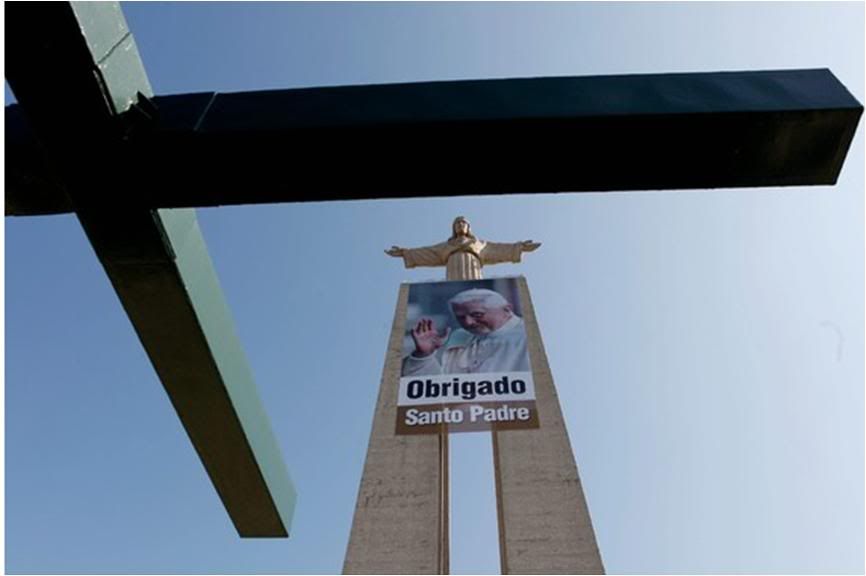 The building below, left, is the Apostolic Nunciature in Lisbon, where the Pope will be staying overnight.
The building below, left, is the Apostolic Nunciature in Lisbon, where the Pope will be staying overnight.
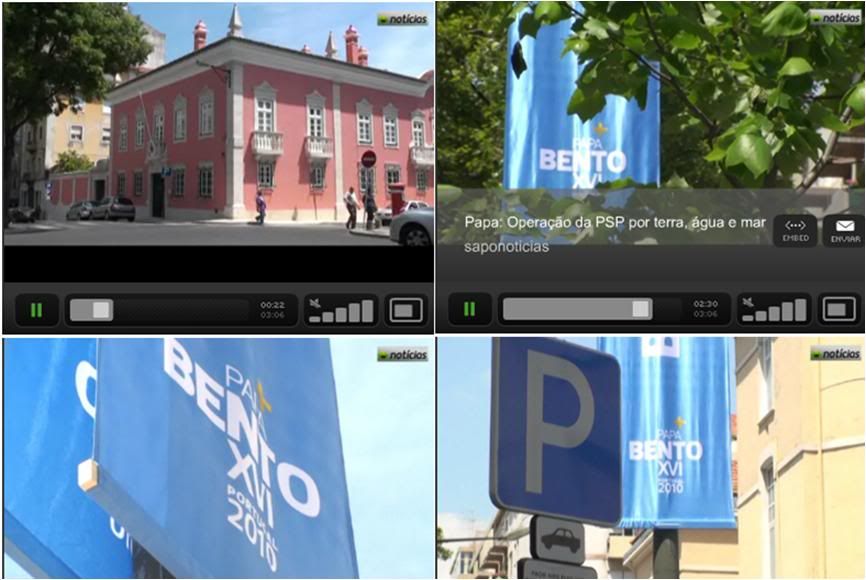
Below, the altar-stage for the Pope's Mass takes shape in Lisbon's Terreiro do Paco; and the artist's concept of it.

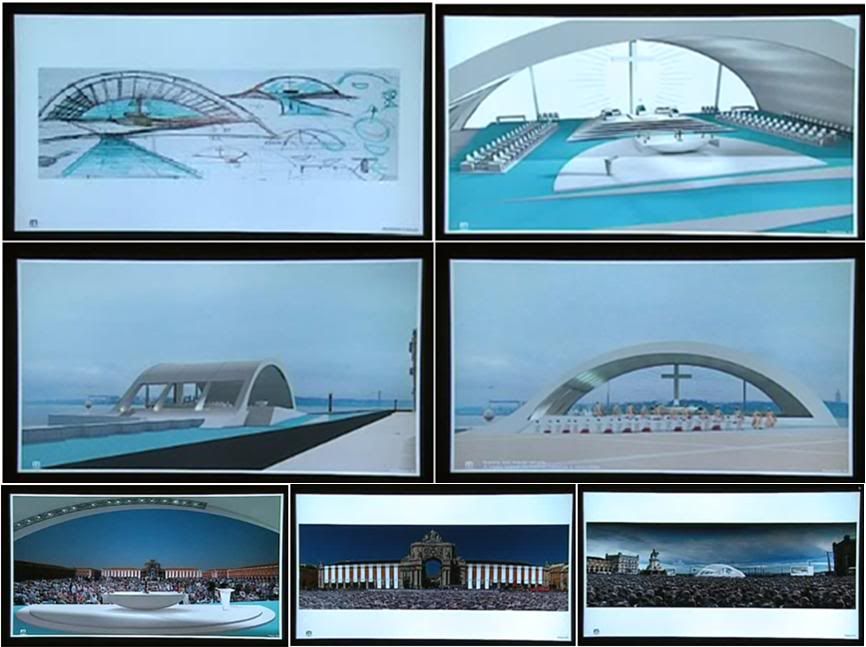
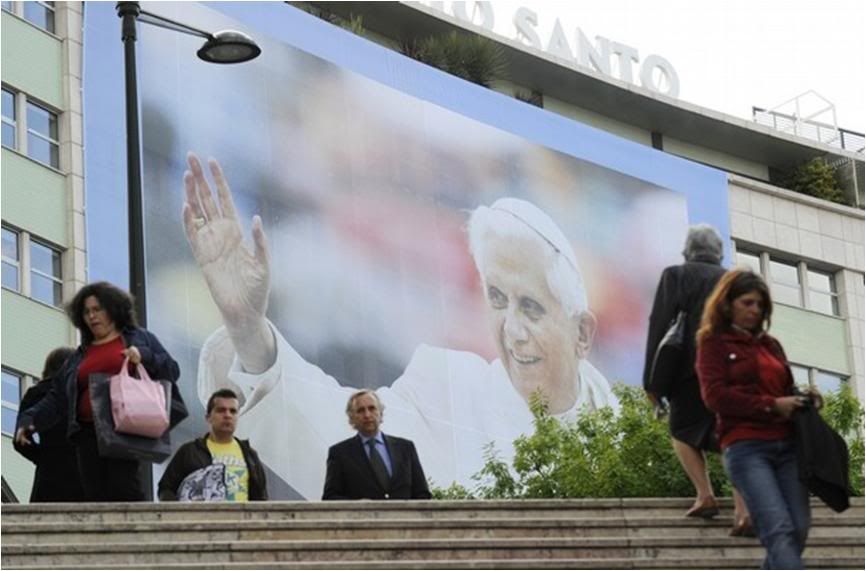
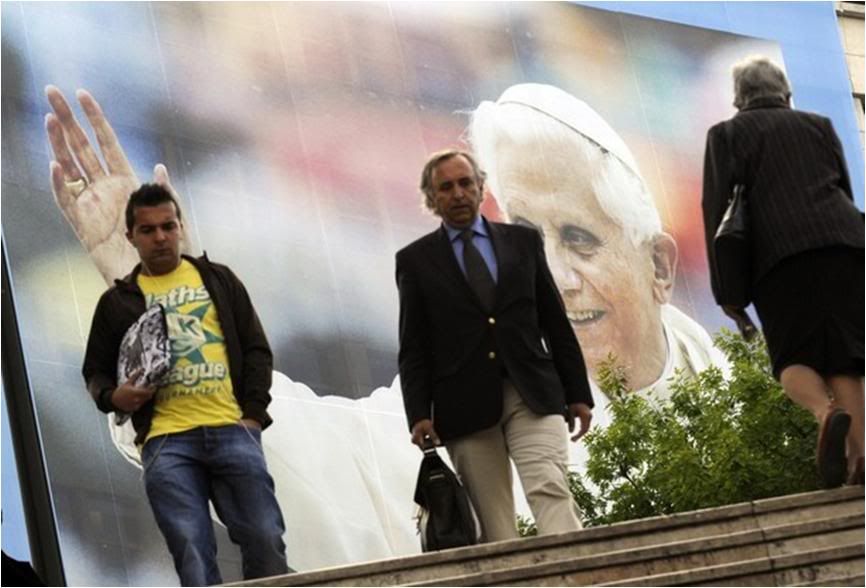
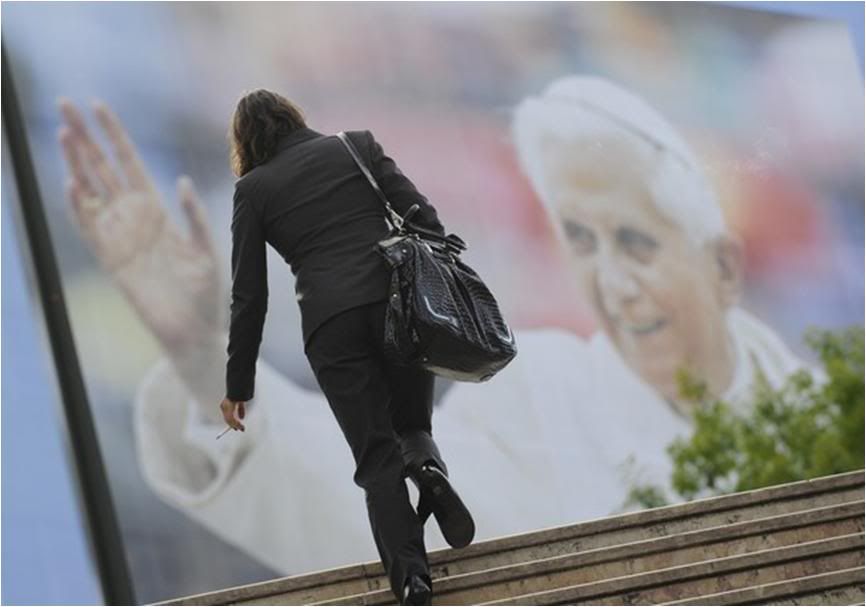
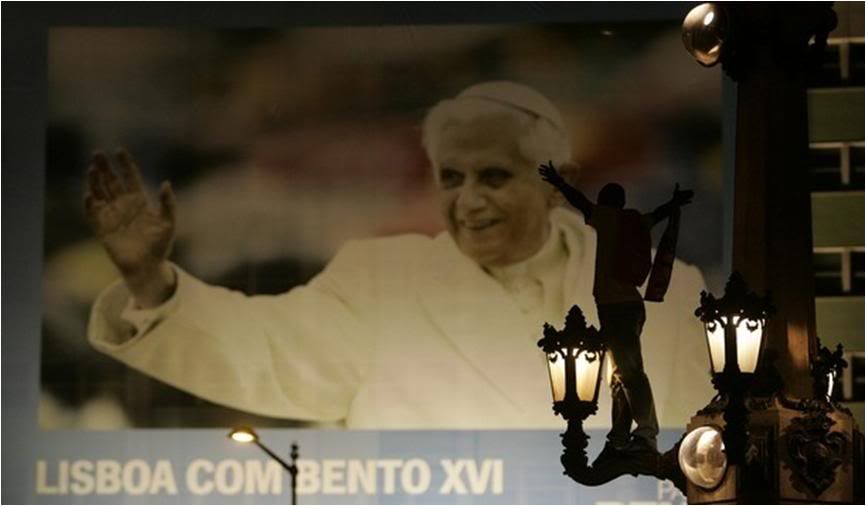
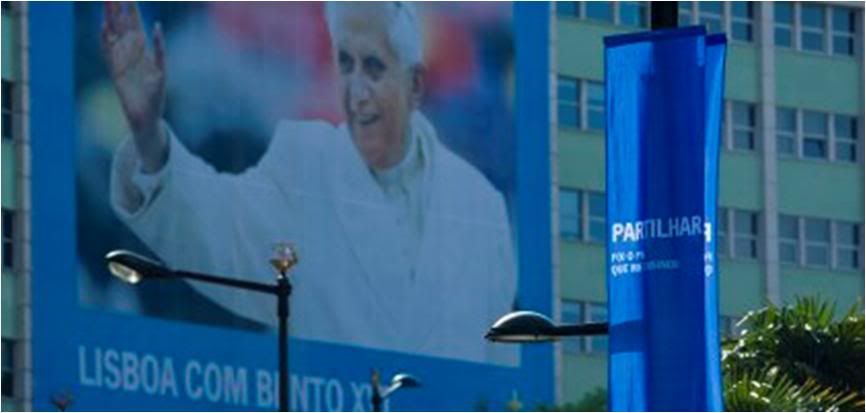 The Prada shoe on top of a cab is 'conceptual art' by a local woman artist.
The Prada shoe on top of a cab is 'conceptual art' by a local woman artist.
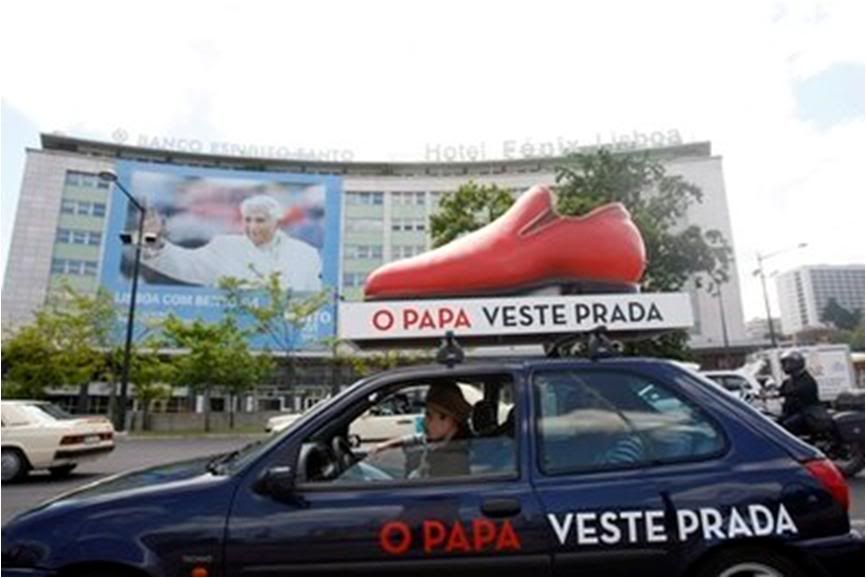
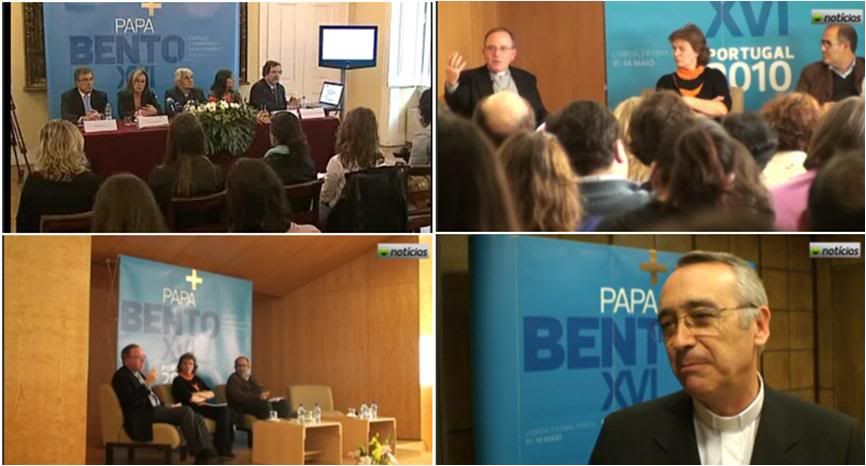
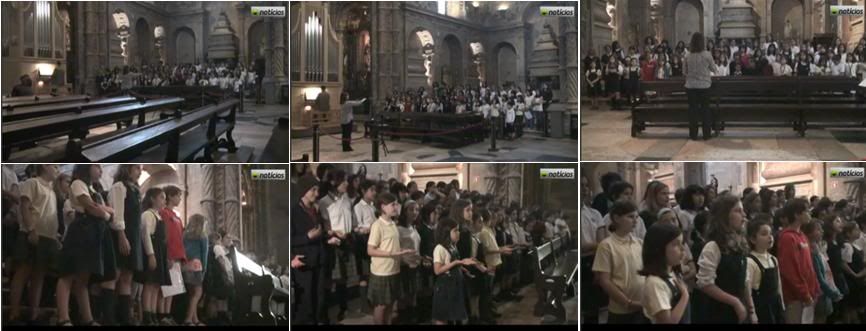 Above, children practice to welcome the Pope at the San Jeronimos monastery.
Above, children practice to welcome the Pope at the San Jeronimos monastery.
In Fatima:
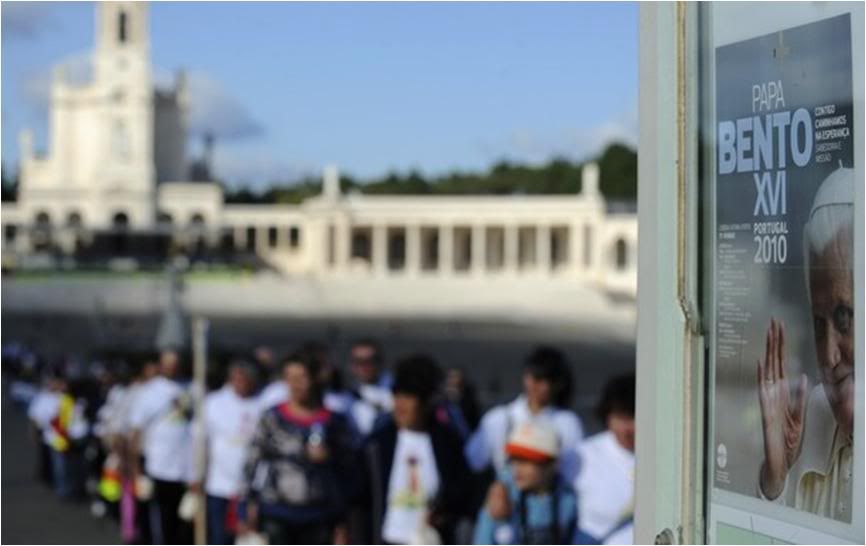
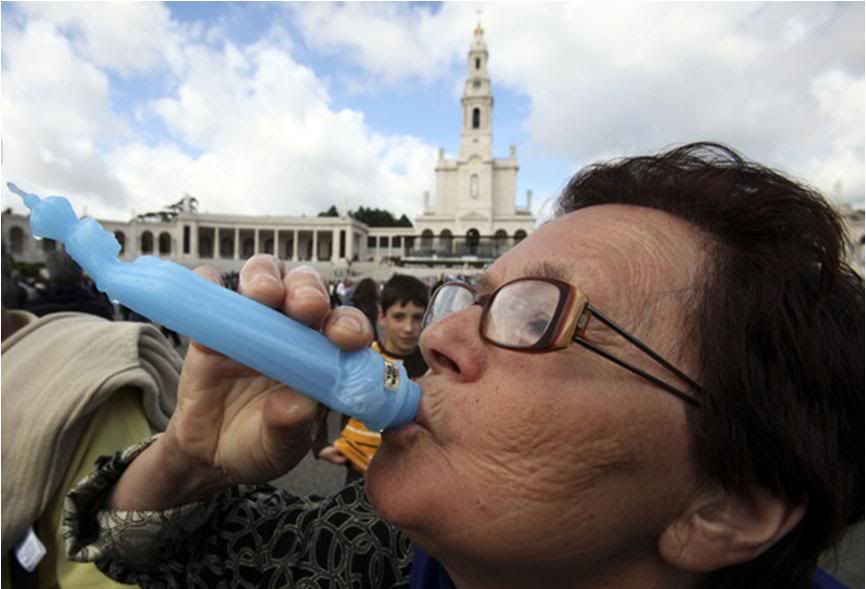
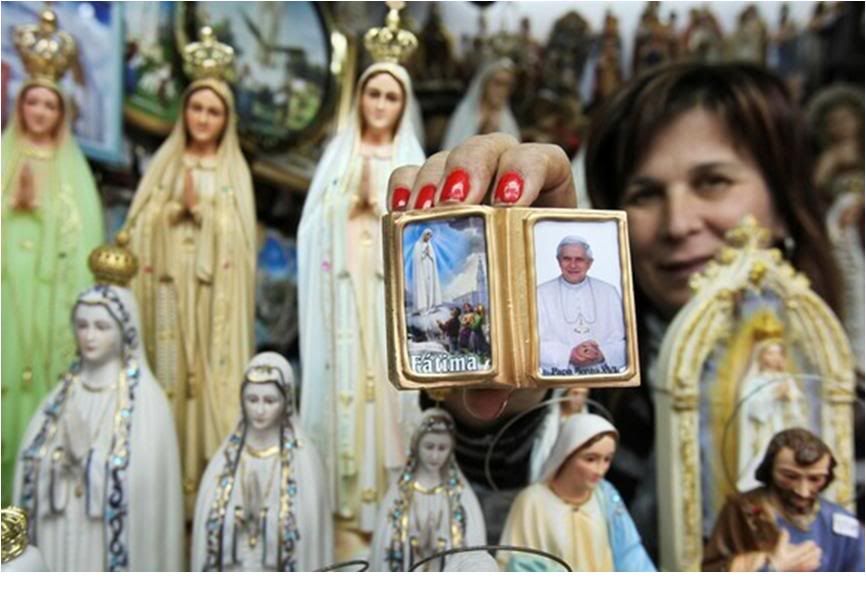 Pope begins Portugal visit
Pope begins Portugal visit

LISBON, May 11 (AFP) - Pope Benedict XVI begins a four-day trip to Portugal Tuesday in which he is likely to urge Lisbon to uphold Christian values and call for solidarity across Europe's struggling economies.
Tens of thousands of people in this overwhelmingly Catholic country lined the streets early to welcome the beleaguered Pontiff, whose five-year-old papacy has been rocked by allegations that the Vatican actively covered up years of child sex abuse by priests in several countries.
Carlos Azevedo, the auxiliary bishop of Lisbon and the visit's co-ordinator, said the Pope would instead focus on Europe's economic crisis, which along with Greece has hit Portugal hardest.
"The Pope will encourage institutions to lend a hand and show solidarity during difficult times," Azevedo said Monday.
"Europe needs to be awoken, there is a lack of strong values. If there was greater ethical conscience, we would not have arrived at the current economic disaster."

Civil servants in the capital have been given the afternoon off to attend an evening open-air mass with Benedict in an historic square on the banks of the Tagus. The organisers expect up to 160,000 people to attend.
"We are going to experience this as a celebration," said Catarina Vieira, 26, one of dozens of blue-uniformed scouts setting up chairs at the mass site.
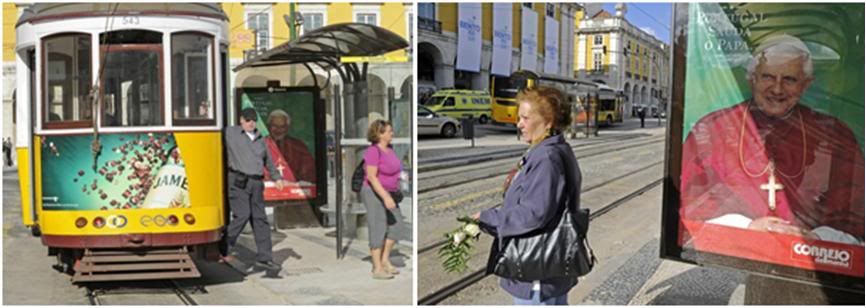
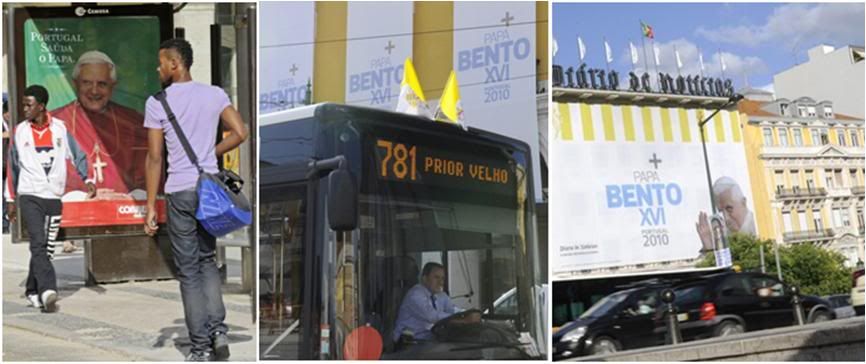 Extreme right: Streamer adorns facade of Diario de Noticias - can you imagine the New York Times ever doing anything like that?
Extreme right: Streamer adorns facade of Diario de Noticias - can you imagine the New York Times ever doing anything like that?
Lisbon's bus shelters were decorated with posters of the Pope with a red robe against a green backdrop to resemble the Portuguese flag, while the yellow and white Vatican banner fluttered on all public buses.
Hundreds of police deployed since dawn along the eight kilometre (five mile) route from the airport to the papal nunciature which Benedict will take aboard his white bullet-proof Popemobile. Letter boxes along the route have been taped over.
Ligia Aguilar, opening her souvenir shop on a sidestreet, defended Benedict.
"Just because this Pope has a certain personality doesn't mean that I will stop being a believer. I would go to mass with any pope that comes to Portugal," she said.
The Pontiff will be welcomed by President Anibal Cavaco Silva days before he is due to sign into law a bill passed by {arliament which would make Portugal the sixth country to allow same-sex marriage.
Later he is to pray in the chapel of the 16th century Jeronimos monastery, whose renowned religious carvings have made it a UNESCO World Heritage Site.
Tuesday evening's Mass is one of three giant gatherings scheduled for the visit, the "heart" of which, according to the Vatican, will be his stop in Fatima, the site where three shepherd children reported seeing visions of the Virgin Mary in 1917.
The Pope's visit to the sanctuary town comes exactly 10 years after his predecessor John Paul II beatified two of the children at the site, bringing them one step from sainthood.
A third open-air Mass is to be held in the northern city of Oporto on Friday, shortly before the Pope returns to Rome.
[Modificato da TERESA BENEDETTA 11/05/2010 14:37] |
| |
 11/05/2010 13:43 11/05/2010 13:43 |
|
| | | OFFLINE | | Post: 20.154
Post: 2.794 | Registrato il: 28/08/2005
Registrato il: 20/01/2009 | Administratore | Utente Veteran | |
|

APOSTOLIC VISIT OF HIS HOLINESS BENEDICT XVI
TO PORTUGAL
ON THE TENTH ANNIVERSARY OF THE BEATIFICATION OF
JACINTA AND FRANCISCO, THE SHEPHERD VISIONARIES OF FATIMA
May 11-14, 2010
P R O G R A M
Tuesday, May 11
ROME
08:50 - Leave Da Vinci international airport for Lisbon
LISBON
11:00 – Arrival at Portela international airport.
OFFICIAL WELCOME
- Address by the Holy Father.
12:45 - WELCOME CEREMONY, Monastery of Jeronimos
- Brief tour of the Monastery
13:30 - COURTESY VISIT to President Aníbal Cavaco Silva
Palacio de Belem
18:15 - HOLY MASS at Terreiro do Paço
- Homily
- Commemorative message on the 50th anniversary of the
Shrine of Christ the King in Almada
Wednesday, May 12
LISBON
07:30 - Private Mass at the Apostolic Nunciature, Lisbon
10:00 – MEETING WITH THE WORLD OF CULTURE, Centro Cultural de Belém
- Address by the Holy Father.
12:00 - MEETING WITH THE PRIME MINISTER, Apostolic Nunciature
15:45 - Leave the Nunciature for he International Airport
16:40 - Depart by helicopter for Fatima
FATIMA
17:10 - Arrive at Fatima Municipal Stadium
17:30 - VISIT TO THE CHAPEL OF APPARITIONS, Shrine of Our Lady of Fatima
- Prayer by the Holy Father
18:00 – VESPERS with priests, religious, seminarians and deacons,
Church of the Holy Trinity
- Address by the Holy Father
21:30 - BLESSING OF CANDLES for traditional candlelight procession
Esplanade of the Shrine of Our Lady
- Address by the Holy Father
RECITATION OF THE ROSARY, Chapel of Apparitions
Thursday, May 13
FATIMA
10:00 – HOLY MASS commemorating the anniversary of the Marian apparitions in 1917, Esplanade
- Homily by the Holy Father
- Multilingual greetings by the Holy Father
13:00 - Lunch with the Bishops of Portugal, Our Lady of Mt. Carmel House
17:00 - MEETING WITH MEMBERS OF PASTORAL AND SOCIAL ORGANIZATIONS,
Church of the Holy Trinity
- Address by the Holy Father
18:45 – MEETING WITH THE BISHOPS OF PORTUGAL, Our Lady of Mt. Carmel House
- Address by the Holy Father
Friday, May 14
FATIMA
08:00 – Leave Our Lady of Mt. Carmel House
08:40 - Depart Fatima by helicopter for Porto.
PORTO
09:30 - Arrive at the Serra do Pilar heliport, Gaia district
10:15 – HOLY MASS at Avenida dos Aliados.
- Homily
13:30 – DEPARTURE CEREMONY, Porto international airport
- Address by the Holy Father
14:00 – Depart for Rome on TAP, the Portuguese national airline
ROME
18:00 - Arrive at Ciampino airport
Portugal is one hour ahead of Rome.

 |
| |
 11/05/2010 14:01 11/05/2010 14:01 |
|
| | | OFFLINE | | Post: 20.155
Post: 2.795 | Registrato il: 28/08/2005
Registrato il: 20/01/2009 | Administratore | Utente Veteran | |
|


 Sorry to have to start out the reportage on the visit with an NYT report, but it's among the first and most comprehensive available in English:
Pope issues strongest words
Sorry to have to start out the reportage on the visit with an NYT report, but it's among the first and most comprehensive available in English:
Pope issues strongest words
to date on abuse
By RACHEL DONADIO

May 11, 2010
LISBON — In his strongest and most direct condemnation of the sexual abuse crisis that has swept the Catholic Church, Pope Benedict XVI on Tuesday said that the “sins inside the Church” posed the greatest threat to Catholicism, adding that “forgiveness does not substitute justice.”
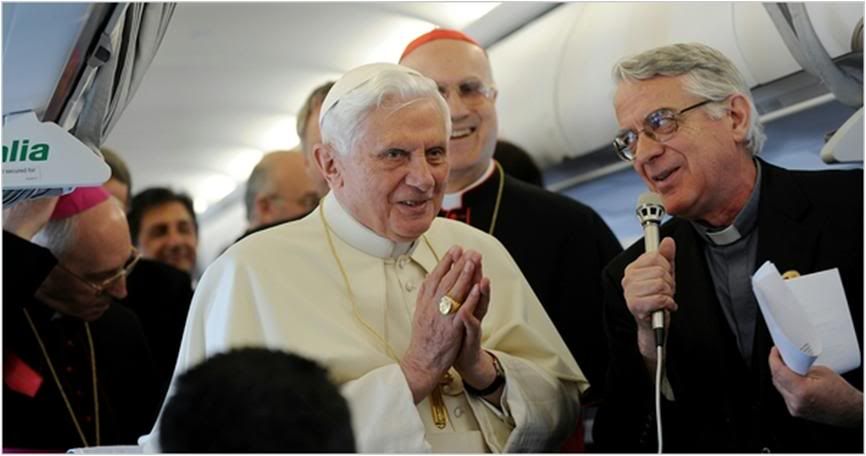
“Attacks on the Pope and the Church come not only from outside the Church, but the suffering of the Church comes from inside the Church, from sins that exist inside the Church. This we have always known but today we see it in a really terrifying way,” Benedict told reporters aboard his plane en route to Portugal.
“The biggest weight on the Church doesn’t come from the enemies outside, but is born from sin inside the Church,” he added. “The Church has a profound need to relearn penance, to accept purification, to learn on the one hand forgiveness but also the necessity of justice. And forgiveness does not substitute justice.”
In his remarks, Benedict appeared to distance himself from other Church officials who in recent weeks have criticized the media for focusing on the sex abuse crisis, which they called attacks on the Church. [Not at all! He is speaking as Pope, universal father and pastor. It is not for him to meet concrete attacks head on.
And now, the standard plug-in:]
In recent months, the scandal has underscored an ancient institution wrestling with modernity, bringing to light an internal culture clash between traditionalists who value protecting priests and bishops above all else, and those who seek more transparency.
The crisis has also raised questions about how Benedict handled sex abuse as prefect of the Vatican’s Congregation for the Doctrine of the Faith and as bishop in Munich in 1980 when a pedophile priest was moved to his diocese.
A traditionalist but also a strong voice within the church calling for purification, Benedict met privately with victims of sex abuse on a brief trip to Malta last month his third such meeting, and in March issued a strong letter to Irish Catholics reeling from reports of widespread sex abuse in Catholic institutions.
But his off-the-cuff remarks on Tuesday were his most direct since the crisis hit the church in Europe earlier this year.
On the plane, Benedict told reporters that the Church had to relearn “conversion, prayer, penance.”
The Pope landed in Lisbon on Tuesday for a four-day trip to Portugal aimed at underscoring several themes of his papacy: the threat posed by secularism in Europe, the dialectic between faith and reason, and the role of ethics in economics.
Portugal has been hard hit by the financial crisis and markets are jittery about its prospects of getting its debt and deficit under control. En route to Lisbon, Benedict told reporters that the financial crisis and the threat to the euro were an opportunity to reintroduce a “moral dimension” to economics.
“The events of the last two or three years have demonstrated that the ethical dimension must enter into economic activity,” Benedict said. “Now is the time to see that ethics is not something external but internal to economic rationality and pragmatism.”
In Portugal, Benedict is also expected to underscore the Church’s stance on social issues. A largely Catholic country, Portugal legalized abortion in 2008 and its Socialist majority Parliament approved a same-sex marriage bill earlier this year, which the president of Portugal has not yet signed into law.
On Wednesday, Benedict is expected to travel to the pilgrim shrine of Fátima on the tenth anniversary of the beatification of two of the three shepherd children who say they saw a vision of the Virgin Mary there in 1917. Pope John Paul II credited the Virgin of Fátima with saving him from death in an assassination attempt in 1981 on the anniversary of the apparition.
Tradition has it that the Virgin revealed three secrets to the Portuguese peasants, which the Vatican acknowledged in 1930. The first was a vision of hell; the second is said to have predicted World War II and warn of the collapse of communism, giving Fátima an anti-communist allure during the Cold war.
In 2000, Benedict, then Cardinal Joseph Ratzinger, the prefect for the Vatican’s doctrinal office, the Congregation for the Doctrine of the Faith, oversaw the Vatican’s revealing the famous third secret of Fátima after years in which its mystique had grown to cult status for some Catholics.
Disclosing the secret in 2000, Cardinal Angelo Sodano, then the Vatican secretary of state and now the dean of the College of Cardinals, said that the third vision was of a “bishop clothed in white,” the Pope, who makes his way through a field of martyrs, which the Vatican interpreted as prefiguring the assassination attempt on John Paul by the Turkish gunman Mehmet Ali Agca.
In his comments on Tuesday on the sex abuse crisis, Benedict said that the message of the Madonna of Fátima could be extended not only to the “suffering” of John Paul, and therefore of Popes, but also of the suffering of the entire Catholic Church.
Presenting the third secret in 2000, the future Pope said the images of Fátima were not to be taken literally, but rather “synthesize and compress against a single background facts which extend through time.” He added then that the apparitions at Fátima had a central message: “Penance, penance, penance.”
Pope says Church must recognise
"terrifying" truth of abuse
by Philip Pullella

LISBON, May 11 (Reuters) – Pope Benedict said on Tuesday the crisis of sexual abuse of children by priests should make the Church acknowledge the "terrifying" truth that its greatest threat comes from "sin within the Church".
In some of the most comprehensive public comments since the scandal broke two months ago, Benedict told reporters the Church has "a very deep need" to acknowledge that it must do penitence for its sins and "accept purification".
"Today we see in a truly terrifying way that the greatest persecution of the Church does not come from outside enemies but is born of sin within the Church," he told reporters on the plane taking him to Portugal, in response to a question about the sexual abuse scandal.
In recent weeks, a number of Vatican officials have accused the media of waging a smear campaign against the Church, with one top Vatican official going as far as dismissing reports of a cover up of sexual abuse as "petty gossip". [The herd line!]
The 83-year-old German Pontiff, facing the worst crisis of his five-year-old papacy, said the Church had to seek forgiveness from victims of sexual abuse but also recognized that "forgiveness cannot be a substitute for justice".
The main purpose of the Pope's four-day visit to Portugal is to visit the shrine at Fatima where the Madonna is said to have appeared to three shepherd children six times in 1917.
Pope says Church suffering
comes from within

LISBON, Portugal, May 11 (AFP) – Pope Benedict XVI referred to the paedophile priest scandal rocking the Catholic Church on his arrival in Portugal on Tuesday, saying the Church's "greatest persecution" came from its own "sin".
"Today the greatest persecution of the Church does not come from outside, but from the sin inside the Church itself," the pope told journalists aboard his plane on the flight from Rome.
Allegations that it for years protected paedophile priests from prosecution in several European countries and in the United States has overshadowed preparations for his four-day visit to overwhelmingly Catholic Portugal. ['Overshadowed'? Only in the minds of MSM outside Portugal, it seems! Because they want it to overshadow everything about this Papacy!]
Wearing an ivory robe with a golden crucifix around his neck, a tired-looking Benedict, 83, walked gingerly down the gangway steps to be welcomed by Portugal's President Anibal Cavaco Silva and his wife Maria.
The President welcomed the Pope to a "free and plural Portugal" whose people, he said, have "a calling to recognize the value of diversity".
The centre-right President is due to decide next week whether to sign into law a bill passed by Parliament which would make Portugal the sixth country to allow same-sex marriage.
Church authorities in Portugal said Benedict was likely to call on Portugal to uphold Christian values and urge solidarity across Europe's struggling economies.
[Modificato da TERESA BENEDETTA 15/05/2010 02:54] |
| |
 11/05/2010 17:03 11/05/2010 17:03 |
|
| | | OFFLINE | | Post: 20.157
Post: 2.797 | Registrato il: 28/08/2005
Registrato il: 20/01/2009 | Administratore | Utente Veteran | |
|
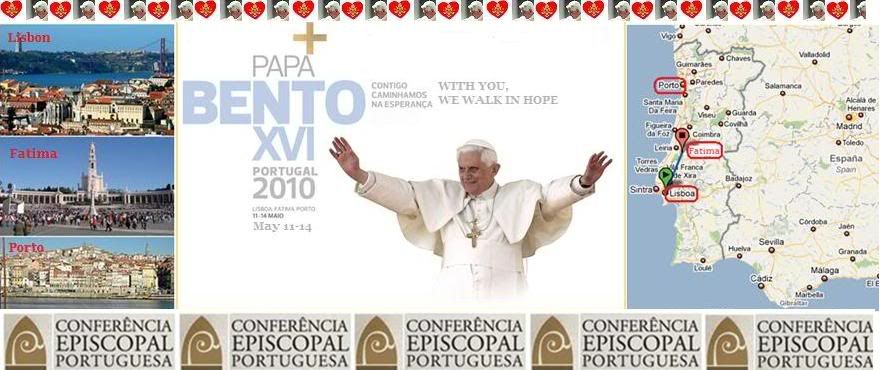 ARRIVAL IN LISBON
ARRIVAL IN LISBON
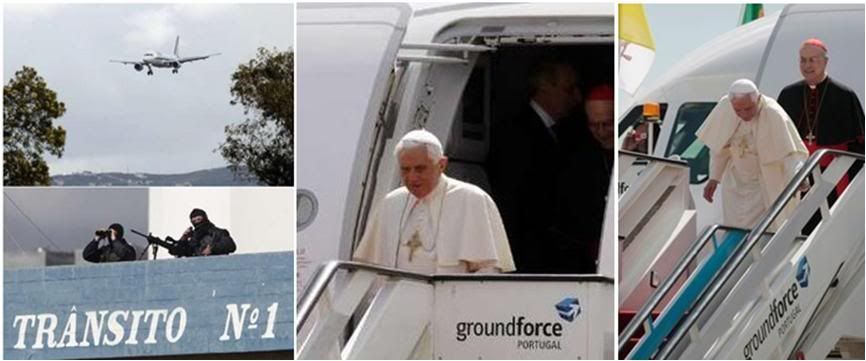
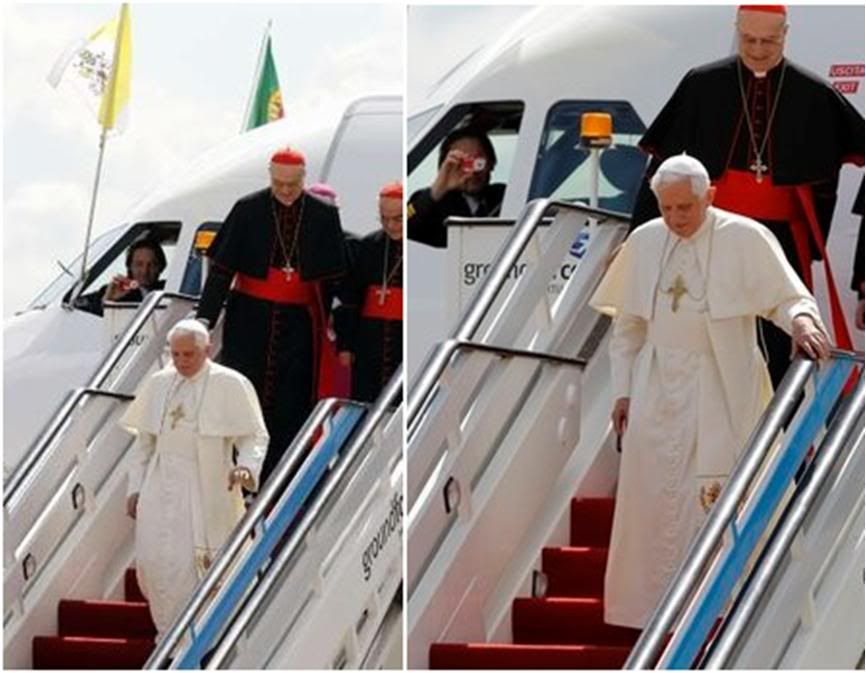 The Pope begins his visit
The Pope begins his visit

(11 May 10 – RV) Atlantic skies and the sun shining as a 32-member children’s choir from the prestigious Lisbon Academy of Saint Cecilia sang the hallmark hymn marking this journey to welcome Benedict XVI on Portuguese soil for the first time , as Roman Pontiff .
'Bem vindo Santo Padre , Bem vindo in Portugal' the children sang, while the President of the Republic Anibal Cavaco da Silva and his wife stood by together with the Patriarch of Lisbon Cardinal Jose da Cruz Policarpo.
And there were speeches, beginning with the welcoming party, the President who welcomed the Pope at the start of this journey rife with meaning for Portugal describing him as a “messenger of hope at a time of uncertainty”.
“You cannot understand Portugal,” he stressed, “without that privileged relationship with the Holy See recalling how in the year 1079 the Pope of the time, Alexander III recognized the new State of Portugal”.
And the Roman Pontiff replied, greeting all the Portuguese people, whatever their faith or religion at a historic time for this beloved and ancient nation which this year is celebration the centenary of the proclamation of the Republic.
“I come,” he said, “as a pilgrim to Our lady of Fatima”, referring to the apparitions which took place in the Marian shrine almost a century ago, describing this moment as “a window of hope that God opens when a man closes the door to him”.
This Apostolic visit has two levels of interest - first of all, Marian devotion in continuity with the Successors of Peter, Paul VI first, and then John Paul II who all travelled to Fatima on the date of the Apparitions there, always on the 13th May, the date when Our Lady appeared to three little shepherd children for the first time .
In Fatima they refer to this continuity with the papacy by calling Benedict XVI “o terceiro papa”, the third Pope of Fatima.
The third Pope who in turn in his speech referred to the words of an eminent Portuguese cardinal from the Salazar era who once remarked “it was not the Church that imposed Fatima but it was Fatima that imposed itself on the Church” .
But it was the second level of interest, the more official one, that the Holy Father then highlighted picking up on the President’s mention of the special historical connection between Portugal and the Successor of Peter, noting as the President of Portugal had mentioned in his welcome address how “the people of this nation have since the earliest days of their nationhood looked to the Successor of Peter for recognition of their existence as a people”.
“This visit is under the sign of hope,” he said, “intended as a proposal of wisdom and mission”, a reference to the theme the Bishop’s of Portugal suggested for this visit .Pope Benedict went on to explain how “from a wise vision of life and of the world the just ordering follows”.
Benedict XVI then placed the Church in a historical context, pointing out its openness to cooperating “with anyone who does not marginalize or reduce to the private sphere the essential consideration of the human meaning of life”.
The point at issue he insisted “is not an ethical confrontation between a secular and a religious system, so much as a question about the meaning that we give to freedom” .
The brief arrival was a foretaste of the more official ceremony to take place later in the morning at the Mosterio du Jeronimos, a place relating to explorers and evangelisers, steeped in symbolism and beauty relating to the powerhouse of European exploration .
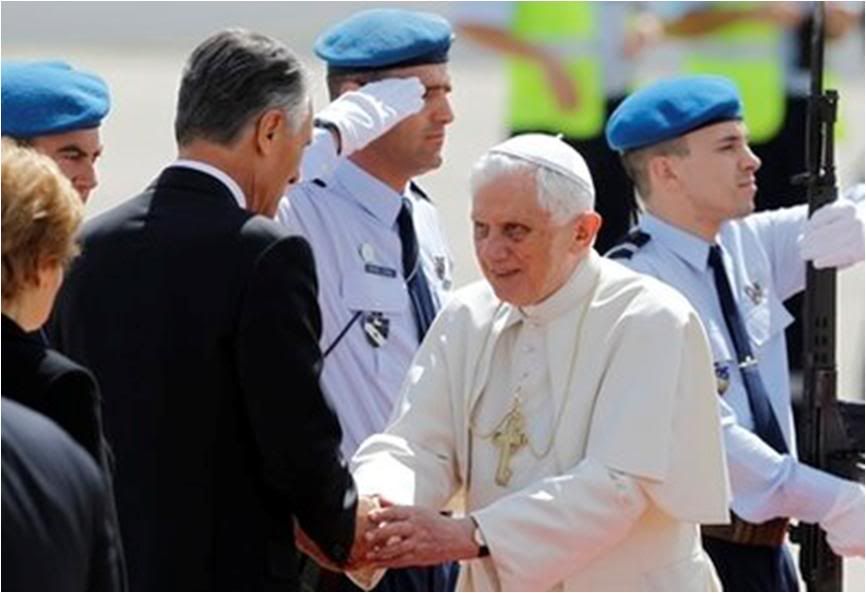
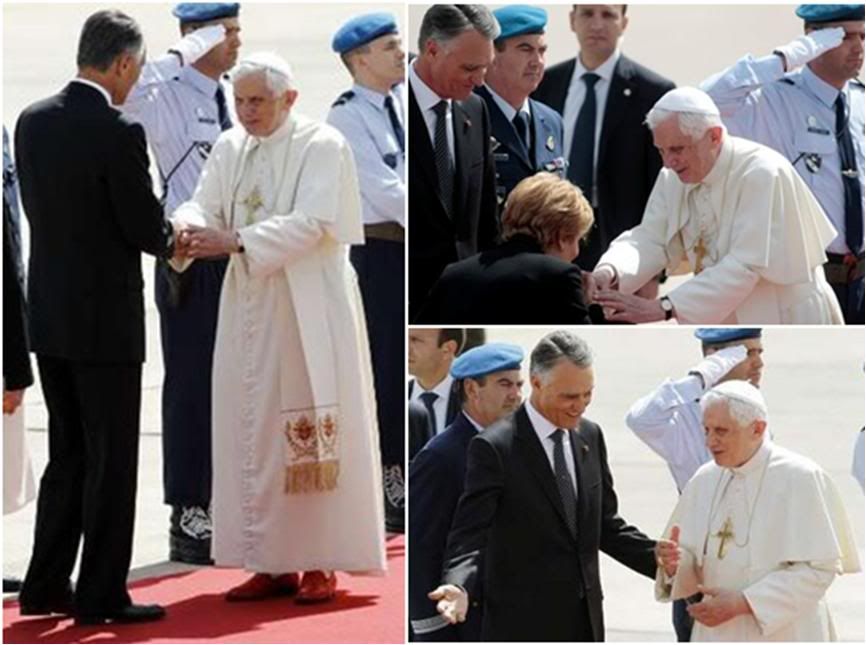
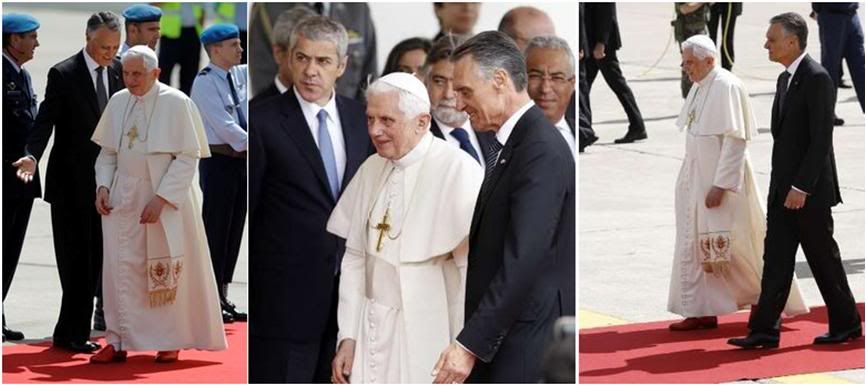
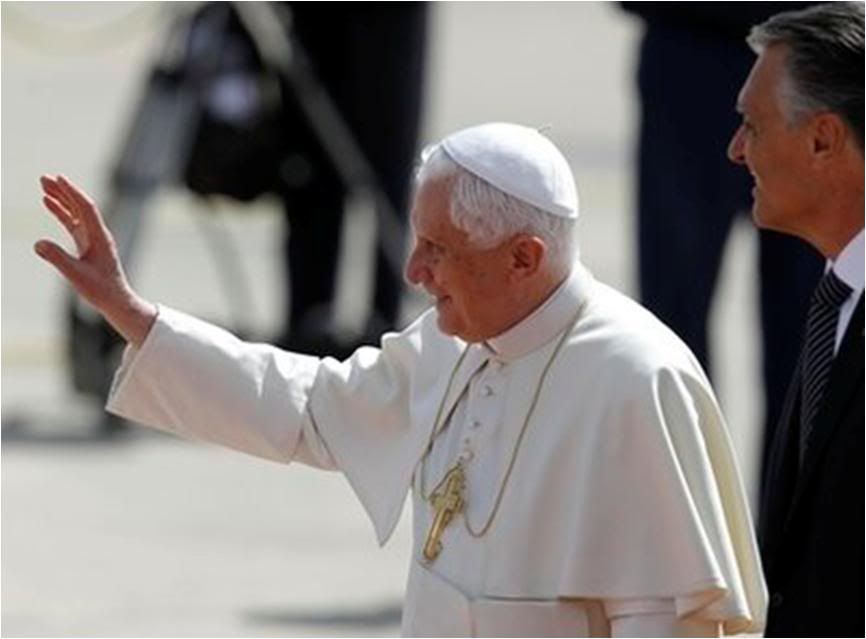

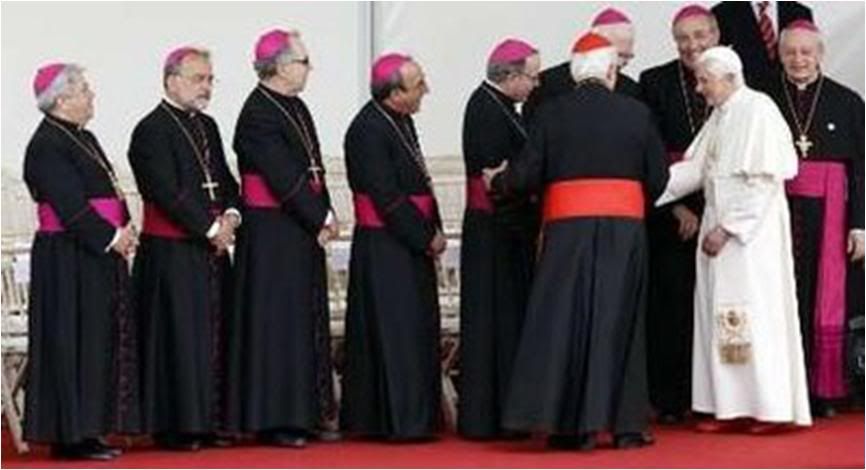
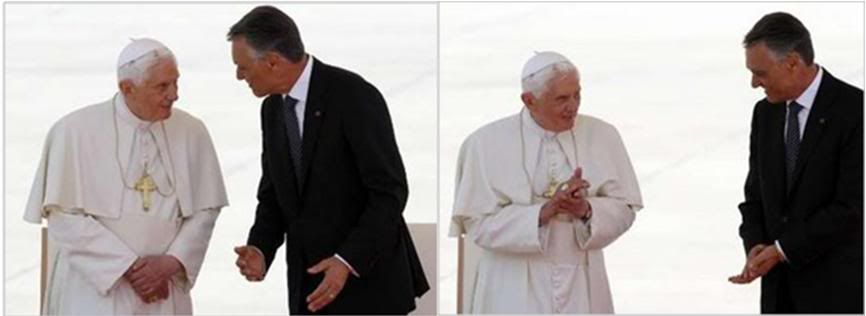
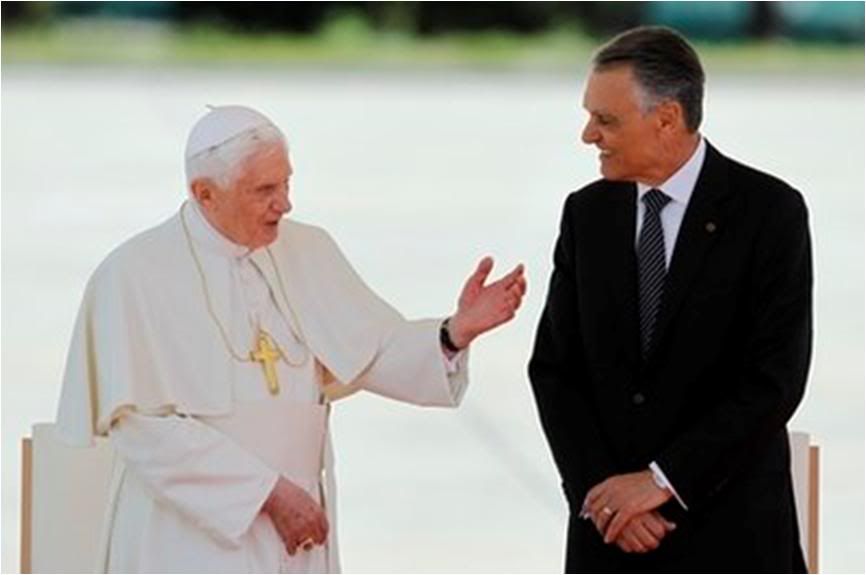
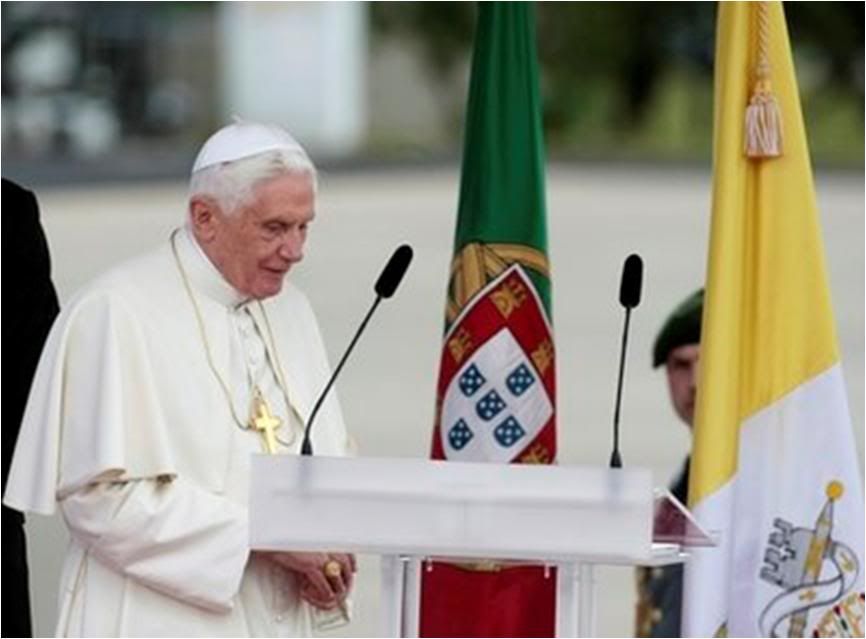 Here is the full text of the Holy Father's arrival address:
Here is the full text of the Holy Father's arrival address:
Mr President,
Distinguished Authorities,
Dear Brother Bishops,
Ladies and Gentlemen,
Only now has it been possible for me to accept the kind invitations of the President and my Brother Bishops to visit this beloved and ancient Nation, which this year is celebrating the centenary of the proclamation of the Republic.
As I set foot on Portuguese soil for the first time since Divine Providence called me to the See of Peter, I feel greatly honoured and I am moved to gratitude by the respectful and hospitable presence of all of you.
I thank you, Mr President, for your kind words of welcome, giving voice to the sentiments and the hopes of the beloved Portuguese people.
To all, whatever their faith or religion, I extend a greeting in friendship, especially to those who were unable to be here to meet me. I come as a pilgrim to Our Lady of Fatima, having received from on high the mission to strengthen my brothers as they advance along their pilgrim journey to heaven.
Since the earliest days of their nationhood, the Portuguese people have looked to the Successor of Peter for recognition of their existence as a Nation; in due course, one of my predecessors was to honour Portugal, in the person of its King, with the title “most faithful” (cf. Pius II, Bull Dum Tuam, 25 January 1460), for long and distinguished service to the cause of the Gospel.
As for the event that took place 93 years ago, when heaven itself was opened over Portugal – like a window of hope that God opens when man closes the door to him – in order to refashion, within the human family, the bonds of fraternal solidarity based on the mutual recognition of the one Father, this was a loving design from God; it does not depend on the Pope, nor on any other ecclesial authority: “It was not the Church that imposed Fatima”, as Cardinal Manuel Cerejeira of blessed memory used to say, “but it was Fatima that imposed itself on the Church.”
The Virgin Mary came from heaven to remind us of Gospel truths that constitute for humanity – so lacking in love and without hope for salvation – the source of hope.
To be sure, this hope has as its primary and radical dimension not the horizontal relation, but the vertical and transcendental one. The relationship with God is constitutive of the human being, who was created and ordered towards God; he seeks truth by means of his cognitive processes, he tends towards the good in the sphere of volition, and he is attracted by beauty in the aesthetic dimension.
Consciousness is Christian to the degree to which it opens itself to the fullness of life and wisdom that we find in Jesus Christ. The visit that I am now beginning under the sign of hope is intended as a proposal of wisdom and mission.
From a wise vision of life and of the world, the just ordering of society follows. Situated within history, the Church is open to cooperating with anyone who does not marginalize or reduce to the private sphere the essential consideration of the human meaning of life.
The point at issue is not an ethical confrontation between a secular and a religious system, so much as a question about the meaning that we give to our freedom. What matters is the value attributed to the problem of meaning and its implication in public life.
By separating Church and State, the Republican revolution which took place 100 years ago in Portugal, opened up a new area of freedom for the Church, to which the two concordats of 1940 and 2004 would give shape, in cultural settings and ecclesial perspectives profoundly marked by rapid change.
For the most part, the sufferings caused by these transformations have been faced with courage. Living amid a plurality of value systems and ethical outlooks requires a journey to the core of one’s being and to the nucleus of Christianity so as to reinforce the quality of one’s witness to the point of sanctity, and to find mission paths that lead even to the radical choice of martyrdom.
Dear Portuguese brothers and sisters, my friends, I thank you once more for your cordial welcome. May God bless those who are here and all the inhabitants of this noble and beloved Nation, which I entrust to Our Lady of Fatima, the sublime image of God’s love embracing all as children.
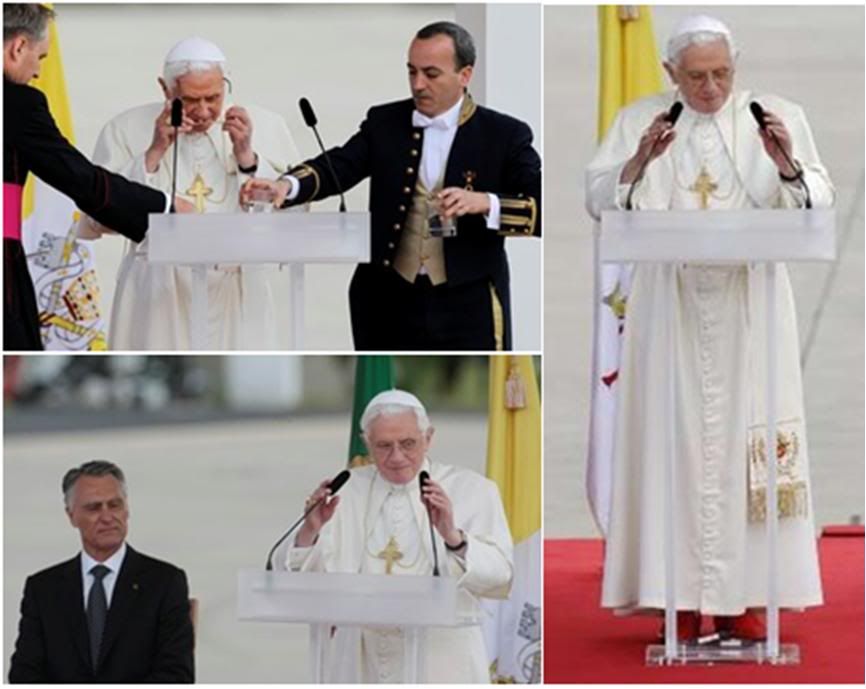
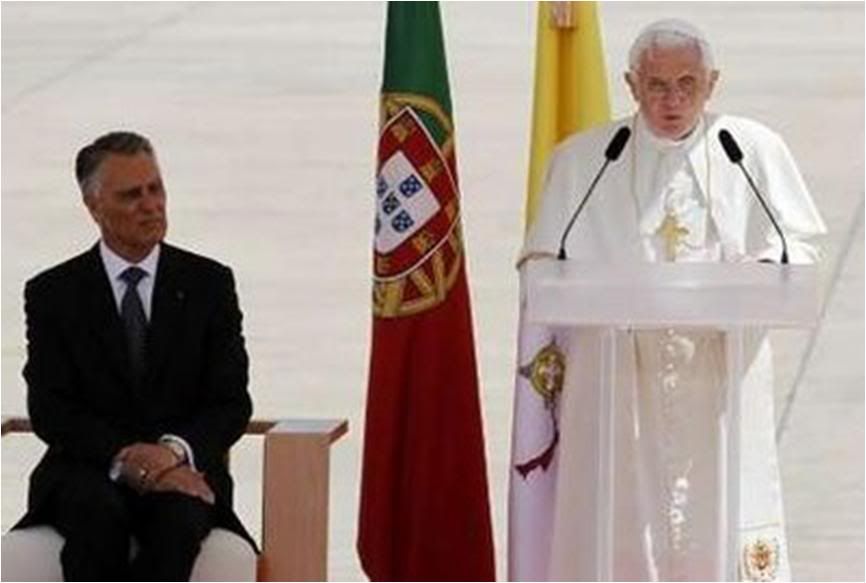
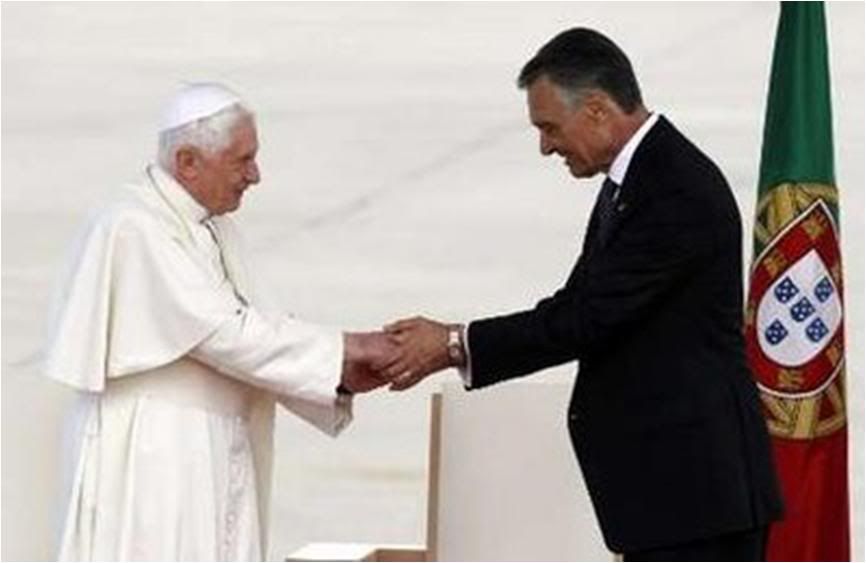
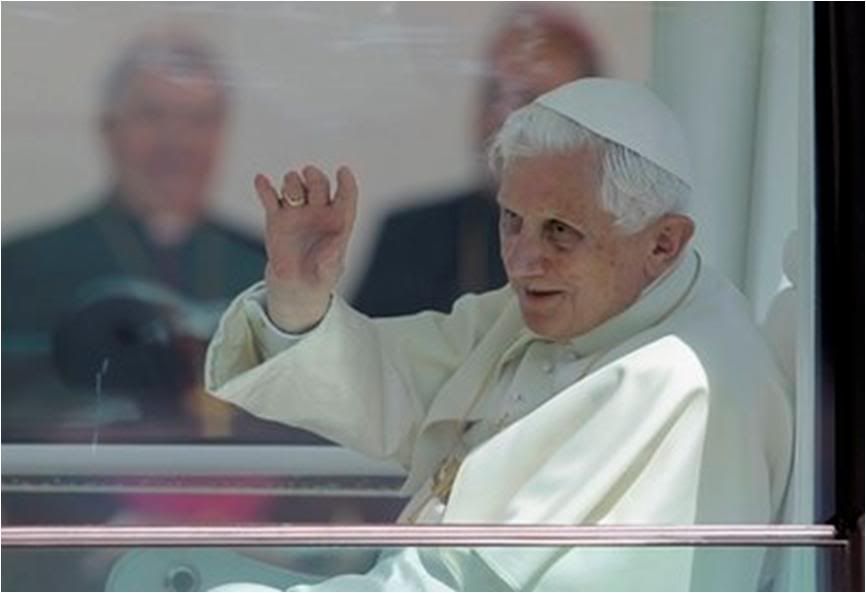
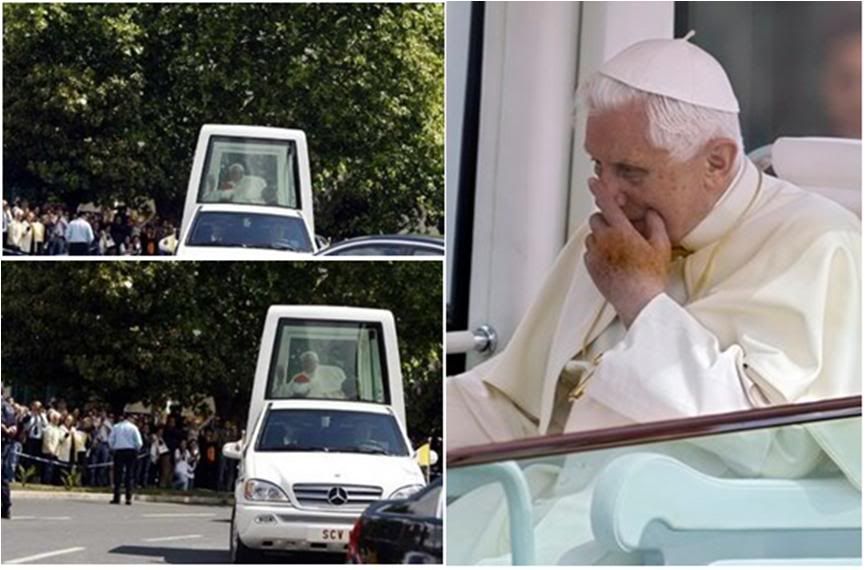
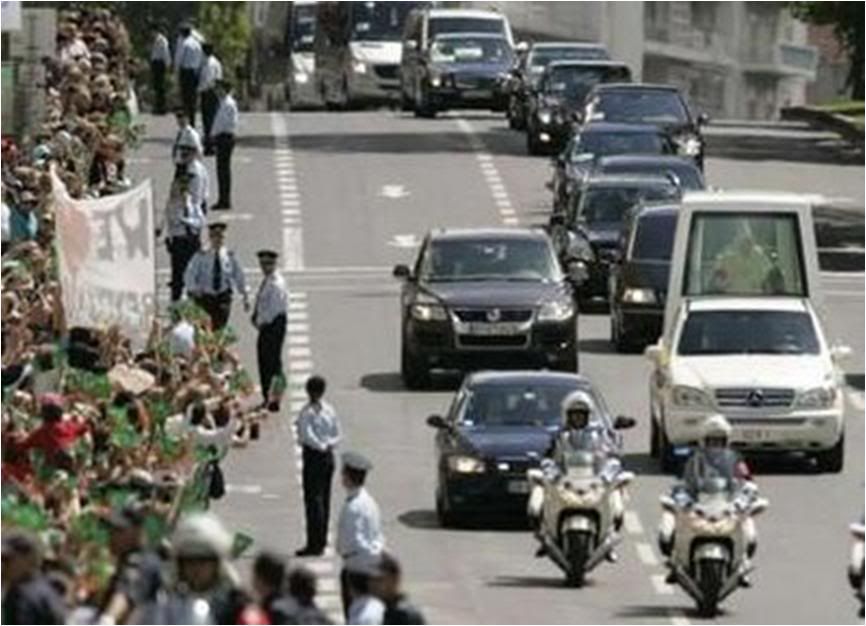
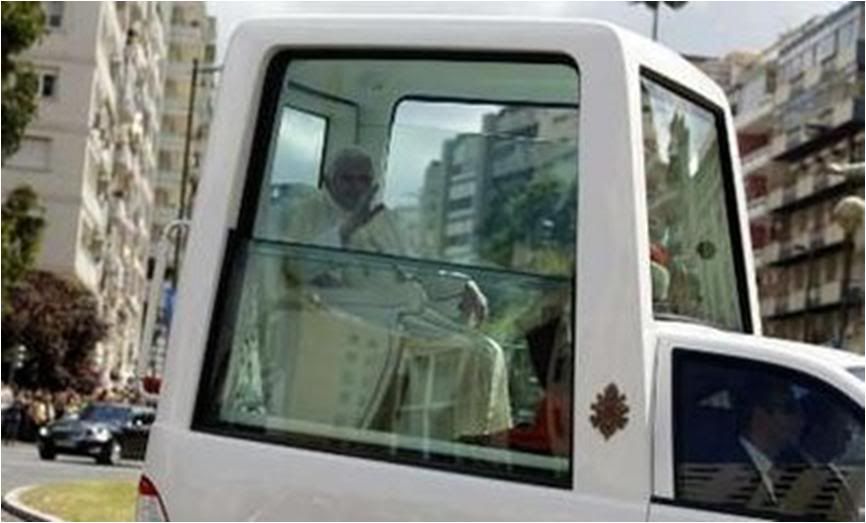
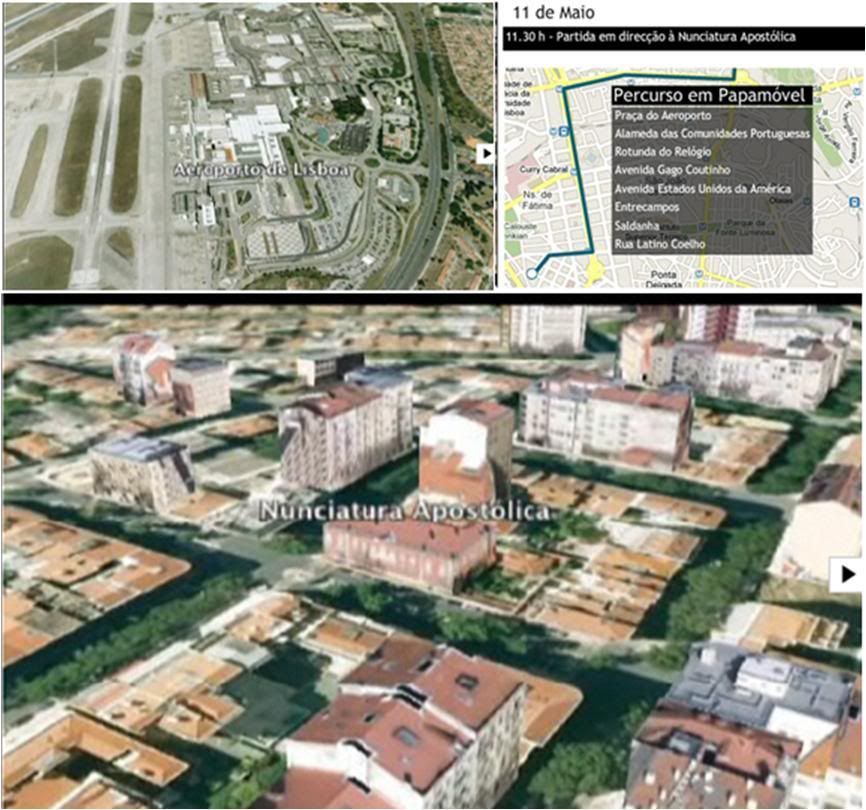
[Modificato da TERESA BENEDETTA 11/05/2010 17:17] |
| |
 11/05/2010 18:53 11/05/2010 18:53 |
|
| | | OFFLINE | | Post: 20.158
Post: 2.798 | Registrato il: 28/08/2005
Registrato il: 20/01/2009 | Administratore | Utente Veteran | |
|
 Vatican Radio has now released an English translation of what the Holy Father said during the flight to Lisbon today... One immediately sees that the reports based on the inflight news conference chose only to quote what he had said about the problem of priest offenders - ignoring the first two questions which the Holy Father answered off the cuff with a historical and philosophical overview that is characteristic of him...
Vatican Radio has now released an English translation of what the Holy Father said during the flight to Lisbon today... One immediately sees that the reports based on the inflight news conference chose only to quote what he had said about the problem of priest offenders - ignoring the first two questions which the Holy Father answered off the cuff with a historical and philosophical overview that is characteristic of him...
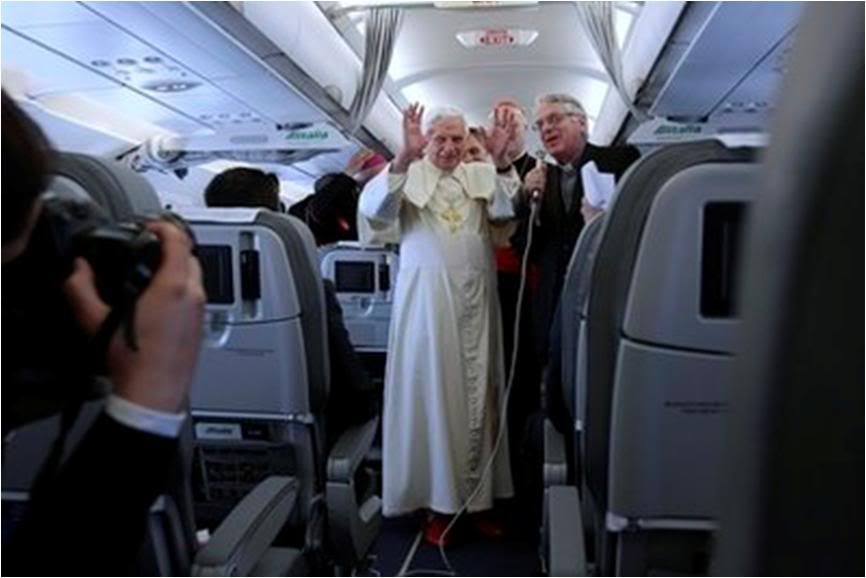 IN HIS OWN WORDS:
IN HIS OWN WORDS:
What the Pope said inflight today
i601.photobucket.com/albums/tt96/MARITER_7/RV-NEW.jpg
(11 May 10 – RV) Forgiveness is no substitute for justice when it comes to resolving the scandal of the sexual abuse of minors by clergy.
This was Pope Benedict’s answer to journalists today, during the traditional mid-flight press conference on his way to Portugal.
Here is the English translation of the transcript of that brief news conference:
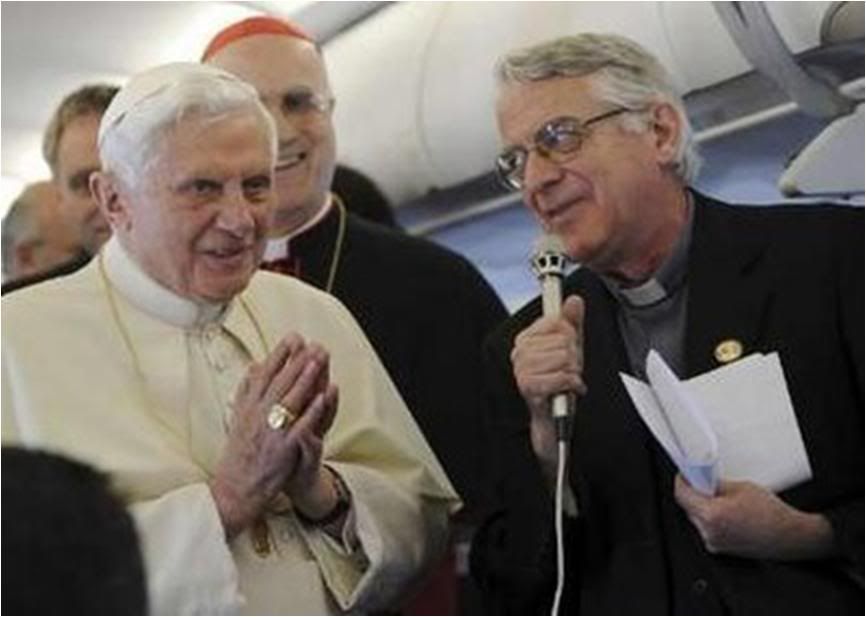 What message will you bring to Portugal, a deeply Catholic country in the past, and a bearer of faith in the secular world of today. How can the faith be announced in a context which is indifferent, and sometimes hostile, to the church?
What message will you bring to Portugal, a deeply Catholic country in the past, and a bearer of faith in the secular world of today. How can the faith be announced in a context which is indifferent, and sometimes hostile, to the church?
First of all, good morning to all of you. I hope we will all have a good trip, despite the famous ash cloud which we are above right now.
In terms of Portugal, first of all I have feelings of joy and gratitude for everything this country has done and is doing in the world and in history, the deep humanity of this people which I have come to know through a past visit and so many Portuguese friends.
I would say it is true that Portugal has been a great force for the Catholic faith, and it has carried that faith to every part of the world.
A courageous, intelligent, creative faith, it has known how to create great cultures, we see this in Brazil, in Portugal itself, but also the presence of the Portuguese spirit in Africa and Asia.
On the other hand, this presence of secularism is not entirely new. The dialectic between secularism and faith has a long history in Portugal. By the seventeenth century, there was already a strong current of the Enlightenment. We need only think of names such as Pombal.
In these centuries, Portugal lived this dialectic which today naturally has been radicalized and is reflected in all of the signs of the current European spirit.
This seems to me a challenge, but also a great possibility. In these centuries, the dialectic between the Enlightenment, secularism and faith always had people who wanted to build bridges and to create a dialogue. Unfortunately, the dominant tendency was to see a contradiction and to see one as excluding the other.
Today we can see this is false. We have to find a synthesis and be able to dialogue. In the multi-cultural situation we’re all in, it’s clear that a European culture which aims to be solely rationalist, without any sense of the transcendent dimension, would not be in a position to dialogue with the other great cultures of humanity – all of which have this sense of the transcendent dimension, which is a dimension of the human person.
To think that there’s a pure reason, even a historic reason, which exists entirely in itself, is an error, and we are discovering this more and more. It touches only a part of the human person expressed in a given historic situation, and is not reason as such.
Reason as such is open to transcendence, and only in the meeting between transcendent reality, faith and history is human life fully realized.
I think the mission of Europe in this situation is to find a path to this dialogue, to integrate faith, rationality, and modernity in a single anthropological vision of the concrete human person and render that vision for the future of humanity.
For that reason, I think the task and mission of Europe in this situation is to find this dialogue, to integrate faith and reason in a single modern anthropological vision of the concrete human person and thus also render it communicable to other human cultures.
So I would say that the presence of secularism is a normal thing, but the separation, the opposition between faith and secularism is anomalous. The great challenge of this moment is that the two meet, so they may find their true identity. It is a mission for Europe and a human necessity in our time.
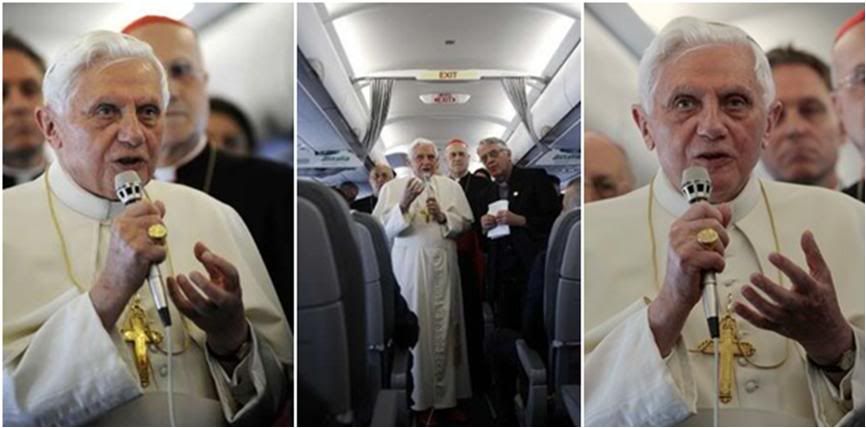
Thank you, Holy Father. Continuing on the theme of Europe, the economic crisis has recently gotten a lot worse in Europe, especially in Portugal. Some European leaders think the future of the European Union is at risk. What lessons should we learn from this crisis, including at the ethical and moral level? What are the keys for consolidating the unity and cooperation of the European nations in the future?
I would say that this economic crisis, with its undeniable moral component, is a case of applying and making concrete what I said earlier, that is of two separate cultural currents meeting, otherwise we will not find a path to the future.
Here, too, I believe there is a false dualism. There is an economic positivism that thinks it is possible to realize itself without an ethical component, a market that regulates itself according to its own economic strength, by a positivistic and pragmatic reasoning of the economy. Ethics is something different, something extraneous.
In reality, we can see today that a pure economic pragmatism which ignores the reality of the human person, who is inherently ethical, has no positive ending, but creates irresolvable problems. This is the moment to recognize that ethics is not something exterior, but rather interior to all forms of rationality, including economic reason.
On the other hand, we also have to confess the Catholic-Christian faith often has been overly individualistic. It left the concrete things of the economy to the world, thinking only of individual salvation and its religious aspects, without recognizing that these imply a global responsibility and a responsibility for the world. So here too we must enter into a concrete dialogue.
I tried to do as much in my encyclical Caritas in veritate, and the whole tradition of the social teaching of the church moves in this sense, broadening the ethical aspect of the faith from the individual to a responsibility for the world, to a reason that is perforated by ethics.
On the other hand the most recent events on the markets, in the last two or three years, have amply shown us that the ethical dimension is an internal one and that it must enter into economic action, because man is an one. A healthy anthropology that takes everything into account. Only in this way will we solve the problem. Only in this way will Europe deliver and succeed in its mission.
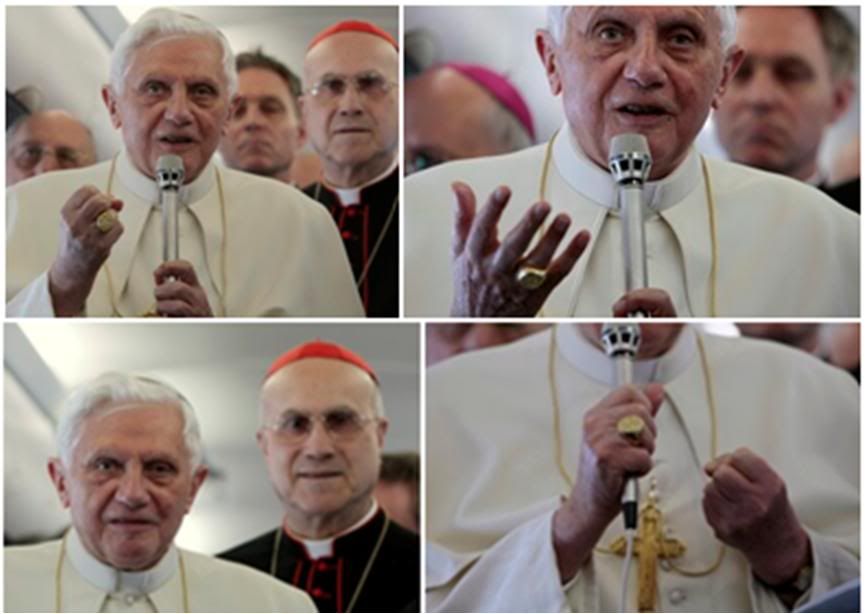
Thank you. Now we come to Fatima, which will be the spiritual culmination of this trip. Holy Father, what meaning do the apparitions of Fatima have for us today? When you presented the Third Secret of Fatima in a press conference at the Vatican Press Office in June 2000, many of us and other colleagues asked if the message of the secret could be extended, beyond the assassination attempt against John Paul II to other sufferings of the popes. Could the context of that vision also be extended to the suffering of the church today,for the sins of the sexual abuse of minors?
First of all, I want to express my joy to go to Fatima, to pray before Our Lady of Fatima, and to experience the presence of the faith there, where from the little ones a new force of the faith was born, and which is not limited to the little ones, but has a message for the whole world and all epochs of history, and touches history in its present and illuminates this history.
In 2000, during the presentation, I said there is a supernatural impulse which does not come from the individual imagination but from the reality of the Virgin Mary, from the supernatural, that impulse which enters into a subject, and is expressed according to the possibilities of the subject.
The subject is determined by his or her historic, personal, temperamental, situation. Therefore, supernatural impulse is translated according to the subject’s possibilities to see, imagine or express it.
But in these expressions, formed by the subject, a content is hidden, that goes beyond, goes deeper. Only in the passage of time is the true depth, that was clothed in this vision, revealed to us, only then is it possible for concrete people.
Here too, beyond this great vision of the suffering Pope, which we can initially circumscribe to John Paul II, other realities are indicated which over time will develop and become clear.
Thus it is true that beyond the moment indicated in the vision, one speaks about and sees the necessity of suffering by the Church, which is focused on the person of the Pope, but the Pope stands for the church, and therefore sufferings of the Church are announced.
The Lord told us that the Church will always be suffering in various ways, up to the end of the world. The important point is that the message, the answer of Fatima, it not substantially addressed to particular devotions, but is the fundamental response: permanent conversion, penance, prayer, and the three cardinal virtues: faith, hope and charity.
Here we see the true, fundamental response the Church must give, which each of us individually must give, in this situation.
In terms of what we today can discover in this message, attacks against the Pope or the Church do not only come from outside; rather the sufferings of the Church come from within, from the sins that exist in the Church.
This too has always been known, but today we see it in a really terrifying way: the greatest persecution of the Church does not come from enemies on the outside, but is born from the sin within the church, the Church therefore has a deep need to re-learn penance, to accept purification, to learn on one hand forgiveness but also the need for justice.
Forgiveness is not a substitute for justice. In one word we have to re-learn these essentials: conversion, prayer, penance, and the theological virtues. That is how we respond, and we need to be realistic in expecting that evil will always attack, from within and from outside, but the forces of good are also always present, and finally the Lord is stronger than evil and the Virgin Mary is for us the visible maternal guarantee that the will of God is always the last word in history.
 |
| |
 11/05/2010 21:16 11/05/2010 21:16 |
|
| | | OFFLINE | | Post: 20.159
Post: 2.799 | Registrato il: 28/08/2005
Registrato il: 20/01/2009 | Administratore | Utente Veteran | |
|
 OFFICIAL WELCOME:
OFFICIAL WELCOME:
Jeronimos Monastery
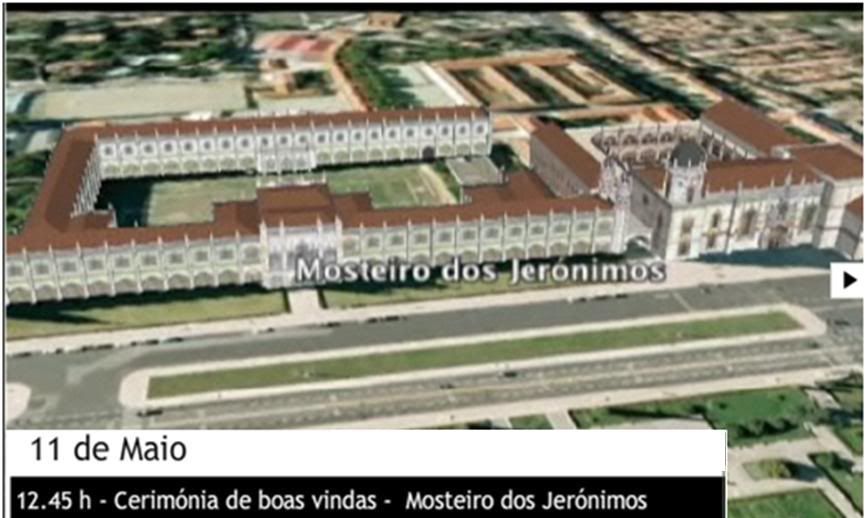
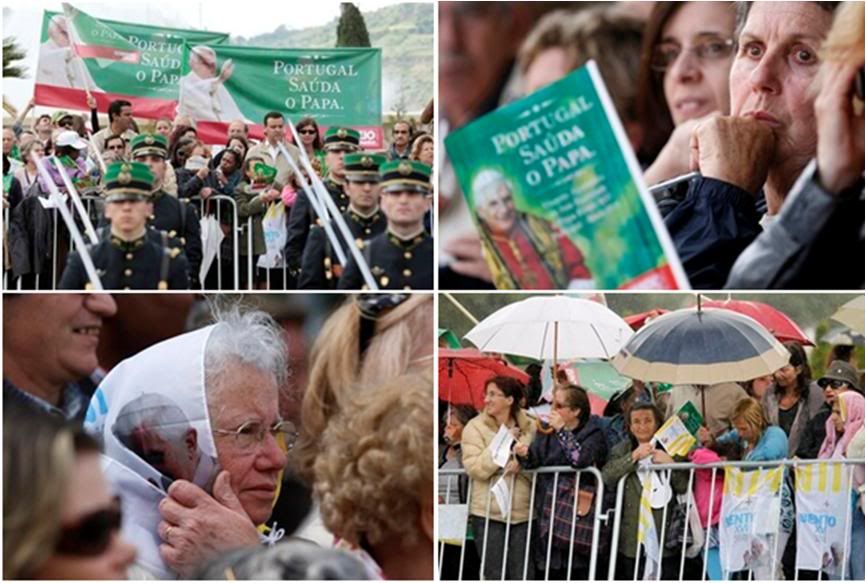
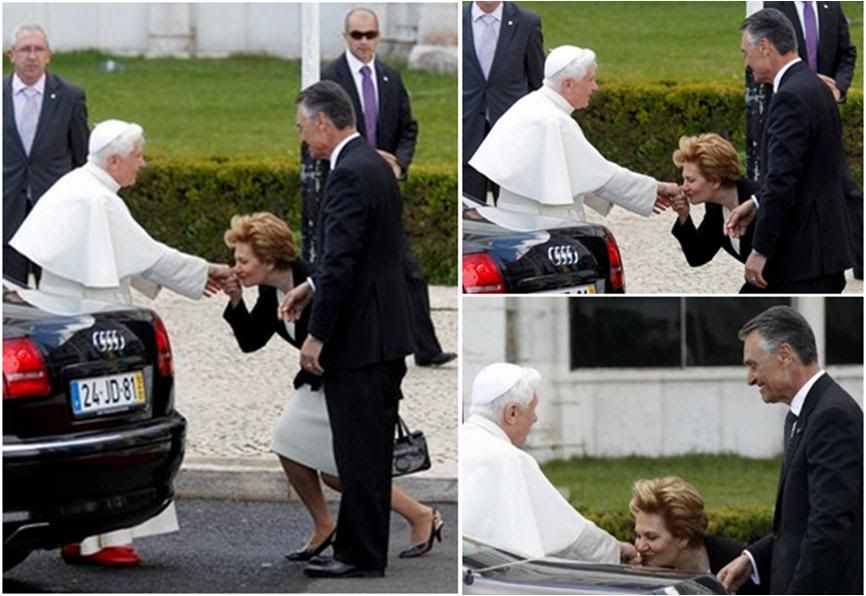
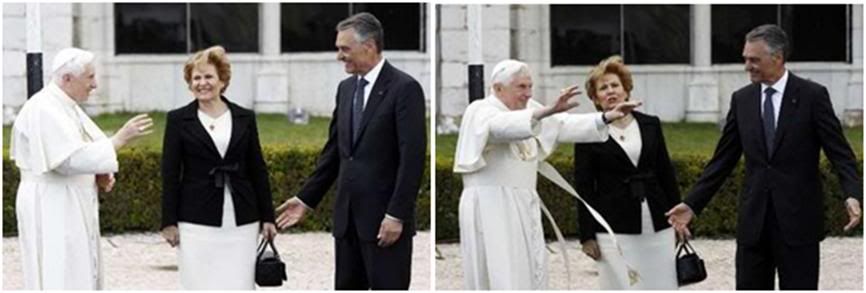
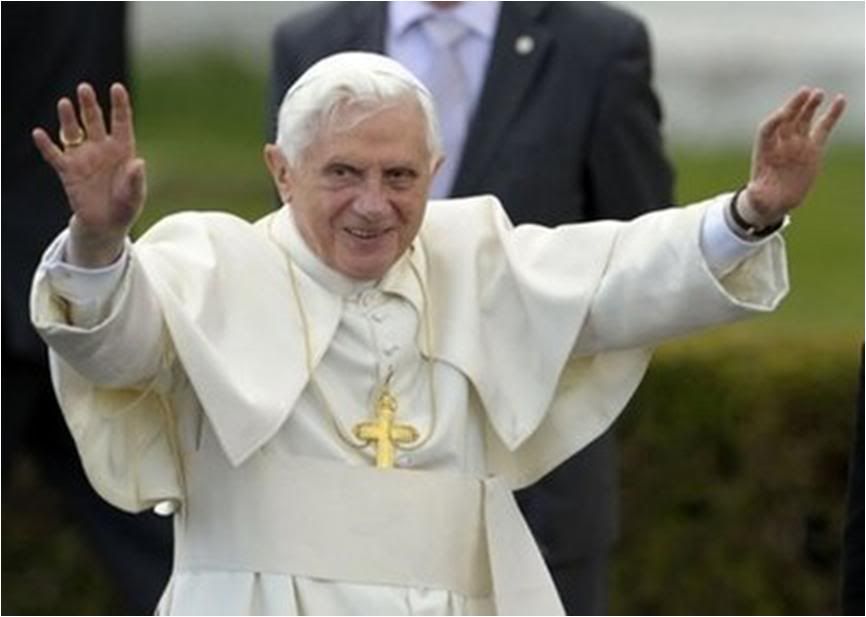
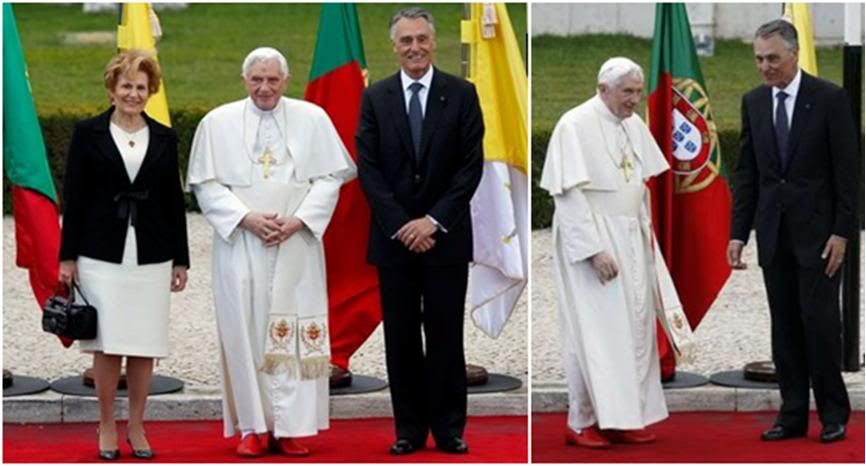
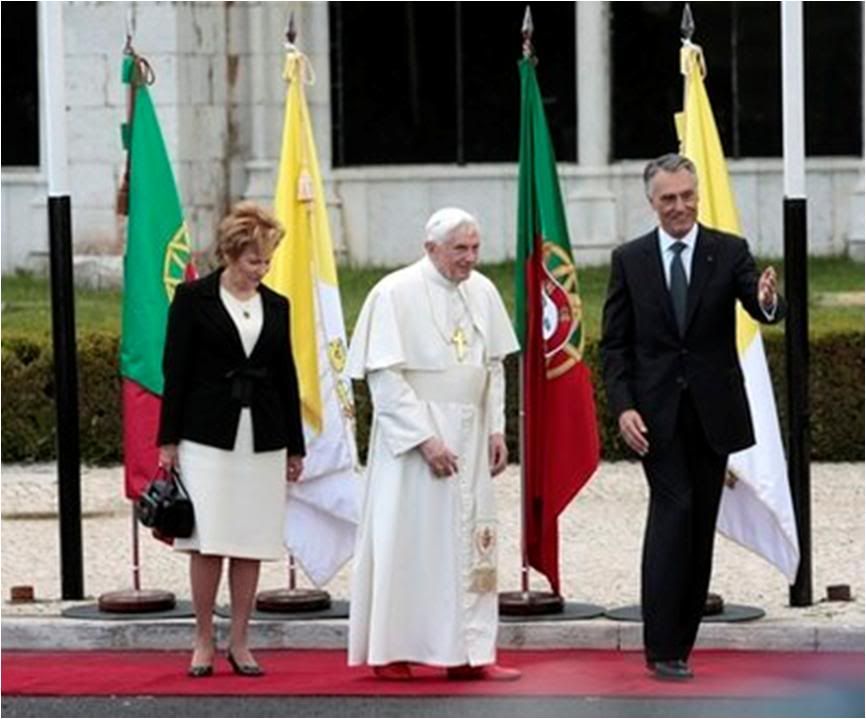
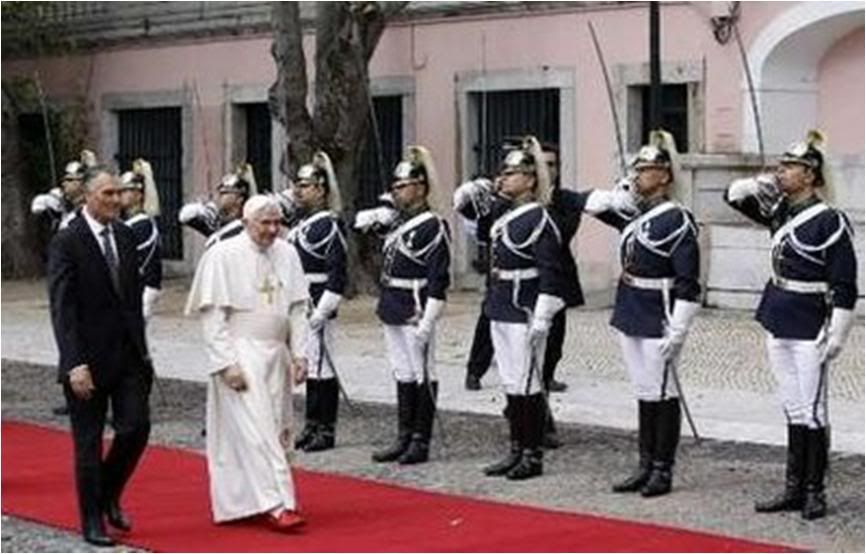
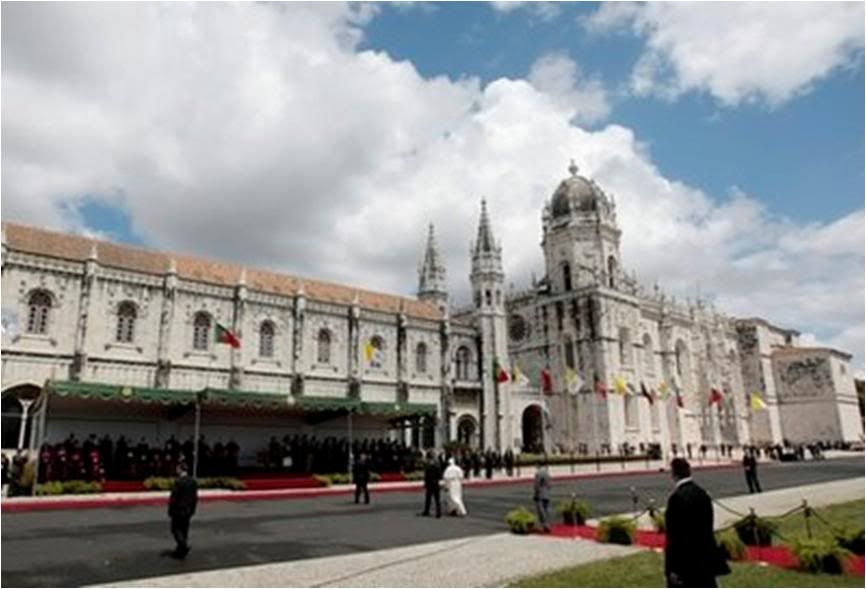
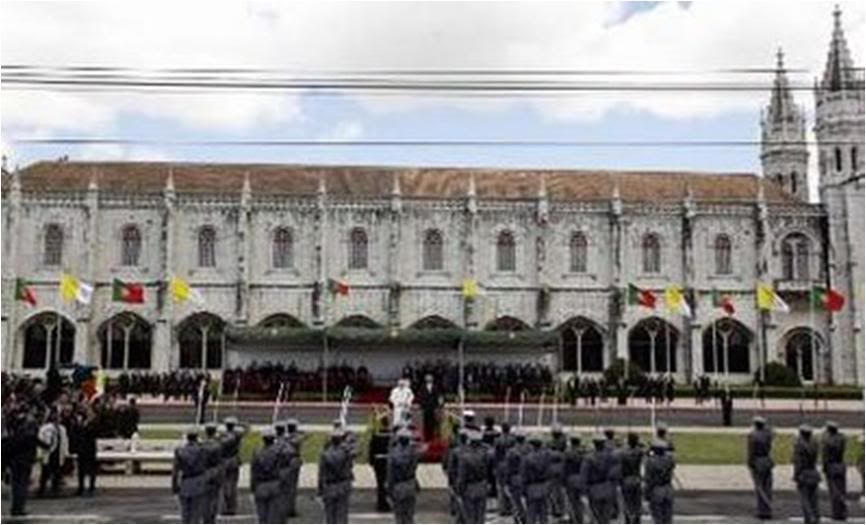
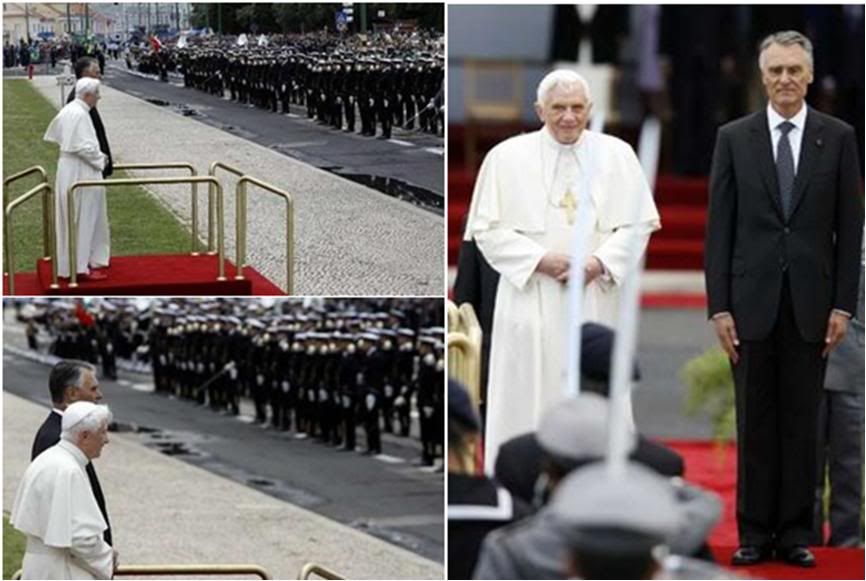
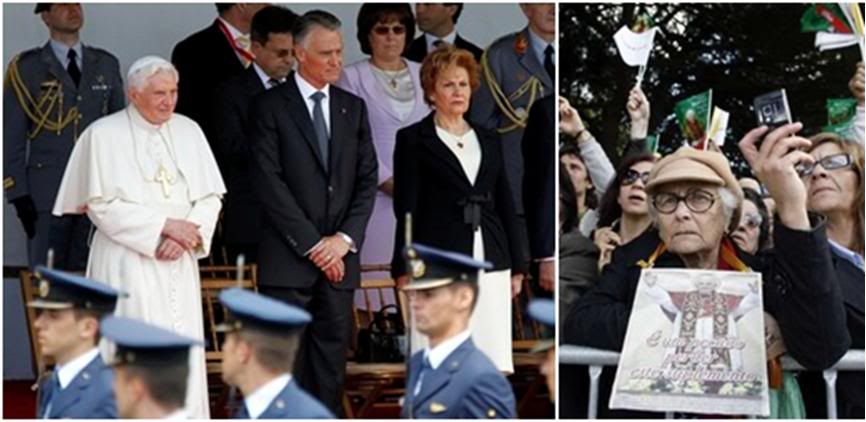
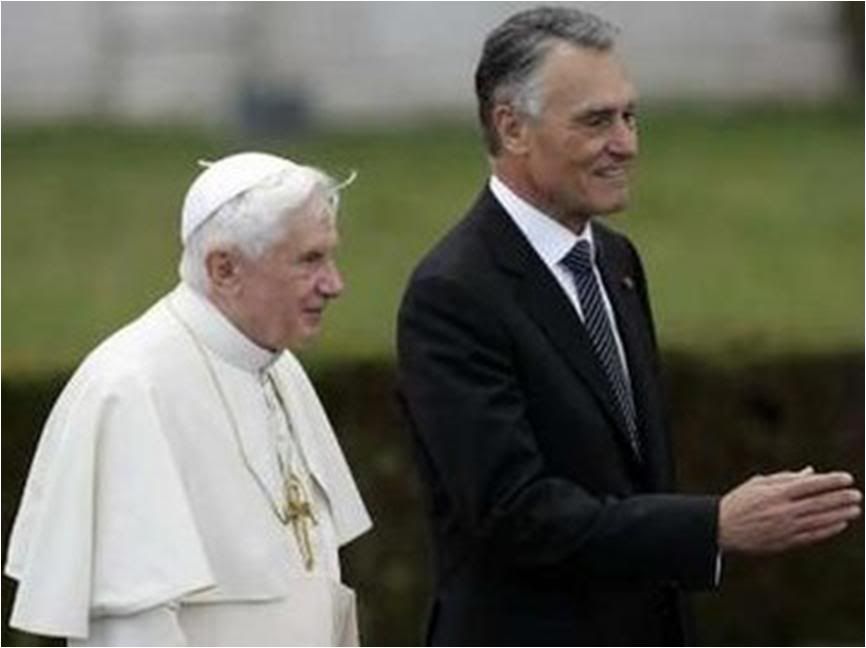
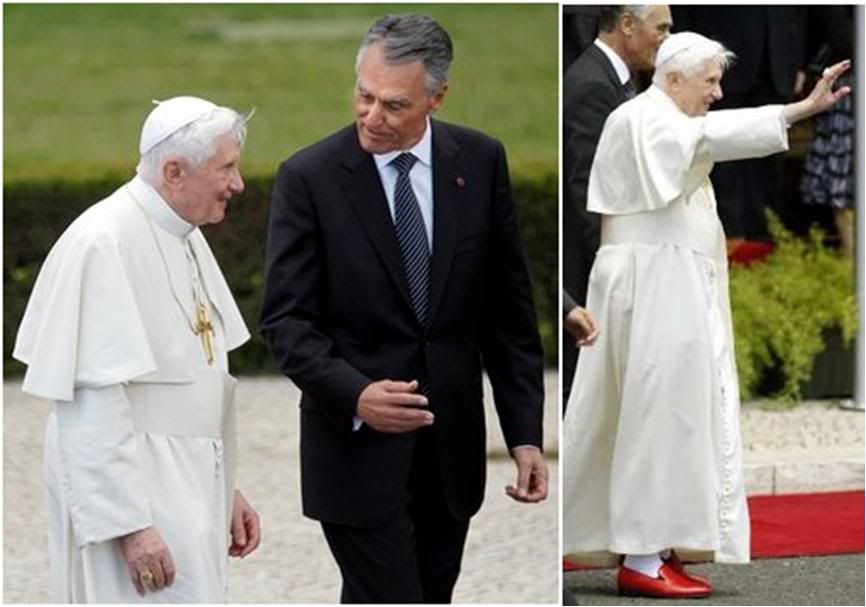
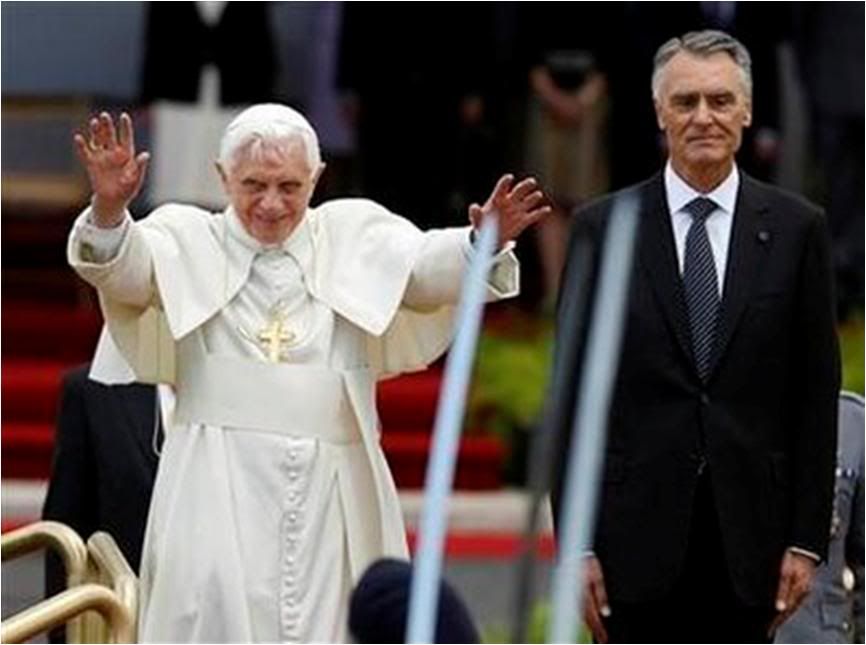
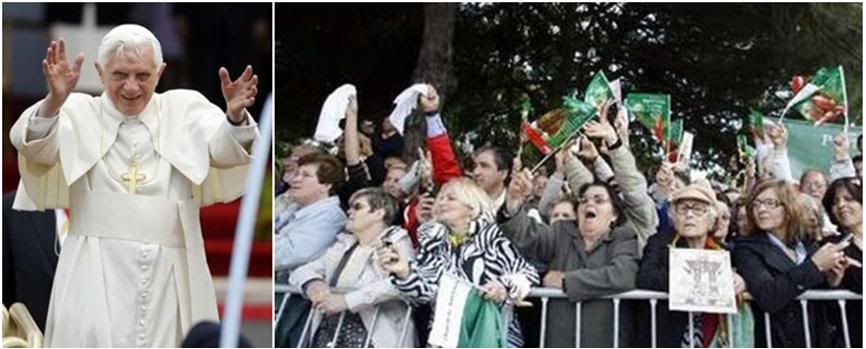
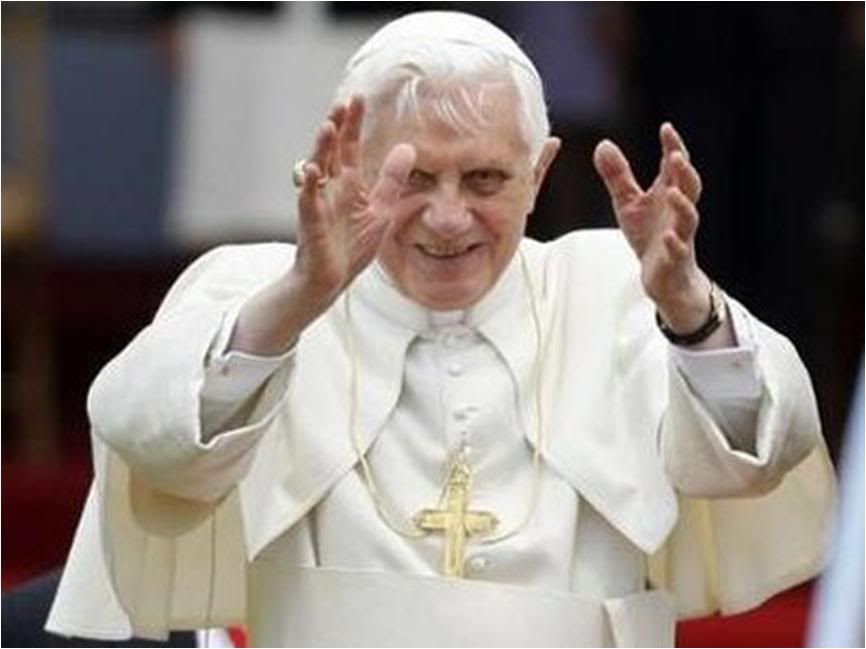
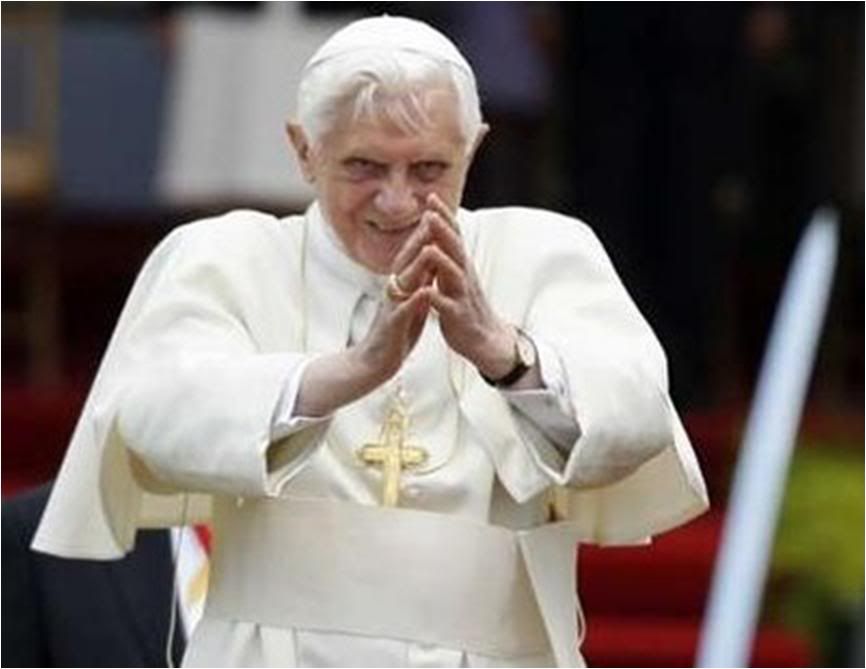
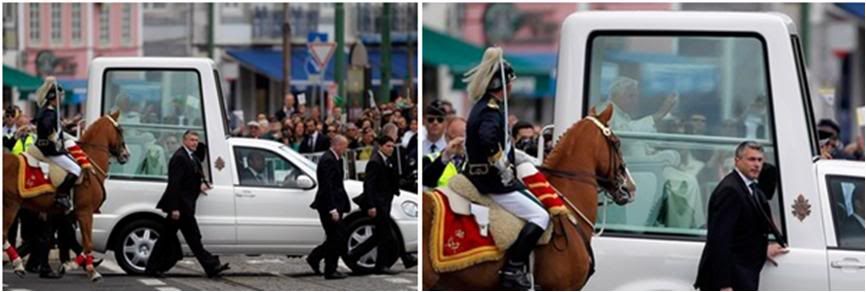
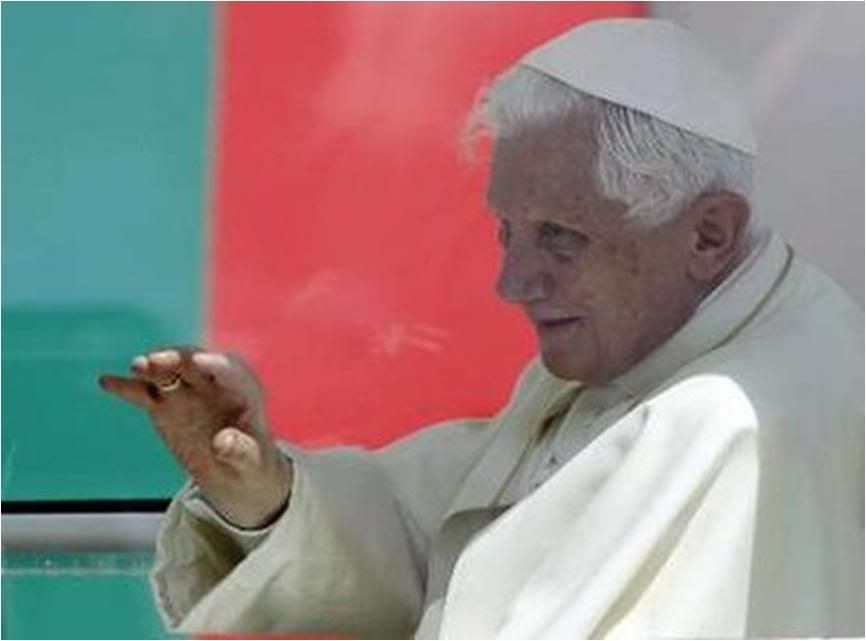
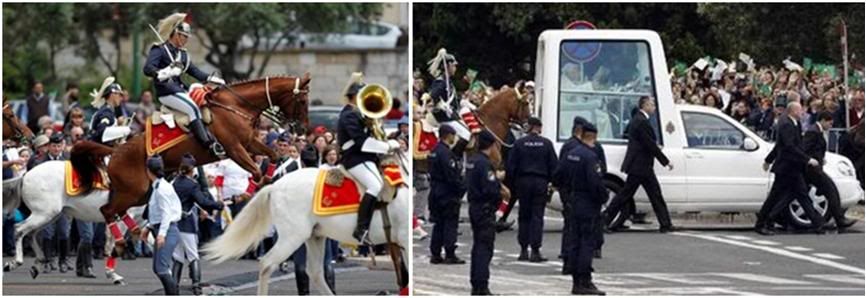
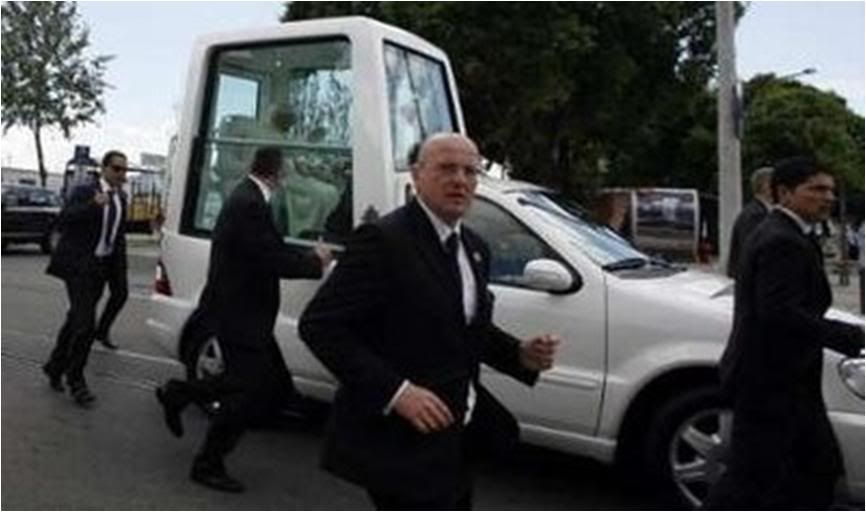 COURTESY CALL ON THE PRESIDENT
COURTESY CALL ON THE PRESIDENT
Palacio do Belem
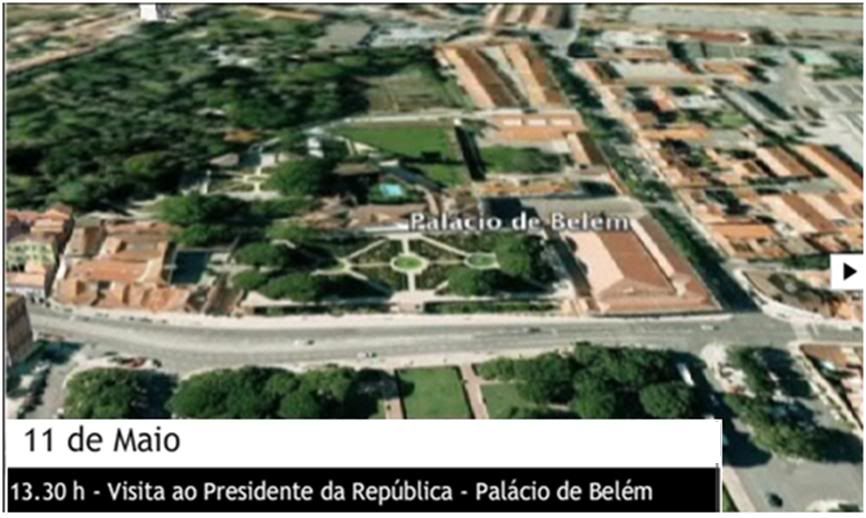
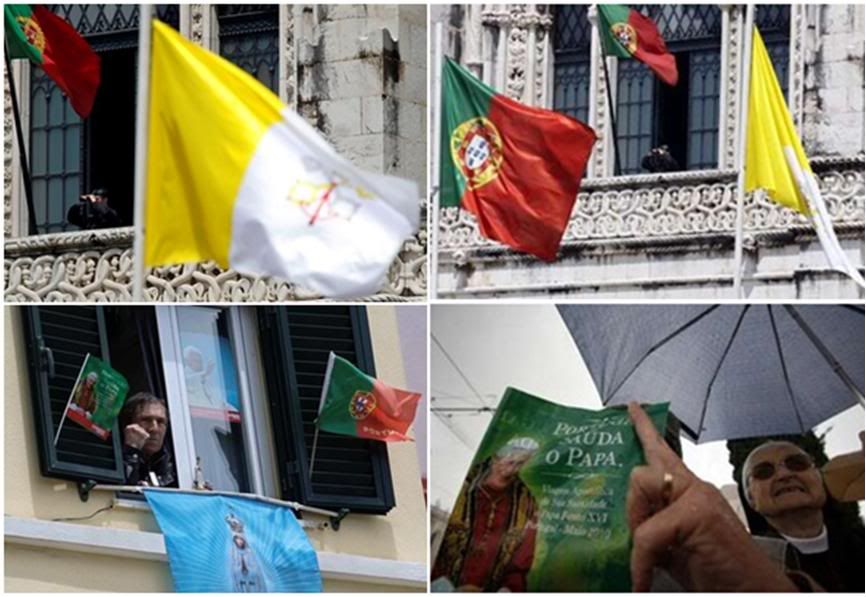
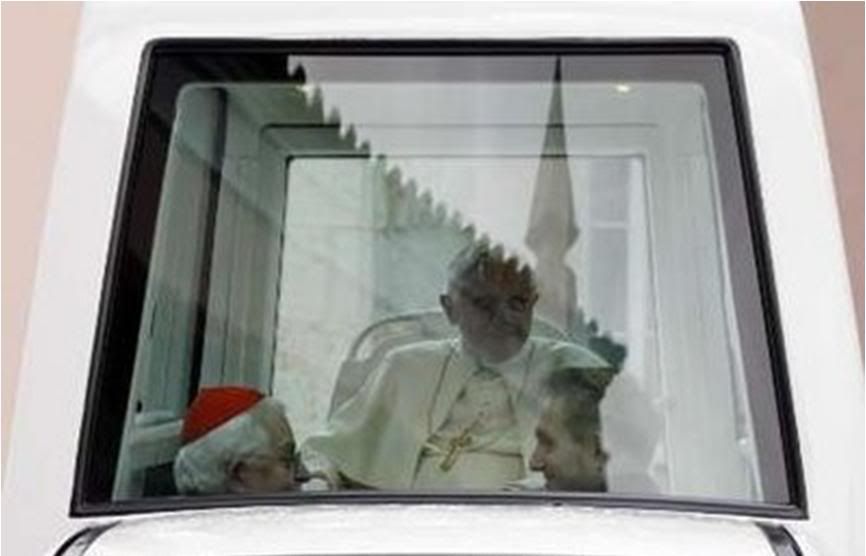
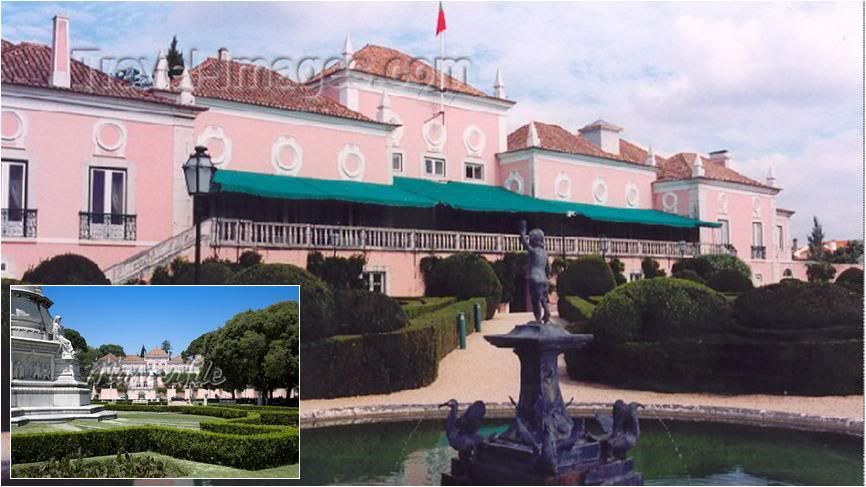
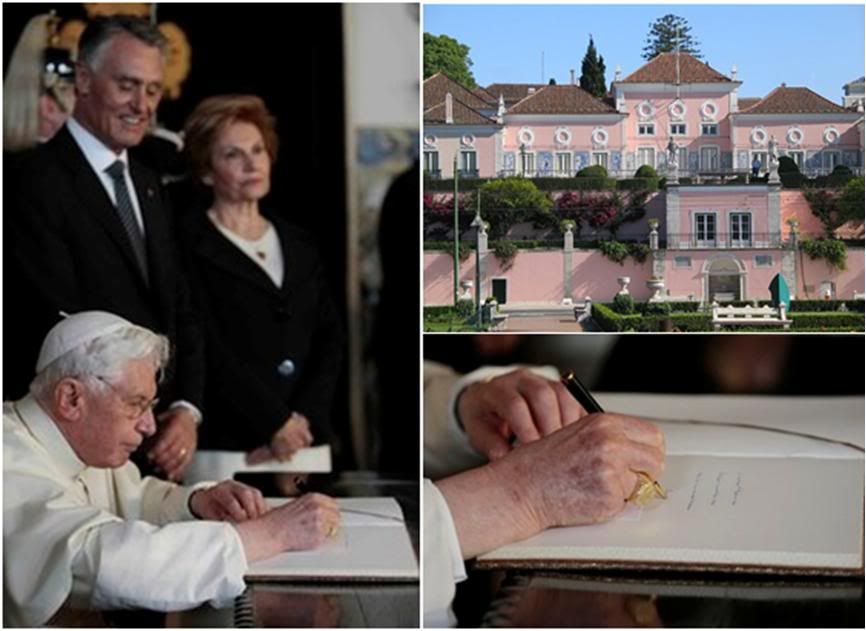
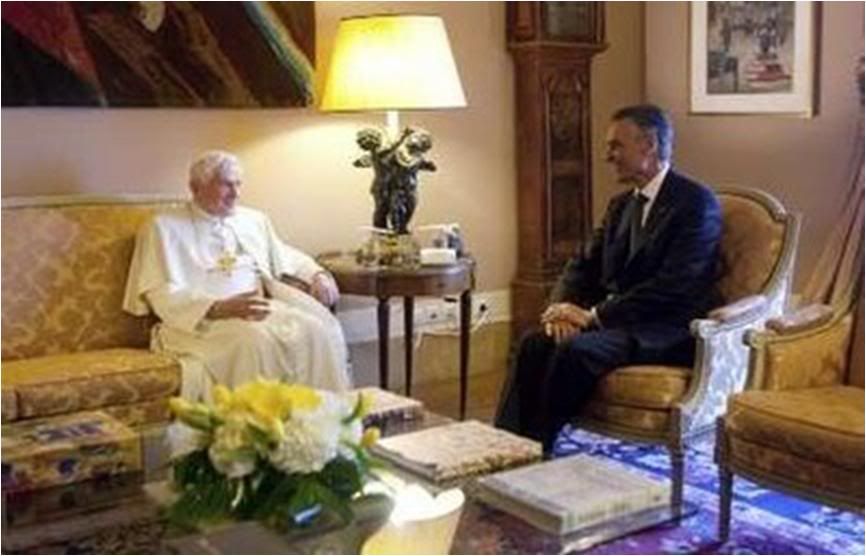
The Vatican webpages on the Portugal trip carry the text (in all the official languages) of brief remarks given by the Holy Father to the staff at the Presidential Palace (I think this is the first time this has happened during Benedict XVI's trips). It's a beautiful gesture for the staff, though I have not seen any pictures so far. Here is the text:
Dear Friends,
In the course of my visit to the President, I could not omit to visit and greet you who work here in the service of the high responsibilities of the Presidency of the Republic, taking care of this fine Palace and of the people who live here or are received here.
For my part, I express to you my sincere gratitude, wishing you every success in your respective duties. I assure you of a special remembrance in my prayers for each one of you and for your families.
May the good Lord in heaven bless you and strengthen you with his grace and his light, so that, through the consideration that you show to one another in your workplace and through your solicitude for the common good which you serve, you may foster in this centenary of the Portuguese Republic a more just society and a better future for all.
May the blessing of Almighty God, the Father, the Son and the Holy Spirit, come down upon all of you.
From the Palace, the Pope proceeded back to the Apostolic Nunciature for lunch and a brief rest before the late afternoon Mass in Lisbon's Terreiro do Paco.
From the VIS account of the day up to the visit to the Presisdential Palace:

May 11, 2010
... Having completed his address [at the airport], Benedict XVI went to the apostolic nunciature. At 12.30 p.m. he travelled nine kilometres by car to the Mosterio dos Jeronimos. The monastery was built between 1502 and 1580 over the hermitage of Santa Maria de Belem, donated by King Manuel I to the order of Hieronymites.
The building, which is currently used to welcome visiting heads of State, also has strong ties to the great Portuguese explorers and missionaries, whose exploits are recorded in the nearby Torre de Belem.
Since 1983 it has been a UNESCO World Heritage Site, and in
December, 2007, it hosted the European Union leaders who signed the Treaty of Lisbon that brought significant reforms to the EU>
Benedict XVI was received by President Cavaco Silva and his wife for the official welcome ceremony that included a military review.
Following the welcome ceremony, The Holy Father made a brief visit to the ancient church of Santa Maria de Belem where he prayed before the Blessed Sacrament then visited the cloister of the monastery.
At 1.15 p.m. the Holy Father took the popemobile to travel the 400 metres separating the monastery from the Palacio de Belem for the ofgficial courtesy call on the President of the REpuublic.
The Palace was also built in the sixteenth century and was the residence of Portuguese monarchs until the declaration of the republic in 1911, when it became the official residence of the President.
The Holy Father and President Cavaco Silva had a private meeting, after which the Pope signed the visitors' book and greeted members of the president's family. He also addressed some words to the staff who work in the palace. He then returned to the apostolic nunciature where he had lunch.
[Modificato da TERESA BENEDETTA 15/05/2010 03:09] |
| |
|
|
|
|